|
 Our brand is dystopia. Let's play Civilization: Beyond Earth - Rising Tide I like Civilization: Beyond Earth on the strength of its setting and ease of play. It tells a story of future positivity after a global catastrophe… or it can, anyway. After the Great Mistake -- never spelled out in the game, but hinted to be a mix of a nuclear exchange, rising sea levels and massive, global immigration to flee the first two things -- Earth’s remaining superpowers gather the resources and political will to send seedships out of the Solar system toward exoplanets. The ships, full of colonists in stasis pods, slow-boat through the void for hundreds of years, and end up on new worlds. The player tells the story of what the colonists make of those worlds. I’m playing Beyond Earth with the Rising Tide expansion. As of the start of 2016, the game has been patched into a pretty good place. A lot of people took a pass on Beyond Earth based on a buggy release, and because it still lies in the shadows cast by its older brothers, Civilization V and Alpha Centauri. I’ve never played Alpha Centauri, so let’s just get that out of the way. Rising Tide introduces a new diplomacy system, two new tilesets, more spice in the early game, the ability to settle on water, four new sponsors, a few new military units, quality of life improvements, and “hybrid affinity” skins for your basic troops, based on a blend of the game’s three dominant ideologies, Harmony, Purity and Supremacy. It also tries to lean in more heavily to the possibilities of a future sci-fi setting. The base game played it safe, sticking to the “hint at a bigger story than is ever expressed in the game” playbook. This is still true in Rising Tide, to an extent -- most of the best setting lore is sequestered in the in-game Civilopedia. But the new gameplay mechanics in Rising Tide are vectors for more setting lore, whether in artifact descriptions, or when faction leaders like Elodie from Franco-Iberia and Lena Ebner from INTEGR endlessly throw shade at each other. What to expect? This screenshot Let’s Play will touch on a lot of the new features. This will be a slice-of-life narrative story, taking inspiration from LPs such as A Scotsman in Egypt and Matul Remrit. This game makes me curious about the lives of the colonists and other nobodies on an alien world full of science hexagons and magical floating rocks. Some of the wonders and late-game techs take the setting into some weird places, and I’m curious about how that stuff would shake up a society. I’m playing a game as the American Reclamation Corporation -- I am American, so I feel pretty comfortable portraying a nightmare, end-stage capitalist megacorp. ARC specializes in espionage, and the new diplomacy mechanics offer ARC some advantages that border on ridiculous. We’ll touch down on a Small planet with the new Frigid tileset, on Soyuz difficulty (second from the hardest), with eight sponsors and scarce resources. I’m crowding sponsors on a small world because water colonies put nearly every hex on the map into play. On a Standard planet, I find there’s so much room, you never encounter border disputes. My goal is to advance the story every week, with some extra tidbits from the Civilopedia every now and again. For another look at Beyond Earth, Klingon w Bowl Cut made a screenshot LP earlier this year, before the expansion dropped. You can find it here: http://forums.somethingawful.com/showthread.php?threadid=3702313 Table of contents Part 1: Orientation Part 2: The Franchise Reboot Part 3: Market Saturation Part 4: We Regret The Error Part 5: Highly Effective People Under the hood: The tech web, virtues, and winning the game Part 6: Gone To Pursue Other Interests Part 7: Thinking Outside The Box Part 8: An Exciting New Career Opportunity Part 9: Thinkfluencers Snollygoster fucked around with this message at 15:20 on Feb 28, 2016 |
|
|
|

|
| # ¿ Apr 28, 2024 04:37 |
|
Part 1: Orientation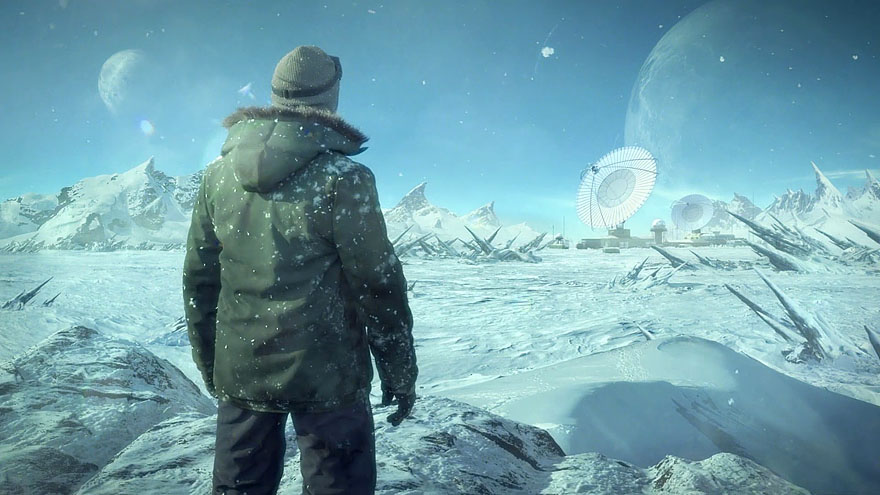 Alberto Zamora walked into frame as the shot panned over a frigid landscape. The camera settled on Zamora’s back, looming in front of Central’s comm station and under an alien sky. “A whole new planet, all for us,” Zamora said in his famous baritone. “Cold, unexplored. Dangerous, yes.” He turned. Zamora’s smile was a sideways tug on his craggy face. “This world won’t know what hit it.” “And, cut!” Zamora rubbed his face with gloved hands and blew out a breath. It had taken them an entire morning of takes to project the necessary bravado.The film crew, staring out at the landscape outside their settlement, wept at the sight of so much empty space, so much silence. A common reaction, they would soon learn. The colonists took to calling it “the outsides.” “That was good,” said Phan Phuong, smiling from behind her camera. “Very good. On message.” She paused. “You ready for the expedition tomorrow?” “No,” Zamora said. “Absolutely not. What will you be doing here, Phuong?” “Oh, you know. Sending out the daily bulletins, working shifts at Communications. Building habs.” She patted Zamora on the back, herding him back toward Central. “I hear Fielding wants an ARCadia store open for business in two months.” Zamora snorted. “That didn’t take long,” he said. “Yes, well. They’re going to need your help. You and the explorers get to go find stuff for the manufacturers. We’re going to run out of toothpaste eventually.” The actor shook his head. “I suppose you’re right. I heard the tectonic scanners picked up geothermal activity to the west?” 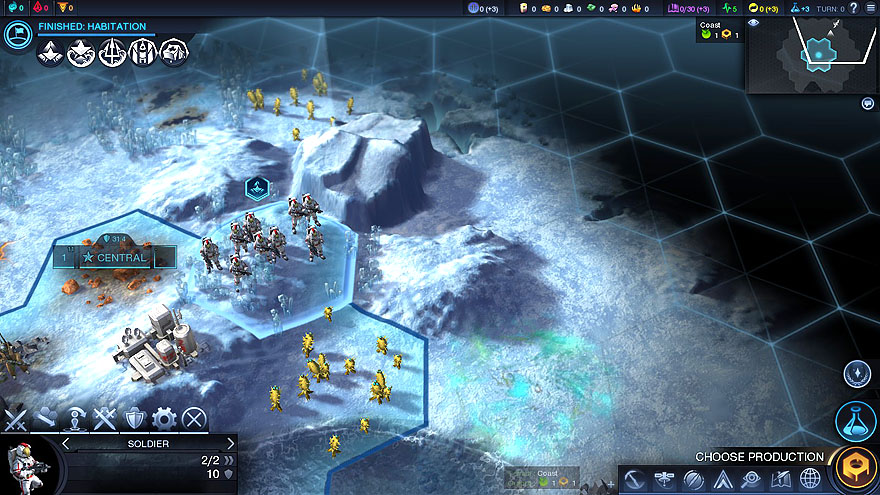 Phan smiled. “Yes, but I can tell you, your team is going east. We know there are titanium deposits that way. And a lot of plant matter under the frost.” “I hope they’re toothpaste plants,” Zamora said. Back at Central, they shared a meal -- veggie burgers and french fries over cups of water. It would be the last time they met face to face. Tectonic scanners let me see sources of geothermal, petroleum and titanium resources without needing the associated technologies to reveal them. --- “Central, Expedition-1,” Phan said, speaking into her headset. Communications, like most of Central, was a gunmetal closet rudely reassembled from the seedship that had brought the American Reclamation Corporation to Tau Ceti E. “Go ahead, Central,” came the response. “Status report?” Their mission had only begun, but Ex-1 had already discovered things on this planet to stir the blood:  On the land, sickle-shaped silhouettes that could only be living organisms, shuffling in the distance. Off the coast, they could make out minerals floating above the water, defying known physics. Phan grinned and watched the transcription software render their words to text. She hailed Expedition-2. “Status?” “We’ve discovered potatoes,” said Zamora. “Say again?” “Or beets. They’re definitely some kind of tuber. Bland, but Nelson ate one and didn’t die. I hope you like them, because you’re going to eat them for a while, I think. We’re headed due east.” 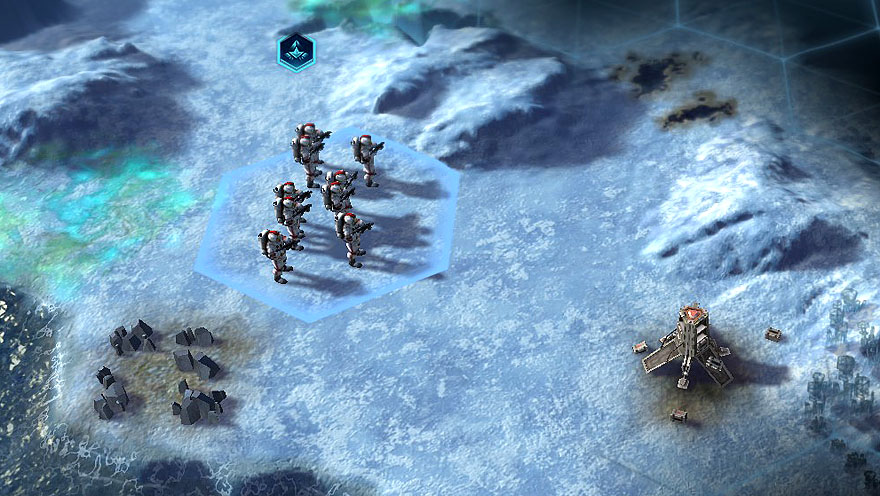 “We see an impact crater, a piece of metal. Maybe something that broke from the seedship on descent.” “That’s received, Ex-2,” Phan said. “Did you ever imagine it would be like this, Alberto?” Zamora laughed over the open channel. “Ah yes, my 13th season, where Sgt. Alvarez flies 12 light years on a seedship from Earth to find an alien potato.” “Received, Ex-2,” Phan said. Kilometers away, Zamora could hear her grin through the words. “Until next time. Yell if you need me.” --- It wasn’t a piece of the seedship. It was something else. The capsule bore the stamp of the American flag. Inside, Expeditionary-2 found a portable reactor and a sheaf of letters from Claude Thompson Elementary School in Virginia. Most of the soldiers, camped in their tents, read the big, loopy handwriting of children, committed to their memories the details of crayon drawings of seedships and smiling faces. The cold wind of Tau Ceti E could not quite muffle the sobs from some of those tents. Zamora crouched by the reactor, squinting instead at an included operating manual. His helmet lay at his feet. He was the only person in Expeditionary-2, and maybe the planet, to need reading glasses. He heard the crunch of footfalls on snow-covered earth. He looked up. “This is really something, huh, Mr. Zamora?” It was Nelson. He was filming again. “You know these children are dead by now, Eddie.” Zamora didn’t look up from the console on the reactor’s belly. “You don’t need to be a hardass,” Nelson said. “I’ve seen you crying too. It’s all right.” Zamora turned and drew himself upright. “I’m tired of crying, Nelson. I’m sick of mourning Old Earth. This is a second chance for us. I want to… I don’t know what.” Nelson paused. “Hey, Mr. Zamora. What were you going to do for the 13th season?” The actor-turned-explorer barked out a laugh. The question caught him off guard. “What? ARC cancelled ‘TAC 3.’ It had a good run. It’s done.” Nelson wrinkled his nose. “Come on, jefe. I had so many ideas for ‘American Badlands.’ But the corporation better-dealed me, just like you, so here I am.” “Here we are,” Zamora said. A reluctant smile tugged one corner of his lips. The capsule and its contents obliterated the day’s schedule. The simple letters drew out conversation, speculation. Nelson flitted around, taking candid footage of the members of Ex-2 talking to each other. Phan could edit it down to something usable, but this was very good. Very on message. When he didn’t film, he spoke with Zamora. CEO Fielding had said there would be no room for “playwrights or pedagogues” on her seedship. That was true. But she and the selection committee wanted a team that could inspire itself to continue through adversity -- and more importantly, create a narrative of ARC’s success. 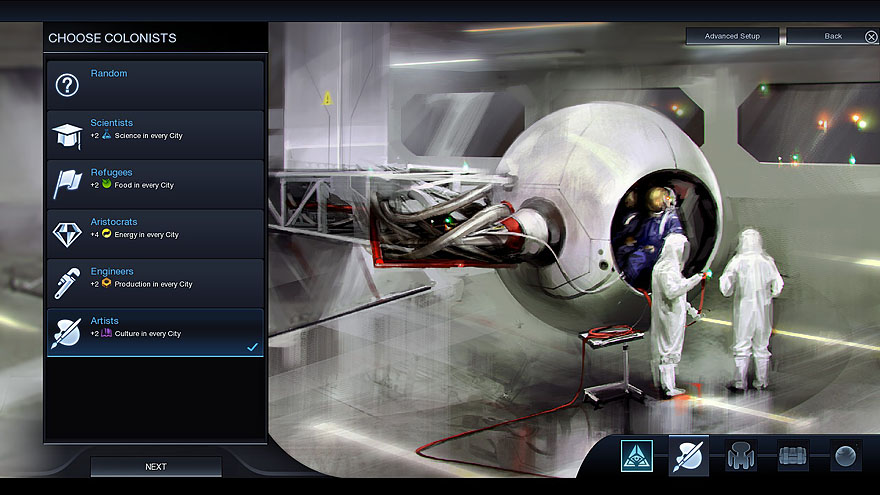 The corporation chose pop scientists and polymaths, men and women who built their brands by building that of ARC. The corporation chose actors, filmmakers and jowler ball players and cross-trained them in life sciences, survival skills, and marksmanship. Any deficits in the colonists’ competencies, the committee reasoned, could be balanced by the technology that accompanied them on the seedship. 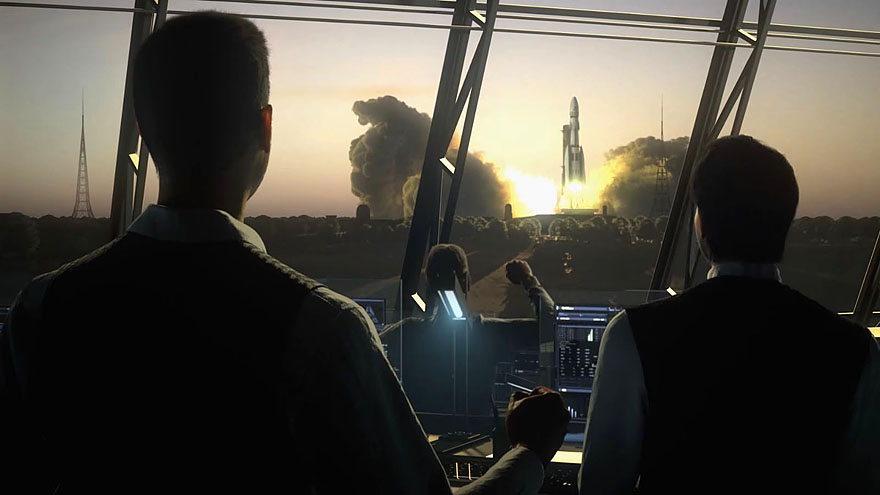 ARC built its ship with an embarrassment of riches. It had spared no expense. --- Phan’s shoulders and back were aflame. In addition to their core competencies, everyone in Central had to punch in another six hours of scut work - building habs, duct work, cleaning the food printers. It wasn’t just company policy, it was a matter of their continued survival. No one was exempt, though it helped morale to see Fielding herself out there with a hammer and welder. Phan made sure everyone in the colony knew one of the most powerful leaders from Old Earth toiled just as hard as everyone else. 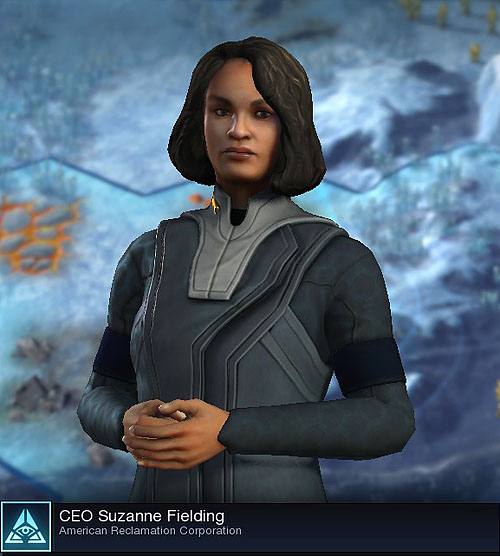 Old Earth. She heard Zamora use the phrase in Nelson’s footage. She liked it, and kept it in a final cut. It gratified her to hear the phrase stick in Central’s vocabulary. It certainly fit. ARC wasn’t telling anyone the calendar date, but even traveling in excess of 14,000 kilometers per second, allowing for acceleration and deceleration… they were at least two centuries out of step with time. Phan thought about Expedition-2’s discovery. Central’s engineers loved the windfall of the reactor, but the letters filled the colony with wonder. A retrieval team brought the letters to Central and laminated them for safekeeping. They were already being called relics of Old Earth. Phan tracked back and forth through the latest feeds from Expedition-1. They had uncovered minerals and natural phenomena that defied easy classification. To their east, they found another capsule from Old Earth. To their west, the ribcage of some ancient, long-dead alien rose from the ground like the vaulted sanctuary of a bombed-out cathedral. The team leaders chose to move east and recover the capsule first. 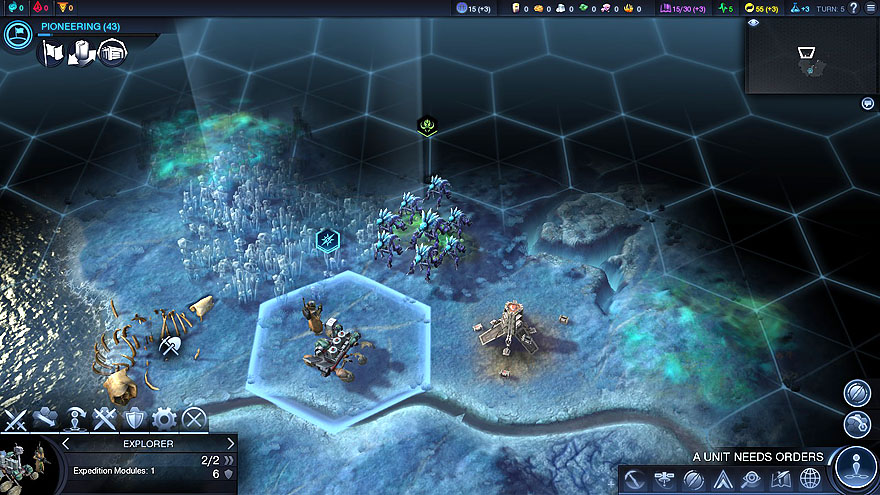 Any unit can pick up capsules, but only explorers can perform expeditions on sites like animal skeletons or derelict settlements. Doing so can net you affinity points, the thing that wins the game. Expeditions can also give boosts to nearby colonies, grant you free units, and -- new to Rising Tide -- yield artifacts, which we’ll see soon. As they moved, a pack of animals shadowed them, always at night. Ex-1 called them “wolf beetles.” Phan had studied low-light footage of the things. It was an apt name. She -- “Expedition-2, Central.” Zamora’s voice came sharp through her headset. Phan sat up. “This is Central.” “Something’s falling from the sky.” Central’s sensors looked out and down, not up. Without satellite capability, the extent of their meteorological data came from opening a hatch and peeking at the sky. Zamora rattled off coordinates, and Phan adjusted the angles on the colony’s external cameras. She hunted for the right screen -- 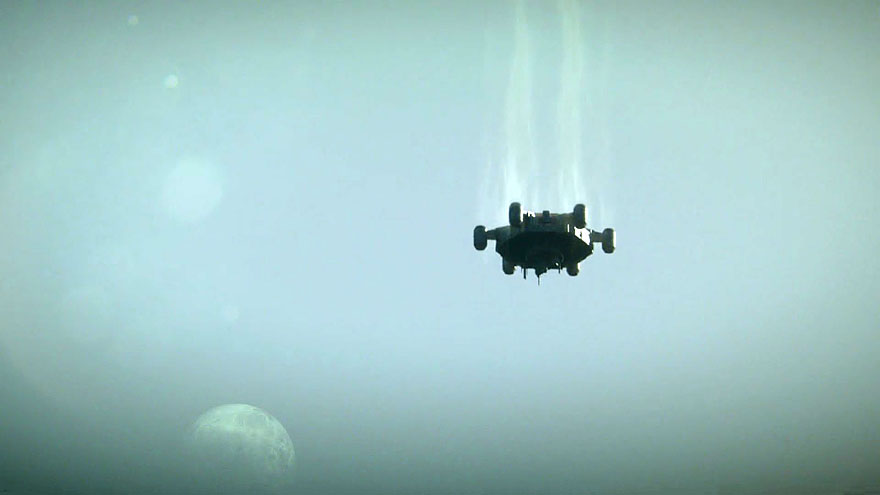 -- there. “Another capsule?” Zamora said. “Negative, Ex-2,” Phan said. “This is much too large.” The camera tracked the object’s descent as best it could. Phan was absolutely certain she saw retro-rockets fire.  “Ex-2, we’re not alone on this planet any more. That thing is landing northeast of your position. Go there and find what it is.” “That’s received,” Zamora said. --- The mood had changed in Expedition-2. In the weeks that followed, all talk of past careers and future side-hustles had dwindled. Here is what they knew: the thing they saw was a seedship, though they couldn’t tell which. It had touched down on the same landmass as Central. And Ex-2 were relieved to have brought guns with them. 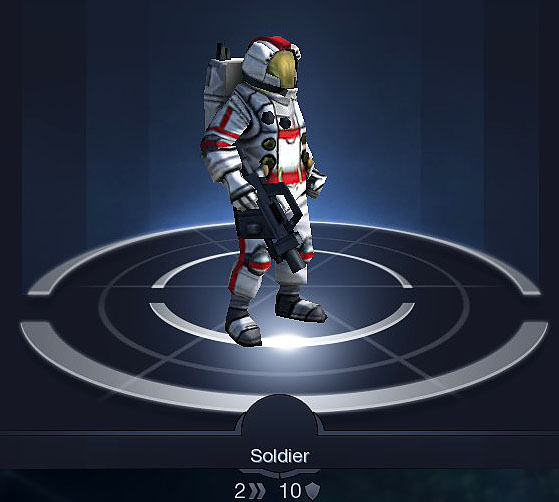 I chose Weapon Arsenal, which lets me start with a free Soldier unit. I’m using them as a second explorer unit to reveal the map and gobble up all the Artifacts I can find. It took time for Central’s engineers to load a team with survey equipment. But ARC had brought a stockpile of weapons with them. Ex-2 couldn’t do on-site lab work or analyze the treasures of a new world, but they could, by God, put a 5.56 round between E.T.’s eyes, if it came to it. They - Nelson raised a hand. The explorers stopped. “Up there,” he said, pointing. The others looked and saw the silhouette of a vehicle cresting a hill, wreathed in swirling snow. Zamora and the rest of Ex-2 smacked magazines into place, worked charging handles. “They’ve got us dead to rights,” Zamora said. “Eddie, what do you see?” Nelson lifted his camera. Zamora was right. He could see the profile of a mounted gun on the unlovely, skeletal frame of a rover. The wind calmed long enough to pick out an insignia on the side: a four-pointed star and laurels. “Well,” Nelson said. “Well what?” Zamora said. “That’s interesting.” Seconds passed. Ex-2 kept their guns pointed at the ground. The rover loomed on the hilltop. Then its engine growled, the snow tires squelched, and the rover slipped from view. “Mr. Zamora, you’re going to want to send this to Central.” --- “Expeditionary-2, Central.” “Stand by, Ex-2,” Phan said. She had put a call to Fielding, only to find out the CEO was already on her way. “Ay, mierda,” Phan said. She stood up, then sat back down, not sure what to do with this sudden burst of nervous energy. “Central, the Slavic Federation is here. We just saw their insignia on-” “Ex-2, I know they’re here.” “What?” “And it’s not just the Federation. They brought the Cosmonaut with them.” “Central, how do you know?” “Because he just hailed us,” Phan said. 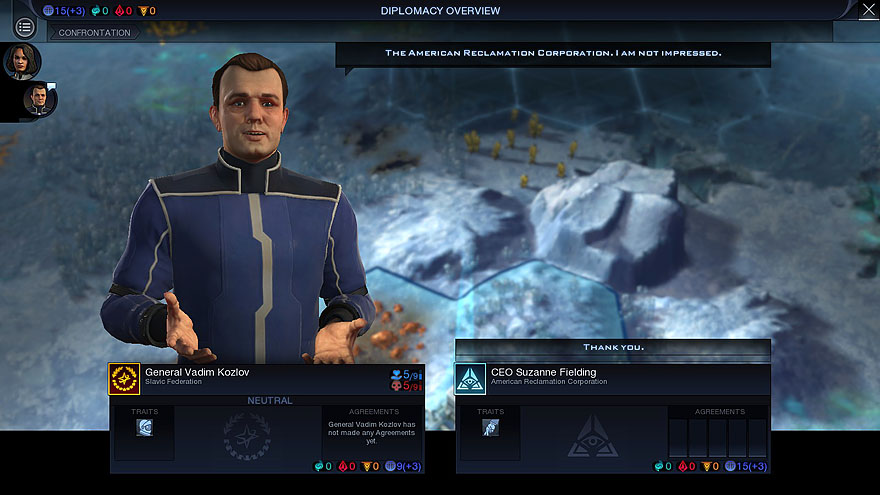
Snollygoster fucked around with this message at 03:55 on Jan 2, 2016 |
|
|
|
Samovar posted:I was tempted to pick this up in the Xmas sales, but even with discounts its about £20+. It'll be interesting to see how this game works, esp. Since I saw a lot of people didn't like it. For my part, I came to this game after logging 400+ hours in Sword of the Stars 1, another 4X that trades on the strength of its setting. Beyond Earth is shy about it setting! It hides a lot of info in places you aren't incentivized to see. But I'll take that over having to divine a game's setting by scouring a fan wiki and "word of God" author posts strewn around forums. I also bought the base game in 2015, so I missed out on its rocky launch. I feel like Beyond Earth is good, still a work in progress, and I really hope 2K gives the all-clear for a second expansion to the game.
|
|
|
|
Part 2: The Franchise Reboot “So how did Ms. Fielding take it?” Dr. Prickett sounded out of breath over the radio. Ex-1 must have finished some serious work. “She wasn’t happy,” Phan said. “Can you blame her? Now we’ve got to share…” Prickett paused to gulp down a breath. “...the planet with the Space Patriarchy.” Phan snorted. “That’s received, Ex-1. The boss lady told Ex-2 to map a path to the Federation’s settlement. We need to know what they’re up to.” The Communications bulkheads shifted from the wind outside. Phan hoped the squall outside wouldn’t blow away any of their sensor equipment. The storm blew northwest, and would overtake Ex-1 in a few hours. Phan heard nothing in response. “Ex-1, your status?” “I thought you’d never ask, Central,” Prickett said. “We just popped the capsule. This one’s from INTEGR, so I’m afraid I don’t have any care packages for little children for you. But I think I can do you one better.” Phan waited and ground her teeth. She had no patience for Prickett’s need for dramatic effect. “Spill it, Ex-1,” Phan said.  “How about a solar collector satellite and a particle accelerator?” Pickett drew out the words like a game show host. Phan let out a low whistle, then keyed up for her response. “On message, girl,” Phan said. “Obviously. There’s even fuel for launch. Think of all the stuff we can piggyback onto this satellite.” “Received, Ex-1,” Phan said. “We’ll send out a retrieval team as soon as the weather lets up.” “Send a linguist with the team. There are instructions here and my German isn’t so great.” “Received,” Phan said. She wondered what had become of Franco-Iberia’s technocratic rivals. Before climbing into a stasis pod, Phan Phuong soaked in news of Old Earth’s superpowers and the great movement of the Seeding. By the day of ARC’s launch, Brasilia was already well on its way toward the Kuiper belt. And it was plain to see the Slavic Federation succeeded. But who else? Artifacts are new in Rising Tide. We can cash them in immediately to goose our production, culture or science gains for a turn… or we can collect a set of three and exchange them for a semi-random bonus or unlockable building for our cities. Some of the reward buildings you can receive from artifacts are incredible. --- For weeks, the Slavic Federation’s rovers shadowed Ex-2. The ARC team hiked with their rifles loaded, but made no hostile moves. Once, the explorers tried to radio the rover crews. “Cause no trouble,” came the response. Zamora and the others grew paranoid over checking the seals of their suits. Expedition-1 would perform studies on the green gas that seemed to breathe from the planet’s surface, but Expedition-2 would become familiar with its effects on the human body. A sudden wind storm raked sheets of the miasma over their campsite before they could seal up. A wet cough plagued many of them afterward. 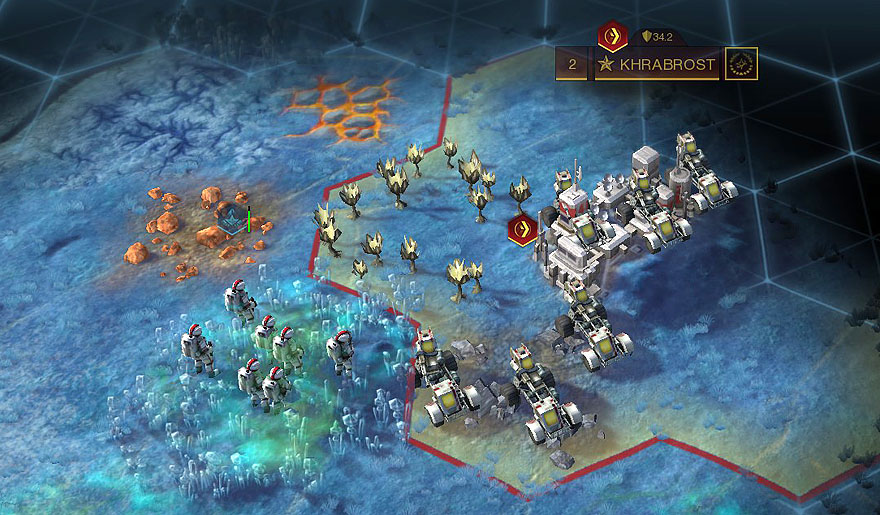 When they reached the edge of the territory staked out by the Slavic Federation, men and women in arctic gear and ushankas greeted them with soup and extra rations - and sent them away. The sealed rations came as a welcome reprieve from recycled water and alien tubers. Meat tasted unfamiliar and strange to American palates, either from the soup or from the oversized beetles the team shot and killed to supplement their diet. Even so, the explorers could not stay. “Orders from the top,” they had said. “We are sorry.” “Not sorry enough by half,” Zamora muttered later. He looked up to see Nelson filming the Federation colony, which they called Khrabrost, or “bravery.” Federation engineers had the aesthetic sense of a bucket of bricks, but the lights and heat vents in the nearby colony were one of the most beautiful things he had seen in a few months. Nelson lowered his camera. “Mr. Zamora, can I bounce an idea off of you?” Zamora raised his eyebrows. Nelson sat across from him. “Phan said Central launched their satellite and set up a rectenna.” 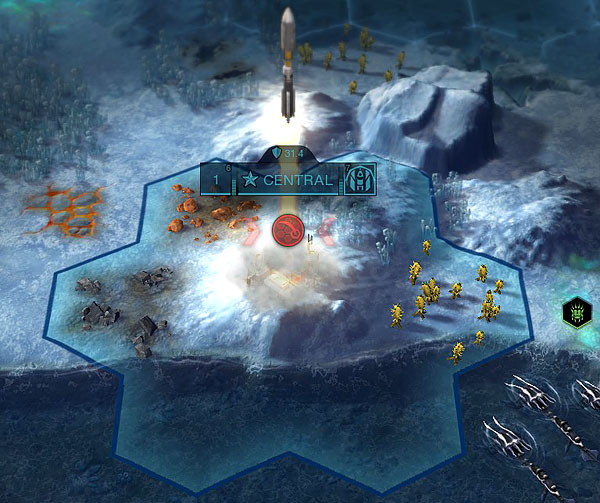  The solar collector will stay in orbit over Central for several turns, giving extra energy to the colony. Energy functions as currency in this game. It all works, and this week they’re going to test the piggybacked communications and meteorological suites. If those work too, do you uh. You want to film something?” Zamora paused, then poured the rest of his soup back into a canister for later. “Something like what, Eddie?” Nelson grinned. “I mean… look, we’ve got Guillaume effing Maazel on this team. You can’t tell me he doesn’t want to do a wildlife doc on all the bug lizards. This place is beautiful.” Zamora smiled. “Yeah? That’s not terrible. I could do some voice over work. Maazel sounds like a rusty hinge.” “That’s not all you could do, Mr. Zamora,” Nelson said. Zamora squinted at him. Nelson clapped his hand on Zamora’s shoulder. “TAC 3, jefe.” Zamora blinked, then laughed. “What, I just… Sgt. Alvarez does police work on the frozen potato planet? You can’t do a procedural out in the middle of nowhere, cabron.” Nelson grinned. “Can’t? You mean someone’s tried it already? Focus group didn’t like it?” “It’s asinine. A Maazel wildlife documentary? That’s a good idea. A police drama is not a good idea. Come on, how did Alvarez get here?” “Picked for the Seeding,” Nelson said. “We can say you saved Fielding’s life. Or she wants a law man with proven character to take to a new world. Do you think there’s never going to be crime here?” “It’s a stupid idea,” Zamora said quietly. “No doubt. Let’s head west and think of some more stupid ideas.” --- By the end of the day, Expedition-2 saw the shadow of a mountain range to their west. By the end of the week, they realized the angles of the mountains were too deliberate to be the product of natural processes. A few days later, the weather cleared, and they first saw the wonder.  ...should survive the planet’s intense heat. Radio interference at the site suggests the device may be communicating with something nearby. “Expedition-2, Central,” Nelson said. “Are you seeing this?”  Welcome to our planetary marvel! Each possible biome gets a planetary marvel. They’re mechanically identical: every civilization gets a quest to activate several related structures scattered over the planet. Whoever fulfills the quest first gets a bonus. Some marvels give very hefty advantages. Others are curiosities at best. --- Dr. Prickett’s face filled Phan’s monitor -- eyes blue under scuffed goggles, dirty blond hair stuffed under a cap. She backed away to let the recorder’s lens refocus. “I’m Dr. Penelope Prickett, and this is ‘Burn the Planet.’” Somewhere off screen, a man’s voice counted from five. The countdown ended and Prickett flipped a switch on a console. The camera’s point of view flicked to what appeared to be the outsized corpse of an alien beetle the size of a dog. Phan had a split second to contemplate this before the Near Lightspeed Accelerator’s particle beam hammered into the scarab and popped it like a balloon. “Yeah!” Prickett shouted, off-screen. “Dada dum, dada doo, dada dum… uh, Phuong, please put my old opener theme here. Dada doo…” Phan would do no such thing. She didn’t have time to edit Prickett’s footage to a professional standard of quality. There was simply too much new information to process. Night and day, the satellite and Ex-2 sent in images and spectroscopic readings of the mountain-sized machine. Brief, encrypted transmissions bounced between Central and Khrabrost as Fielding and Kozlov spoke to each other, leader to leader. She let Prickett’s performance run while she drafted reports and messages of the day for the coming week. She had to admit, part of her enjoyed hearing Prickett do her act again. Phan remembered lying in bed after work, watching videos of Prickett teach physics lessons through detonating disused lengths of pipeline or beating old police robots into scrap with a jowler bat. Phan chewed on the callused skin of her left palm. There was always more to build, more to do. Extrasolar intelligence was not news. Kozlov, the great overachiever, had discovered evidence of “Progenitor” structures hidden in the Solar system’s asteroid belt a few decades (centuries) ago. But this thing, this colossal drill or whatever it was, existed on a revelatory scale. People could go to the device and see it with their own eyes. Which was precisely what Ex-2 had been doing in the ensuing weeks. Nestled at the foot of the great machine, Ex-2 had found Progenitor ruins -- ground to rubble by centuries of storms, but irrefutable evidence of… something. 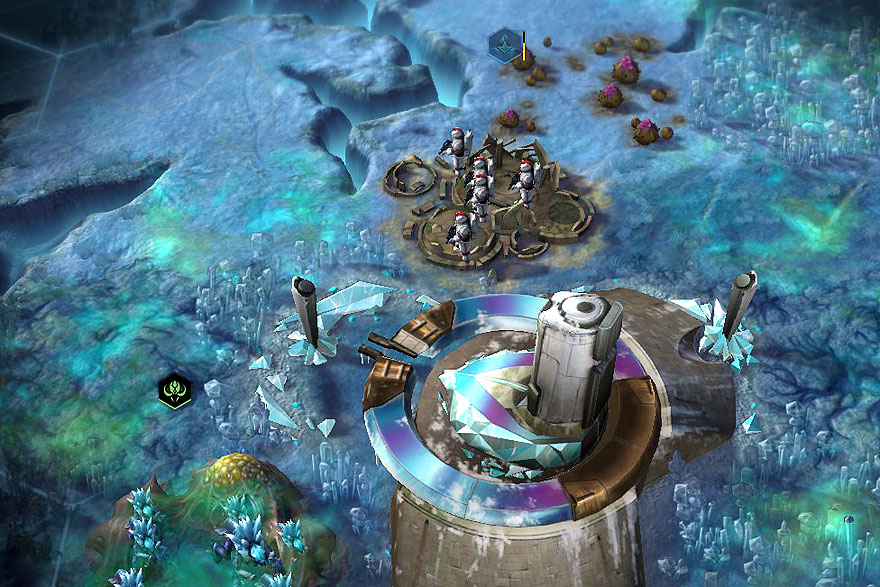 The lumpy thing southwest of the planetary marvel is an alien nest. It will continuously spawn aliens unless it is destroyed. Ex-2 were to leave the ruins untouched, per orders straight from the CEO. Neither she nor the ARC science team wanted to see one of the most momentous discoveries in their lifetimes ruined by a pack of fameballs with rifles. Once Ex-1 had finished studying the skeletal remains near the western coast, they were to return to Central for another rover-load of survey equipment, then swing around east, north and west to study the ruins and the machine above them. They -- The console speakers wailed out a thunderous tone, a sound like a gong or a great, low horn. Phan nearly fell out of her chair in shock. She could hear Dr. Prickett’s excited yelling, and a commotion from the rest of the expedition team. “Whoa, whoa! The bones resonate with the energy from the beam! Hey. Hey. Phan, cut this part until we know what we’re dealing with, OK?” It was a recording, not a live feed, but Phan was inclined to agree. This was between Ex-1, Phan and Fielding until the scientists figured out what they had… or if it was anything but another curiosity on an alien planet. “This is so on message. I told you the NLA was more useful to me out here than back home in a sardine can.” “Yeah, yeah,” Phan said to herself, then her headset clicked to life. “Expedition-2, Central, we have a problem.” Zamora’s voice. “Go ahead, Ex-2,” Phan said. “Maazel went out to a miasma storm to find some wildlife to film, and he stirred up a horde of wolf beetles.” “How big a horde, Ex-2?” “Central, can you get eyes on us?” Phan typed on her console. Kilometers above, the cameras on the solar collector satellite made a fractional change in angle and focus. 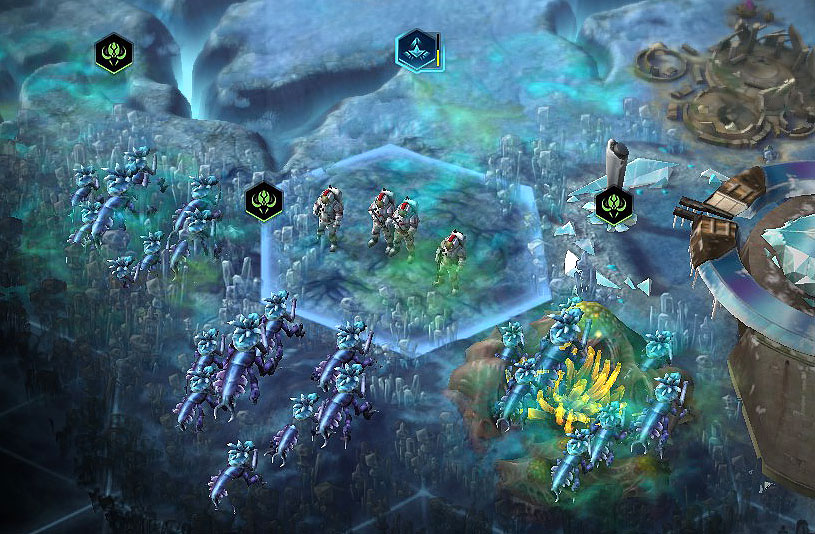 “Oh, gently caress,” Phan said. OK, listen to me, we’re going to get you out safe -- --- Hundreds of kilometers away, another seedship landing module lighted on the surface of Tau Ceti E. No one at Central noticed. Snollygoster fucked around with this message at 02:52 on Jan 13, 2016 |
|
|
|
Cythereal posted:You can pick them up regardless. It's actually kind of hard not to end up with 5 or so levels in every affinity and most affinity units regardless of which one you're going for. Like Cythereal said, Rising Tide is a lot more generous with affinity points than the base game. Going hybrid can give your mid-game military strength a big push. It helps a lot if you're going for a domination victory or you need a rival sponsor to back off from war posturing.
|
|
|
|
Part 3: Market Saturation “Give me an A! Give me an R! Give me a C!” “Give me an Adia!” “What’s that spell? ARCadia! Who’s number one? The customer!” Martin Ballarin belted out the morning cheer alone in a supply closet, his nose half a foot away from a bulkhead stamped with caution symbols. He did this every morning before moving out to set up Tau Ceti E’s first and only ARCadia store, which had the footprint and approximate look of a hot dog stand. Ballarin’s morning ARCadia store cheer could turn saints into cynics. But now, on the far side of a 12 light-year journey, Ballarin drew sincere comfort from the ritual. IIt helped, a little, to remember where he came from. So he yelled the morning cheer every day and walked out to set up the ARCadia kiosk. He had a job to do. Ballarin’s little store sold frozen meals that Central could not manufacture on site. There were some frozen porterhouse steaks made from real beef, but they ran for a few hundred dollars. Maybe someone would buy one for a Christmas present. Mostly, he sold digital licenses for entertainment - archived content from Burn the Planet and TAC 3 had become popular, and old recordings of Star Trek gained an ironic appeal for Central’s colonists. He chatted with customers over the latest broadcast of Burn the Planet - Dr. Penny Prickett’s historic discoveries at the alien graveyard. It was so strange to see her familiar grin against a vast, empty tundra. 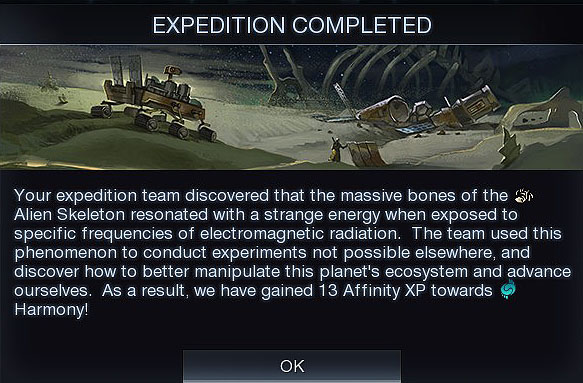 “Oh, and here’s something else,” Prickett had said, filming from inside a tent. She reached up and pulled down something from above the frame, something that writhed. 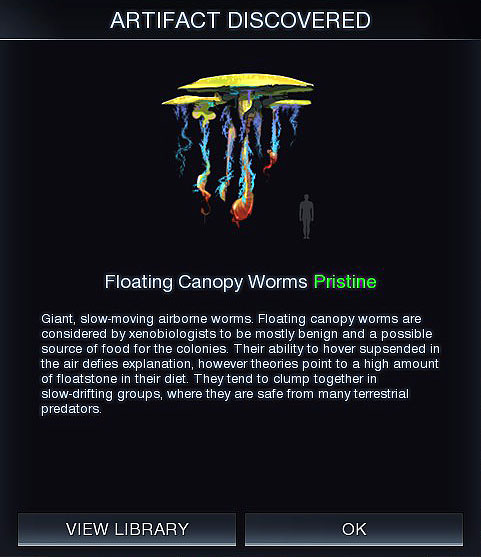 “Wild, huh?” she said. “And they taste like… bacon and jelly. Bacon jelly. They’re good raw, too!” She took a bite. Ichor burst on her face, clung to her teeth like an overripe tomato. She talked and chewed. “See?” Riveting stuff. Ballarin wanted Central’s manufacturers to print out more physical goods to sell, but they were busy. He heard rumors: Prickett’s full, unedited report to Fielding made it clear that the alien wildlife of Tau Ceti E were potentially dangerous. The manufacturers were tied up in rapid prototyping of bigger guns and better armor. 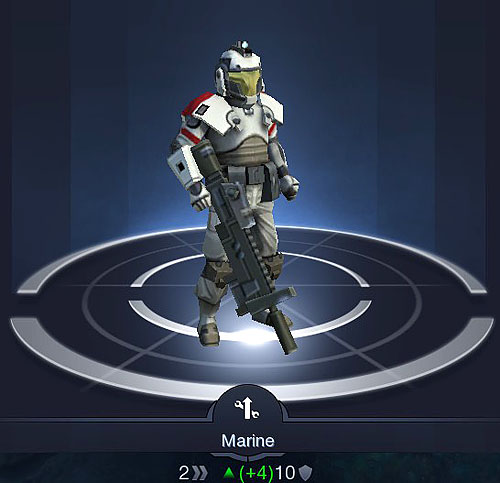 This is my reward for reaching my first level of Affinity, which is a shorthand for how humanity responds to life on their new home. Harmony, which I just received, represents a growing understanding and eventual bond with the planet’s ecosystem. Purity gauges the preservation of Old Earth ideals and the terraformation of a new planet. Supremacy tracks the post-human embrace of technology as the solution to society’s ills. Higher affinity satisfies prerequisites for buildings and upgrades your units through different “eras” of strength. --- “If your culero boss had given us shelter to begin with, maybe Guillaume Maazel would still be alive,” Zamora said. He slammed the steel door behind him. It bounced back and let in a swirl of snow before someone from the Federation scurried behind Ex-2 and cranked shut the lock. Ex-2’s point of contact was a man named Ganbaatar, a Mongol cosmonaut whose function seemed to be to say how very sorry he was. “I’m very sorry,” Ganbaatar said. The explorers shot him murderous looks. One broke into a hacking, tearing cough. Their environmental suits, by now, were mostly duct tape. The miasma ate into everything. “Do you know the worst part? It wasn’t dragging Maazel out of swarms of wolf beetles in a miasma storm. It wasn’t the green poo poo that’s probably burning out our lungs. But that’s a close second.” Zamora poked Ganbaatar with his finger. “It wasn’t burying Maazel after the miasma killed him. It wasn’t that we could hear the wolf beetles eat his body right after we put him in the ground. Do you know the worst part? After ALL of that? I had to do the narration on this.” Zamora clicked on a screen. 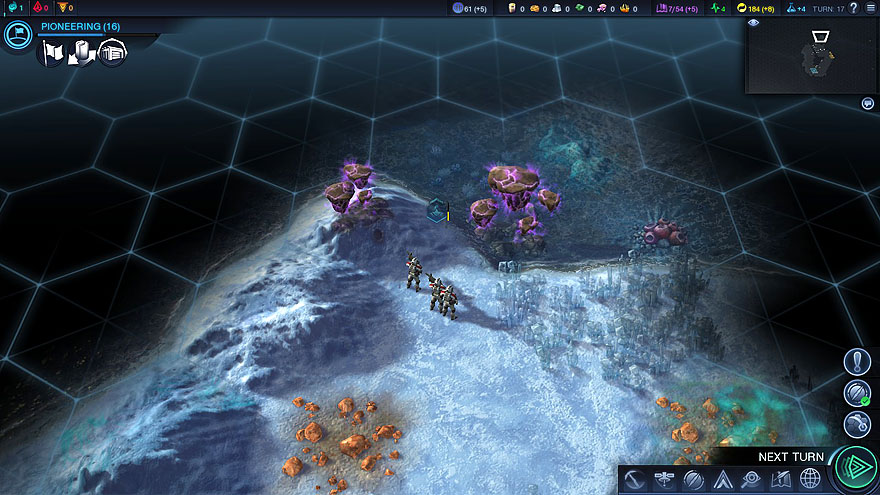 “Every day brings another wonder.” Zamora’s voice. The wondering, reverent tone of his narration came utterly at odds with the Federation’s gaunt, rasping, furious guest. “Off the northern shores, more floating stone. Who on Old Earth could imagine such a sight? And not 50 kilometers down the coast… look!”  This is hydracoral, the aquatic “terrain” new to Rising Tide. They’re sessile aliens that fight back if attacked, and slowly send out shoots that grow into more hydracoral. Zamora stopped the video. “And you’ll just dub over it in Russian anyway,” he said. “I’m sorr-” History would not remember the fistfight that followed in a debriefing room in Khrabrost, and how it had almost ignited humanity’s first armed conflict on an exoplanet. If Fielding and Kozlov caught word of it, they must have made allowances for Ex-2’s frayed tempers. They pressed ahead with their agreement. The Slavic Federation would receive copies of Guillaume Maazel’s final, fatal documentary, as well as the unedited raws - a xenobiological treasure. In return, Ex-2 would receive fresh supplies and transportation… and Federation consultants would share their best practices with ARC’s astronomy team. 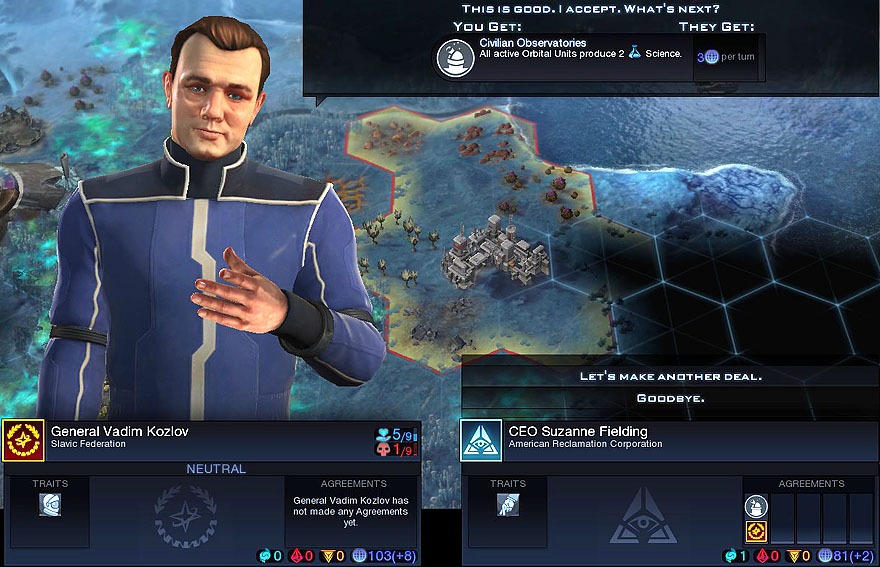 Welcome to one of the tentpole features of Rising Tide, a new bargaining and diplomacy system. A new resource, Diplomatic Capital, shows up in blue numbers next to the three affinity counters. You pay capital to other sponsors, and in return you receive buffs for as long as the agreement holds. The Solar Collector we got will feed us extra science points while we’re in the air… and the benefit will become more pronounced if we become friendlier with Kozlov. Some of the buffs you can get are very powerful, but you’ll be feeding lots of diplobux to potential enemies in return. You have to balance how much you need buffs/capital versus the gains other sponsors will get from your deals. Diplomatic Capital has other uses too, as we’ll see. --- Ballarin waved down a woman in outside gear. “Hello!” he said. “Feel like a quick stop at ARCadia? Our digital storefront is bigger than ever, and our brand-new cosmic fries are-” Dr. Prickett looked up. Ballarin’s sales pitch died in his mouth like a half-formed belch. She only had one kind of smile: a wide, redcap grin, which she used both in greeting and when beating scrap tech with a sledgehammer. “Yeah, I could go for some fries.” Prickett hopped on a stool while Ballarin filled a cup with her food. “How’s business?” “Better, now that we have TTs out there that won’t seize up in the cold. The first real harvest of tubers is gonna be big. I can’t wait to sell more of these.” Ballarin tapped Prickett’s cup of fries. The scientist obligingly crunched on a handful.  “Oh, they’re great, no doubt,” Prickett said, rolling one of her shoulders. “Exhausting to be on those rigs all day though. Your arms cramp from all the telemanipulator work.” “You’ve used one?” Ballarin said. There was that smile again. Ballarin wilted. “They aren’t as precise as the surgery models, but they don’t have to be. It was fun, but I wouldn’t want to be on that crew. I’ll stick to my lab rover, thanks.” She leaned forward. “Did you know there’s sea life, too? When I was out trying one of the TT rigs, I saw them out in the distance. I swear they were watching us.” They chatted. Prickett would lead the a restocked Expedition-1 to swing around the northern mountains, tracing Ex-2’s path to the Progenitor ruins and megastructure. Once there, she would perform initial studies, and then survey the northern coast. Central’s satellite caught a glimpse of another seedship descending in that area. Ballarin couldn’t help but to be starstruck. Celebrities and leaders who on Old Earth were unassailably distant could be seen walking throughout Central. Ballarin could talk to them, just like real people. The conversation meandered to Alberto Zamora and his video series, and to the capsule he had discovered. “What do you think of Fielding’s plan for our souvenirs from home?” Ballarin said. 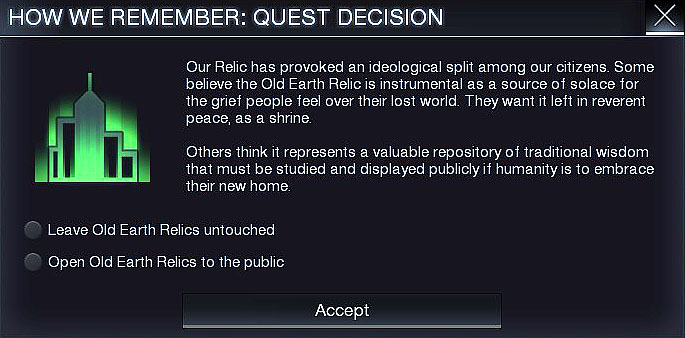 “Makes sense,” Prickett said through a mouthful of food. Deep-fry and season anything enough and you could barely tell it was dug from the ground of a frigid exoplanet. Ballarin shook his head. “How long do you think those letters are going to last? They’ll disintegrate in a few decades, and all we’ll have then are digital reproductions. They belong in a museum.” Prickett washed down her food with a slug of water. “Permanence is overrated. We’re all going to die, my friend. They’ll make relics out of our stuff, too, you understand? There will be re-enactors. They’ll get it wrong.” “Isn’t that pessimistic? Why do anything, then?” Ballarin said. Prickett flashed another butcher-knife smile. “Because museums are boring,” she said. “And actual people, right now, matter more than theoretical people who don’t exist yet.” She leaned over to clap Ballarin’s shoulder. “My team’s rovers should be just about charged and loaded now. Good talk, Martin. Thanks for the fries.” 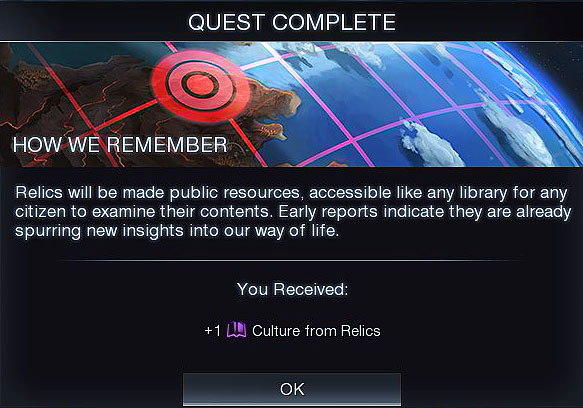 A quiet new feature of Rising Tide: many of the quests linked to buildings come with alternate text. There’s another version of this quest where the choices split between leaving the Old Earth relics open to everyone or to entrust them to a private company who would pay for their preservation, but keep them squirreled away. No matter the text, the choices you receive are mechanically identical. Still, a nice touch. --- Dr. Prickett and her team had seen the Progenitor megastructure days before they reached the ruins. She couldn’t help but cry at the sight of it. If mankind could ever understand and reproduce such a thing, it would not happen in her lifetime. Too early, she thought, she was born too early. The ruins, now. She could find the beginning of wisdom in the ruined settlement. Did these structures share an origin with the artifacts Vadim Kozlov found in the Solar system? She couldn’t wait to find out. When the ruins finally came within view, Expedition-1 learned something else: they were already occupied. 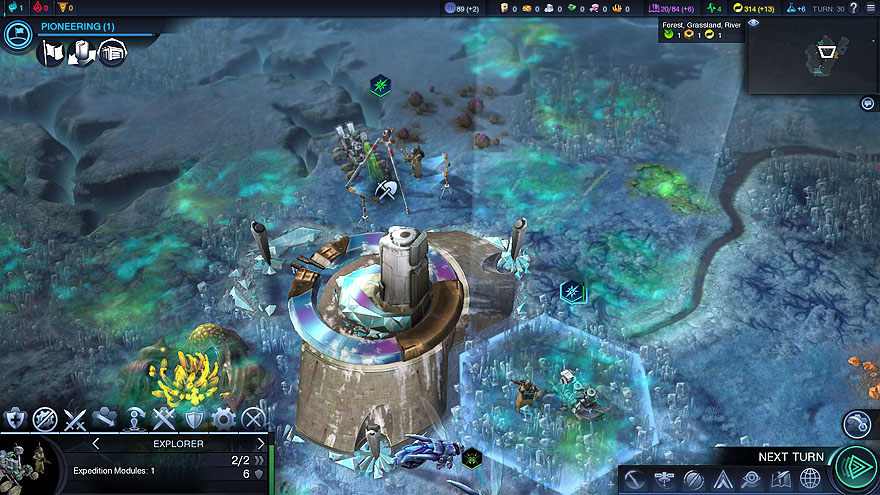 The radio in Prickett’s rover chattered to life with a dozen confused voices. She called for a halt and trained the rover’s camera on the settlement. She magnified it to its limit. Armed men and women. Prickett switched to Central’s frequency and transmitted. “Expedition-1, Central. Why does it look like there are Brasilian peacekeepers in my dig site?” There was a long pause. She heard Phan’s voice in response, carefully neutral. “Because that’s what they are, Expedition-1. Stand by for new orders.” 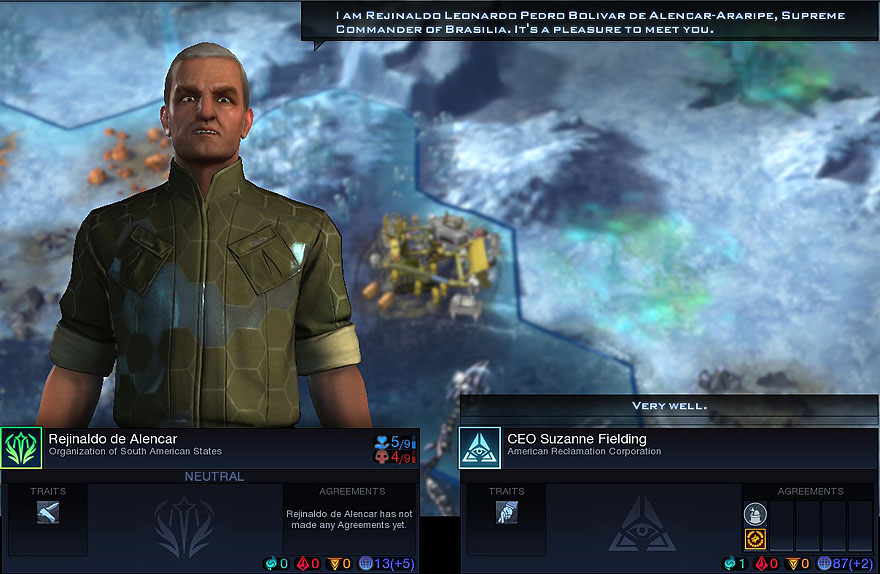 That’s right, two of the game’s most belligerent sponsors are my immediate neighbors.
|
|
|
|
Thefluffy posted:It would not be a civ LP without being sandwiched between all the warmongers at the start. Sometimes they can be downright pleasant! ...Sometimes. On Soyuz, the second-hardest difficulty level, the AI sponsors start with a handful of free techs and units. I only started with a Soldier unit because I took that specific perk during setup. Kozlov started with two Rover units, and I think Reggie has a similar setup. Right now they're looking down at ARC from a position of relative strength. On the Slavic Federation diplomacy screenshot, you see the 5/9 and 1/9. The 1/9 is his degree of fear of me - which is to say, barely at all. If the 5/9 number, his respect gauge, starts to drop, then he'll start threatening to sanction me and make aggressive posturing with his military units. This could go a couple of ways. Kozlov and Rejinaldo might be irritated at being so close to each other that they start punching each other in territory disputes. Or they might become #1 best warbros and try to poo poo on my Americake.
|
|
|
|
Part 4: We Regret The Error “Are those Kavithans?” Eddie Nelson shared his camera with the rest of Ex-2. It was hard to see through the porthole of an amphibious craft on loan from the Federation, but the viewfinder on Nelson’s device picked out the subcontinent’s insignia stamped on the side of the vessel approaching them from the port side. “Son of a bitch, they made it,” Zamora said. He cracked a smile, then clambered up through a hatch to wave. After several minutes, he could make out a Kavithan crewmember on the opposite vessel waving back. Before long, Nelson scooted beside him to watch as the vessels drew to a polite distance. If they looked behind them, they could just make out the Federation settlement of Khrabrost on the horizon. 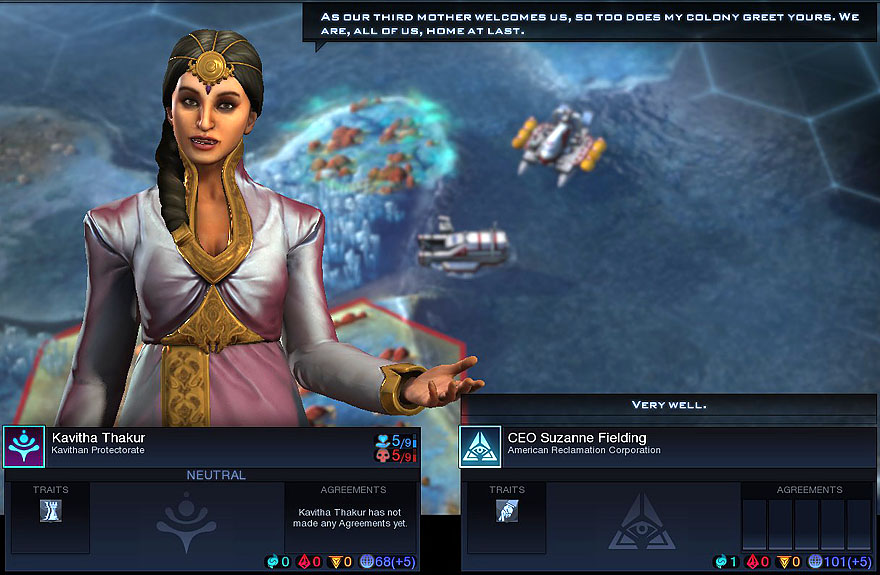 The horse-trading for an amphibious craft is a narrative conceit. All units can embark onto water tiles. Beyond Earth generously figures if humanity can send crewed ships through interstellar space, it can also make a thing that floats on water without too much trouble. The Kavithans had named their vessel Daryaaft. The Federation had not bothered to christen the boxy, amphibious craft lent to the ARC expedition, so Ex-2 called it The Party Wagon. Over the radio, the crews searched for a common language, between English, Spanish, Hindi and Urdu. One of the Kavithans happened to be part of the Protectorate’s space program, and could manage some English. The two vessels docked. The crews swapped Federation rations and naan. Through interpreters, they spoke until sunset. One of the Kavithans wanted Zamora’s autograph. They retired to their respective vessels to sleep with full bellies. That night, Nelson shook Zamora awake. They heard the alien sea lap at the sides of their craft. “Hnnn,” Zamora said. “Mr. Zamora,” Nelson said. “Let’s go with them.” Zamora sat up, ground his palms into his eyes. “What?” Nelson crouched by Zamora’s bunk. “I’m serious. They gave us the coordinates to Mandira. Let’s go live there.” Zamora frowned. “Eddie, go to sleep.” Nelson shook his head. “They’re the reason why we’re here, not some ARC aerospace program. The Kavithans made everyone believe this was possible,” he said. “Do you know how much of the subcontinent is a radiation desert? How bad the air gets? They lived through the end of days and decided that this could happen, and that this is worth doing.” Zamora sat up, focused his eyes on Nelson. “Eddie,” he said. “You’re upset over Maazel. I am too. But it’s not the corporation’s fault.” “ARC brought the dollar with them, through 12 light-years of space, to another world. Don’t you find that grotesque?” “You would rather have stayed on Old Earth?” Zamora said. “It’s so quiet here. I never thought anything could be this quiet.” The two men whisper-shouted at each other in their bunks. Some of the other crewmates cracked open their eyes and listened. “I’ll tell you what,” Zamora said. “Let’s get this mission done. Let’s survey the eastern side of the continent. When we loop back, if you want to go?” He shrugged. “Say an alien ate me, I don’t care,” Nelson said. Zamora snorted, then rolled over. --- In the morning, three members of Expedition-2 deserted. Nelson was not among them. The deserters and Ex-2 stared at each other across the distance between the two vessels. No one smiled or waved. The Daryaaft turned and sailed away. Zamora took the helm. Nelson walked behind him, checking settings on his recorder. “Where to, jefe?” They went northeast to survey a large island. A month passed, and Ex-2 catalogued nothing more exciting than stalks of strange, fibrous plants and algal blooms in the alien sea. They rode The Party Wagon back out to sea. Hours later, a star fell behind them. 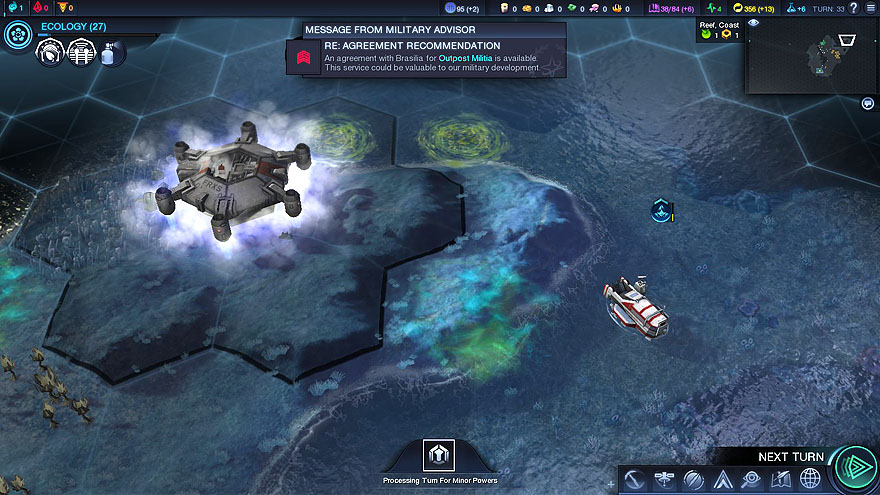 --- “You can’t imagine what this looks like from the outside, Central,” Nelson said, still squinting through his viewfinder. They caught the landing from sea: a blast of retro-rockets, great plumes of smoke, which now spread in a blanket to cover the whole island, glowing in the evening light. It was like watching the launches at Wallops Island, times a thousandfold. It was a seedship. It absolutely was a seedship. Ex-2 was close enough to hear the hiss and pinging of metal cooling from atmospheric re-entry. The Party Wagon protected them from the heat and smoke, but they could not see much beyond the hulking form of the landing module. “Ex-2, can you see anything on the hull? Any identifying marks?” Phan’s voice came at a greater delay this far from home. “Not yet,” Zamora said. Nelson kept filming, pausing only once to swap out a memory stick. The sun set. The seedship cooled. Ex-2 slept in shifts. The sun rose. A hatch opened. Men and women surrounded The Party Wagon. They wore puffy winter gear and shivered from the bitter cold. Ex-2 came out to greet them. The seedship colonists looked at each other, speaking into radios. “What is that?” Nelson said. “I don’t know,” Zamora said. Hey looked at at another crew member, Manny the jowler ball player. Manny had grown up in Dearborn, Michigan. “It sounds Arabic?” Manny said. “But like… someone trying to sound Arabic.” “What?” Nelson said. “You know, like when Franco-Iberians make fun of English, and go ‘arur-rurr-rur,’ like dogs barking,” Manny said. “It’s got the sound, but… the words are so slippery.” Manny shrugged. Zamora turned to the colonists. “As-salamu alaykum,” he said, lifting his hands. One of the colonists squinted at him. “Take me to your leader,” Zamora tried. He heard Manny stifle a giggle. The colonists herded Ex-2 into the ship. This close, they could finally see the name of the ship, written in flowing Arabic script on its hull. “The Golden Shah,” Manny said. “Central, Manny says this ship is the Golden Shah. Does that mean anything?” Zamora said. Long moments of silence. “That’s impossible,” Phan’s voice crackled, attenuated by kilometers of distance and the proximity of the seedship. “What?” “There’s no — survived — “ “Central, say again?” And then they were inside. And then they met the First Waker. 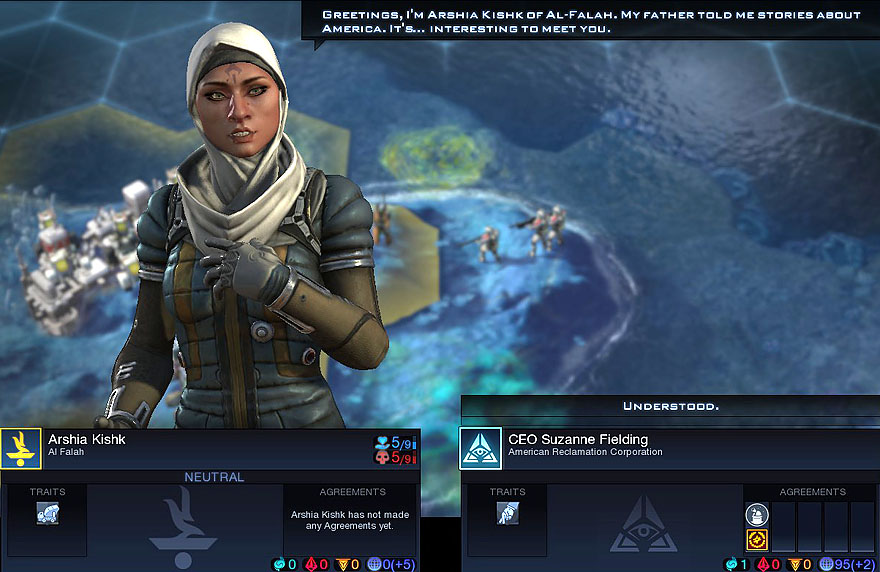 --- Arshia Kishk and Expedition-2 limped their way through first contact. Kishk spoke English, but as a historical curiosity. Manny could read standard Arabic, but found himself outpaced by centuries of linguistic and cultural drift. The colonists of Al-Falah had not gone into stasis at all. “How did you survive?” Kishk asked. “In our stories, the sleepers would not wake, or they did so with brain damage. Or blue skin.” Zamora and Nelson looked at each other. They sat together in a park. Acacias grew in hydroponic troughs. The park’s ceiling had been painted in crowded geometric designs in the Abassid style, packed tight in azure lines to suggest a bright, blue sky. The ceiling’s lights were arranged in the patterns of the constellations from the sky of Old Earth. “Yes,” Nelson said. “In the early days. They improved the process. They were sure they could send us through space without harm. Mostly sure.” None of them liked to think about how the voyage could have gone awry, how a miscalculation could have sent them hurtling, frozen and never-dying, through the darkness between stars for an eternity. “What was… is it like on the Golden Shah?” Zamora said. Kishk shrugged. “It is life,” she said. “It is hard to say. I have never had to explain it to anyone else. What is life like for you, to span hundreds of years in the blink of an eye and then to appear here?” Zamora took her point. He nodded. “Did you live in a hotel?” she said. “New York, or maybe Cibola?” Nelson’s brow furrowed. “Hotel? No, I grew up in Scranton. Where’s Cibola?” “Was it destroyed? Cibola, with the golden bridge and the mountain carved with the faces of shahs?” Kishk said. Zamora shook his head. “I think you have some things mixed up,” he said. Kishk spread her palms. “It does not really matter,” she said. “I would like to learn more, but Al-Falah has to find its way on this new world. We have more pressing questions of survival to answer first.” “We have been here for about a year,” Zamora said. “We could help you with that, show you what’s good to eat.” Kishk stiffened. “No thank you,” she said. “You don’t have to go it alone,” Nelson said. “We could stay a while, and teach you what we know while we learn-” “No thank you,” Kishk said again, her voice heavy with a finality that needed no translation. “Please,” Nelson said. He wasn’t too proud to beg, if it meant a first-hand documentary of an anthropological wonder. “Please, you need our help.” “Try to understand, we do not mean you ill will,” Kishk said. “But you will not stay. We need time to adjust.” She leaned forward. “And we have never. Needed. Anyone.” Kishk rose to her feet. The meeting, they understood, was over. “After all, where were you when our forebears needed you most?” --- The Party Wagon sailed back to the mainland. “Good job insulting her, cabron,” Zamora said. “You did too,” Nelson said. “You did worse,” Zamora said. “Stupid old fart.” “Shitman.” They sat in stony silence for the next half hour, pretending to read instruments. Zamora looked at a report from Phan. After a year of feeding the wolf at the door and observing weather patterns, Fielding wanted ARC to build a research outpost to its northwest, near the site of Dr. Prickett’s first expeditions. 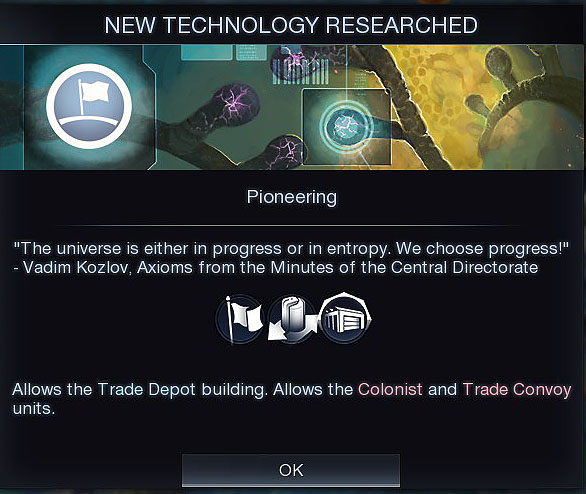 Nelson blew out a sigh and relented. “What are we going to tell Central?” --- We’ve met two more sponsors, the Kavithan Protectorate and new-to-the-expansion Al-Falah. The Kavithan Protectorate is named for Kavitha Thakur, the daughter of a guru who sparked a syncretic faith that helped reconcile and unite India with its neighbors in the aftermath of the Great Mistake. In Beyond Earth, like Civilization 5, one of the functions of the Culture resource is to claim tiles of land around cities. The Kavithans claim tiles faster than anyone else, so they’re good at building wide and grabbing lots of land. Al-Falah, unlike any of the other sponsors, did not have access to stasis pods when they launched their seedship. Theirs was a generational ship, with whole families living and dying for centuries as they slowboated through space. In the aftermath of the Great Mistake, the Middle East found itself abandoned by its international partners as everyone went isolationist to deal with the loss of life, ecological damage and mass migration brought on by the catastrophe. Al-Falah was born of a resolve by the Middle East to reclaim its autonomy and agency. They’ve learned to go it alone, and Al-Falah at the time of planetfall is slow to trust the sponsors who turned a cold shoulder to their ancestors. Mechanically, Al-Falah’s gimmick really takes off around midgame. All sponsors can direct their cities to either build new units or buildings, or convert their production into another resource: energy for “money,” food, science, or culture. Al-Falah does this at 150 percent efficiency relative to other sponsors, to reflect their self-sufficiency. If you situate an Al-Falah city for food generation, direct all its production resources to generating more food, and link it to other cities with internal trade routes, all of your cities will grow at a breakneck pace.
|
|
|
|
I'll give those a look! I'll have time to read, since I'm in the path of the big D.C. snow storm that's projected to destroy the universe and knock out power for a few days. The last sci-fi I got into was Consider Phlebas by Iain Banks. I really liked Hyperion/Fall of Hyperion by Dan Simmons. I grew up reading lots of licensed IP novels, where the author is obligated to keep the setting more or less intact. Going from that to the Hyperion series, where the author has free reign to trash everything just to see what happens, was a shock.
|
|
|
|
ousire posted:How do Al-Falah act when it comes to diplomacy? Is the AI very unwilling to trade or sign agreements with other factions? They can be taciturn, but if you have Respect or Fear high enough with them you can get agreements. Once we get deeper into the new diplomacy system, you can see at a glance what will please foreign sponsors. As they adopt diplomatic traits (permanent bonuses), those bonuses come with hints as to what people respect. And they will let you know about it. Frequently. Somewhere, either on reddit or civfanatics, I thought I saw a table someone mined from the data that listed all the sponsors and their tendencies toward belligerence, backstabbing, and the like. If I can find that again I'll post it here.
|
|
|
|
Torrannor posted:gently caress, OP, why didn't you post in the New LP thread sooner? I missed the beginning Thank you! I wanted to wait until I had built up a bit of a head of steam before I advertised on the new LP thread. As for future optimism/pessimism! It complicates things that I'm playing one of the few sponsors where Firaxis took a more critical point of view. From a Firaxicon panel (I may share some of those as this thread progresses), the devs wanted their sponsors to be mostly future-positive. That is to say, if you live in Russia, you'd be proud to play the Slavic Federation. But since it's an American dev team, they felt like they could take a bit of a darker view of the American Reclamation Corporation. ARC has done a lot of good for the United States and its partners, but it's based on an assumption that giant corporations are only going to get more powerful in the ensuing years, which maybe not everyone would regard as a great thing. (I sure don't!) Then there's CEO Suzanne Fielding. The loading screens paint her as a complicated person, more so with the Rising Tide expansion. In the base game, the loading screens show personal logs from sponsor leaders. Fielding's logs in the base game show her as someone who admires ambition as a virtue and sees a great deal of it in herself. She wants the biggest slice of the pie and she wants to realize her vision of the future. The people who get on board and help her will gain from her righteous acumen. Very "trickle-down" stuff. In Rising Tide, the loading screens changed to a lot of third-person observations about the sponsor leaders. They talk about how Fielding, a woman with black and Latinx parents, spent the start of her career learning from a series of failures, and how she prevailed against sexism and racism in her ascent to CEO. You could assume someone with this kind of experience might temper the "got mine, gently caress you" corporate mentality with some basic humanity. There's a lot going on, which is one reason why I picked ARC as a sponsor instead of one of the new folks like INTEGR or Al-Falah. (I also wanted to get into their espionage game, which we'll see soon.) The other sponsors tend to get painted with very broad strokes - African Union and Pan-Asian Cooperative, I'm looking right at you.
|
|
|
|
Part 5: Highly Effective People Phan Phuong hated her Brasilian counterpart at first sight. “The problem,” Phan said to Martin Ballarin at his little ARCadia stand. “The problem is.” “Yes?” Ballarin gave her a nudge over the counter. She blinked awake and focused her eyes on him. “The problem, yes. They aren’t… they aren’t elitist, you know? They’re elite. It’s almost worse.” Ballarin frowned. “What do you mean?” “I mean, she’s always slipping these superlatives into her conversation. Graduated first in her class, logged third most hours of flight time, her marksmanship records.” “That sounds rough,” Ballarin said. “You have to admit, though, we’re all elite by definition. We’re colonists on another planet.” “Not all,” Phan said. “The Kavithans picked their colonists by lottery, and they landed here just the same as a ship full of spec-ops badasses.” Ballarin conceded the point. “So why is she here?” Phan wasn’t so sleep-deprived that she would slip confidential information to a retail store manager. She narrowed her eyes at Ballarin, and he lifted his hands in a defeated gesture. She remembered Operations Officer Sophie Ferreira Cardoso swaggering into the meeting room, dressed in arctic camo. She had introduced herself, complained about American cuisine (“Too many vegetables!”) and lit a cigarette. The Brasilians brought smokes on their seedship, because of course they did. Phan had plastered on a smile and shared with Officer Ferreira some classified details of ARC’s involvement with the FBI’s Operation Riverboat scandal. She spoke with great candor about ARC best practices on damage control and staying on-message. She did this because by any practical measure, Operation Riverboat was ancient history and nearly all of the people involved had been dead for centuries. Most of all, she did this on orders from Fielding herself, as part of some agreement with Supreme Commander Rejinaldo de Alencar. 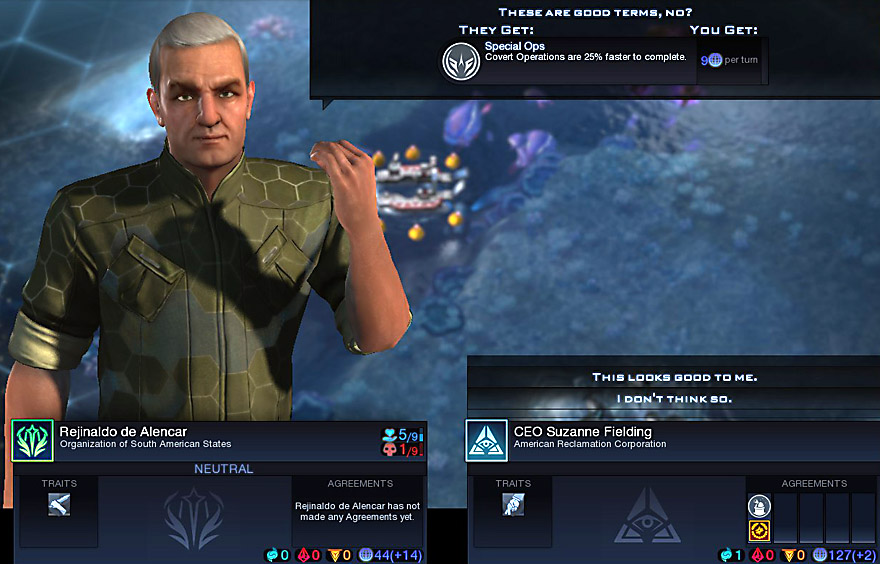 In the base game of Beyond Earth, diplomacy amounted to fending off open border requests from other civilizations for a few hundred turns, followed by declarations of war at endgame. Rising Tide is a little different: remember how I got a science-boosting agreement from the Slavic Federation? Well, ARC can offer accelerated espionage times to other civilizations. Reggie wants to get in on this. I accept the deal as a calculated risk: it will be a little while before Brasilia researches the technology to enable a spy network. Until then, this is free diplomatic capital for me. “Is… whatever you’re doing why you look so rough?” Ballarin said. Phan gave him a look. “That’s not what you said,” Phan said. “Here’s what you said. ‘Is whatever you’re doing why you haven’t gotten enough sleep?’” “Um,” Ballarin said. “But no. The boss lady wants to step up our planetary survey. Dr. Prickett’s diverted east, and we got the all-clear to set up a third crew to explore the western ocean.” Ballarin went to process a few orders, then came back. “Have you heard anything from Alberto Zamora?” Phan frowned. “No,” she said. “I haven’t.” --- Weeks passed. “Ex-3, what do you have?” Phan said. “Another capsule.” The voice of Expedition-3 sounded so much clearer than Ex-2’s final transmissions. Phan could hear the lapping of waves over the scientist’s voice. “It was floating on the surface. An actual message in a bottle.” “So what’s inside?” 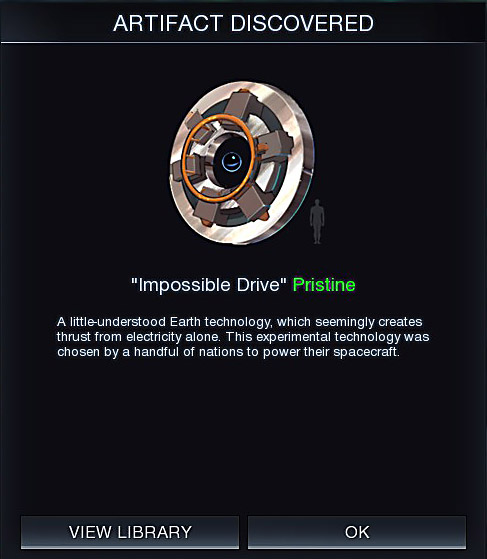 “Seems different than the ones on our seedship, ma’am. We’re looking for a date of manufacture, but I’d bet this is at least a few decades more advanced than what we used to get here.” Phan snorted. Futuristic tech, already centuries old. ARC had cannibalized its Impossible Drives for components to build Central, but this was definitely worth bringing home to study. She told them as much. “That’s received, Central. Have you heard anything from Expedition-1?” Phan cleared her throat. “You could say that, Ex-3. Dr. Prickett is experiencing… difficulties.” --- 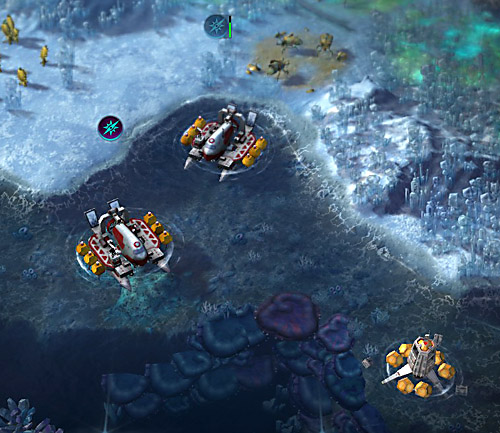 “Hello, I’m Dr. Penelope Prickett, and this is Please Give Me Permission To Open Fire.” The scientist’s voice squeaked with false sweetness over the radio. “Permission denied, Ex-1,” Phan said. “I saw it first!” Prickett said. 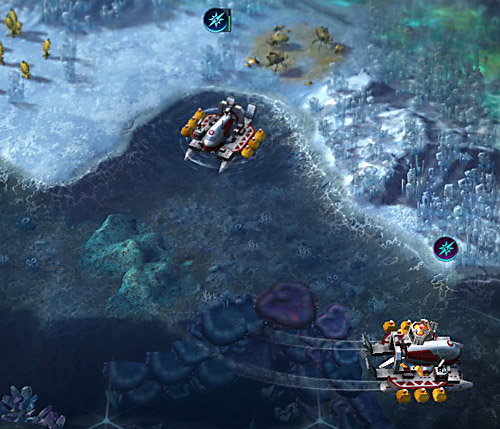 Foreign sponsors will grab for capsules, too. “And they’re Kavithans,” Prickett said. “It’s probably a boat full of rice farmers. What are they going to know about… whatever is inside?” “Don’t be lovely, Ex-1,” Phan said. Gringos, she thought. “Children sang songs about rocketry in New Delhi. They know more than you think.” “They wouldn’t if you’d just let me… rrrrrgh,” Prickett said. The basic problem with a colony of pop scientists and fameballs was that they were garbage at radio discipline, Phan thought. “Penny, you don’t mean that,” she said instead. “I know.” “You can’t win ‘em all.” “I know, Central.” “And, uh, I know you aren’t going to like what I have to say next,” Phan said. She really didn’t. Phan ordered Ex-1 to hail the Kavithan vessel and ask them if they knew the whereabouts of Zamora and the rest of Ex-2. Prickett did it after five minutes of borderline racist fulminating on the air. The Kavithans had not heard from Ex-2. But they had made contact with Al-Falah. Explorers from Ard, the settlement built from the Golden Shah, mentioned seeing Americans moving east on the mainland, toward Progenitor ruins and derelict orbital devices wreathed in miasma. 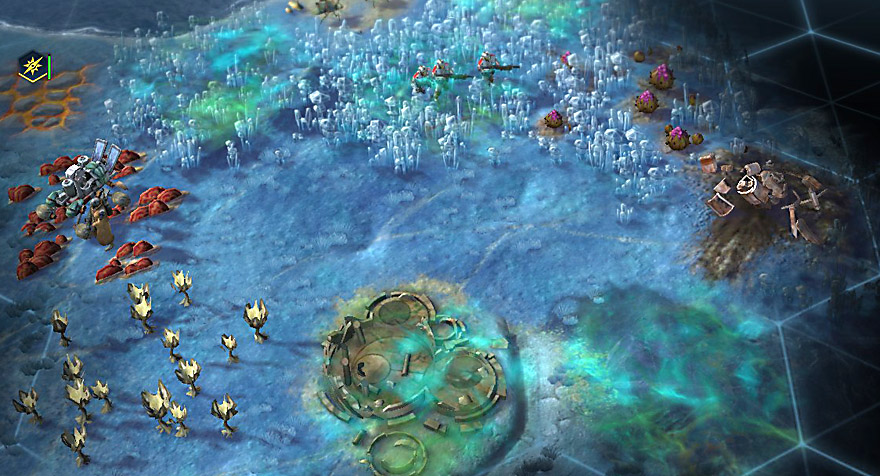 --- Months passed. ARC’s research team knew they had to deal with the miasma that covered much of the planet’s surface. Mankind had centuries of learning to deal with poisoned air. All it took was some time to study this novel contaminant. 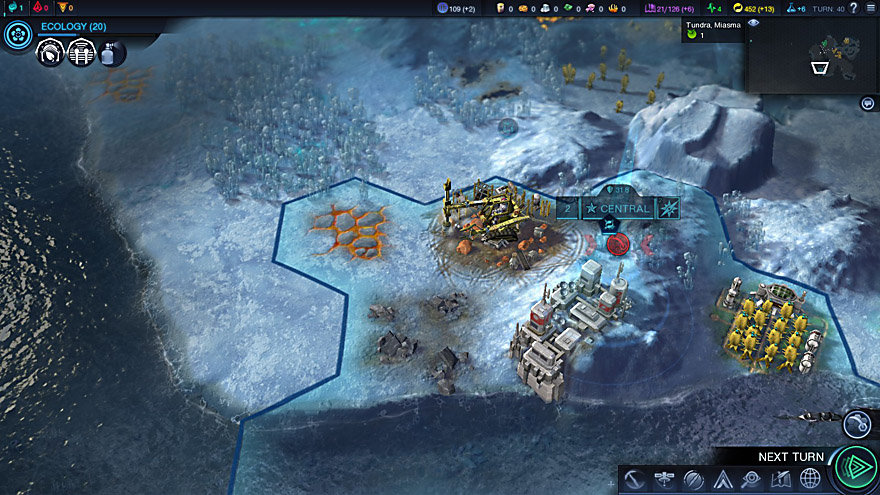 Our worker unit excavates a copper mine - a source of more energy and production, and a little bit of science once we build a proper Network in central. We’ve already developed the tubers east of Central into a plantation. Like Civ 5, more food makes cities grow, with more “citizens” who can work more tiles. I could develop every tile in Central’s control and it wouldn’t matter if there weren’t people to extract the bonuses from them. Phan’s first hope of mankind’s long-term survival on Tau Ceti E didn’t come from prototypes of miasma purifiers, but from good old Kentucky bluegrass. Some of it had spread out of Hydroponics into the wild, probably while cultivating the tuber plantation. 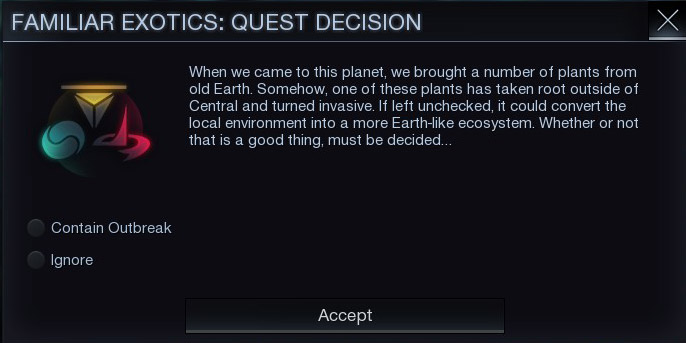 We ignore the outbreak. The grass grew wherever the wind blew. It found something it liked in the cold soil. After a while, Central started to look like home… or maybe the upper peninsula of Michigan in the winter. If Pleistocene monsters swam in the Great Lakes. Some enterprising souls transplanted a few wan striplings of apple trees into the soil outside Hydroponics. They took root. With the right kind of gentle, genetic encouragement, they could flourish. CEO Fielding, reading words to this effect in a report, fast-tracked the vivariums that could make this happen. 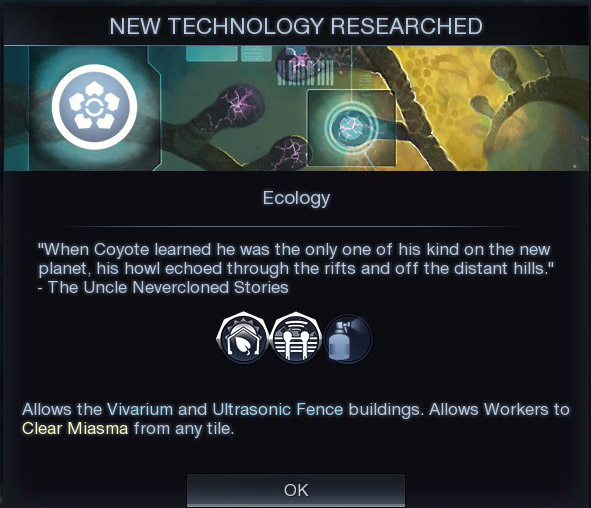 Ecology lets us do a lot of great things: Vivariums give +2 food; Ultrasonic Fences keep aliens away from cities and eventually trade units; and workers can spend a few turns to clear miasma from a tile. We spend some of our stockpiled energy to “buy” a Vivarium right away. Central didn’t land in a food-rich environment, so this will help jump-start growth. If we had landed in a desert, a Vivarium would have let us pull food resources from desert tiles. But I wanted to rush a Vivarium because it completes this quest. 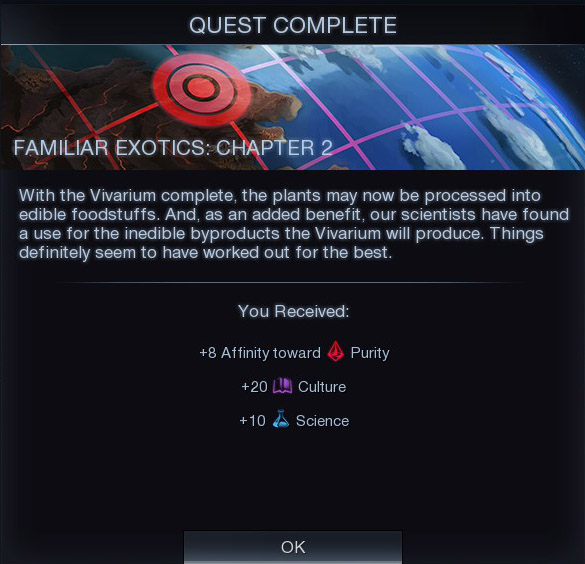 Complete quests whenever you can. They give significant rewards. This one gives me enough affinity points to reach the first level of Purity. 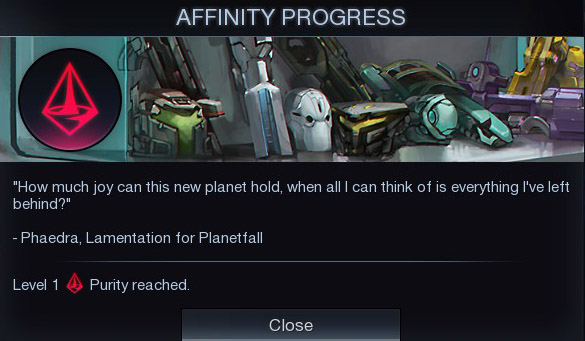 --- Years passed. 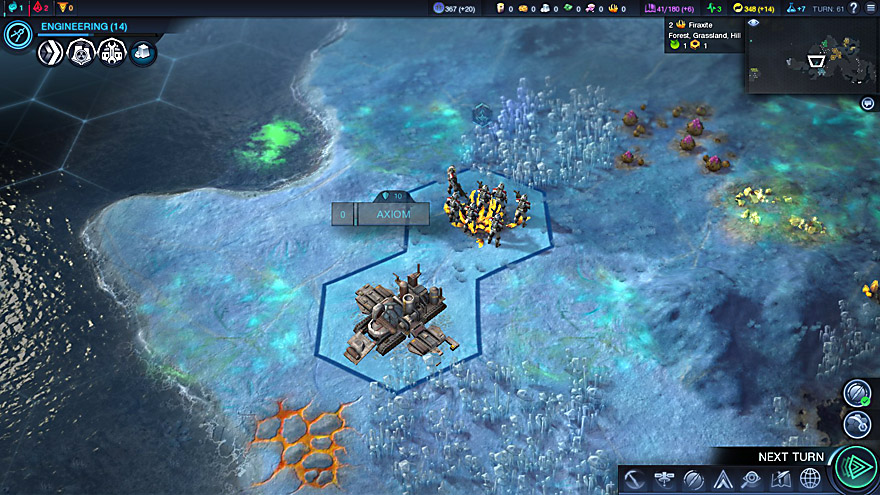 Scientists had set up a permanent outpost to the northwest of Central. The Axiom Project would take advantage of nearby resources, like the yellow polycrystals Dr. Prickett had observed on her first expedition. Scientists called the stuff firaxite. Scientists believed it might make have superconductive properties. Scientists had yet to invent a way for Phan Phuong to get a good night’s sleep. Phan still took her shifts on the radio, but Fielding had long since recognized Phan’s talent for collating information. She had graduated from writing daily bulletins to helping shape ARC’s growth and foreign policy through deep-dive analysis. Somewhere along the way, she’d managed to have a child. She had not planned for a love life or a family, but they creeped in on her nonetheless. At any rate, parental leave had taught her the value of delegating tasks to the rest of Communications. It had ended all too soon, and Phan was back to work. 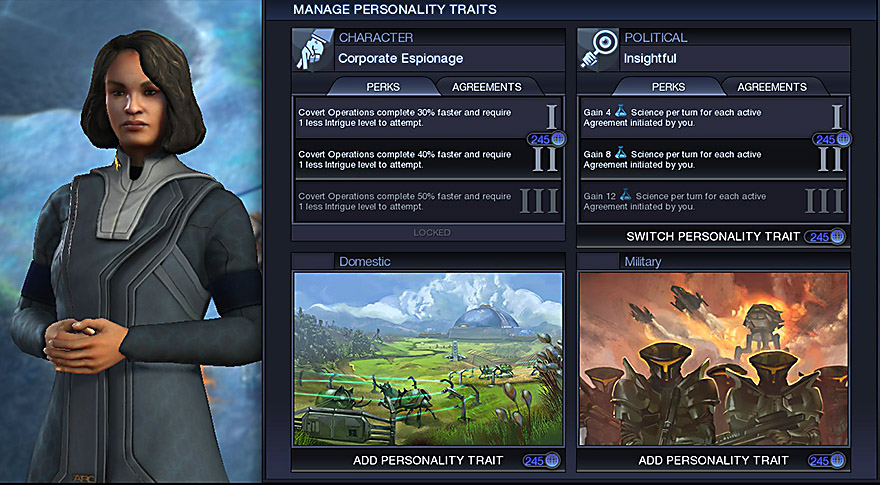 It’s time to cash in some of those Political Capital points. Political Capital is very useful! There are scads of personality traits to buy, and each one can give you a quick hit of some resource you lack, be it health, research, or whatever else. We choose Insightful. Remember that agreement we struck with the Slavic Federation? Now it gives us an extra four science per turn. Our deal with Kozlov, if you remember, gives us two science per turn for every satellite we put in the sky. This is a nice early-game boost to build some research momentum. Note that we can also improve existing traits, including our sponsor bonuses. You better believe we’ll improve ARC’s espionage bonuses once we get our spy network up and running. She had her work cut out for her. Ex-3 had discovered another continent to the west, and the Franco-Iberians who had already staked their claim to it. 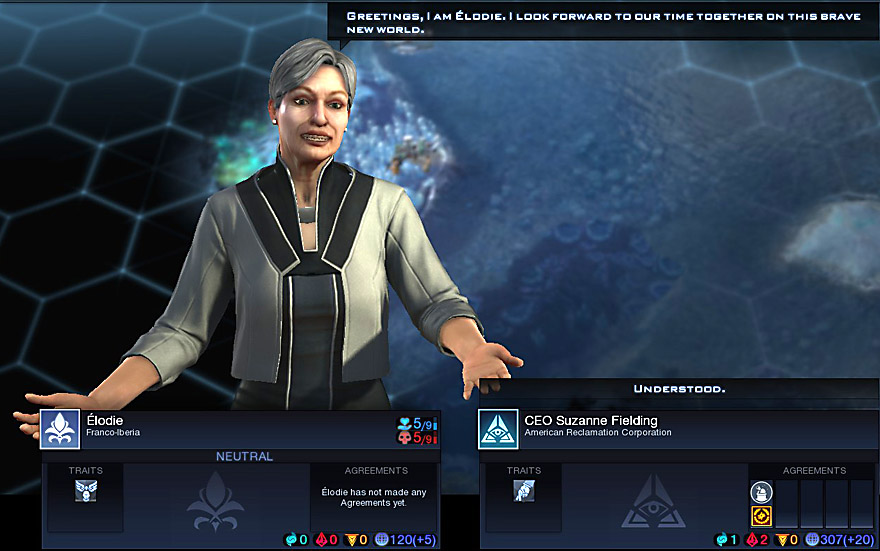 Phan’s last conversation with a Franco-Iberian on Old Earth was a protracted argument on a message board. Who, the thread asked, was the planet’s dominant culture? To Phan, it was a no-brainer. Anything ARC didn’t own did business with it. Its products had permeated every nation. “No. There is a difference,” the Franco-Iberian had said, “between culture and brands.” For now, the ocean between their colony, Le Couer, and Central made Franco-Iberia a minor variable in ARC’s emerging political landscape. Ex-3 had reported one interesting detail: during their meeting with Élodie, she had hinted at another seedship somewhere to the north of Le Couer. Another mystery. More mysteries, more variables. Phan could do with some clarity. “Ex-3, Central.” Dr. Prickett’s voice on the radio. Attenuated, urgent. “Go ahead, Ex-3.” “I found Eddie Nelson.” It took a second for the name to click into place. “Is he with the Kavithans?” Phan said. Before he had gone entirely dark, Alberto Zamora had let slip that Nelson wanted to emigrate. “He’s in the ground, Central,” Prickett said. “In a grave on a hill.”
|
|
|
|
FredMSloniker posted:As someone who's never actually played Beyond Earth, or even watched someone play Beyond Earth, this is reading more like a fanfiction than an LP, and a fanfiction for a fandom I'm not in at that. I'm not asking you to screenshot every rover you build, but some more idea of, y'know, what you're doing in the game would be helpful. I understand. This isn't going to be for everyone! I'm up front in the OP about how I'm going to carry this out and my inspirations. I also linked to a more "standard" LP of the game (pre-expansion) in the OP, if you're looking for something like that. And Reggie's being a bit dumb to ask for the Special Ops bonus, true. In fairness, it will come into play before long: especially on Soyuz level of difficulty (second hardest), where the AI gets something like four bonus technologies at the start and can conceivably get spies sooner than me. But the AI in Civ: Beyond Earth has ranged in complexity from "does its best, but isn't all that bright" to "doesn't even try to win the game." I'm told it was especially dumb around launch.
|
|
|
|
Under the hood: The tech web, virtues, and winning the game How do you win at Civilization: Beyond Earth? The major victory types follow the three affinities: Purity, Harmony and Supremacy. These are three broad paths by which human culture changes as a response to colonizing an exoplanet. Your affinity ratings start at 0 and go as high as 18, though you can build the game-winning planetary wonders at affinity level 13. You get affinity points by completing some quests, like the one that prompted us to react to an unplanned spread of Earth flora. Mostly, you get them from researching new technologies. You do that by navigating the tech web. 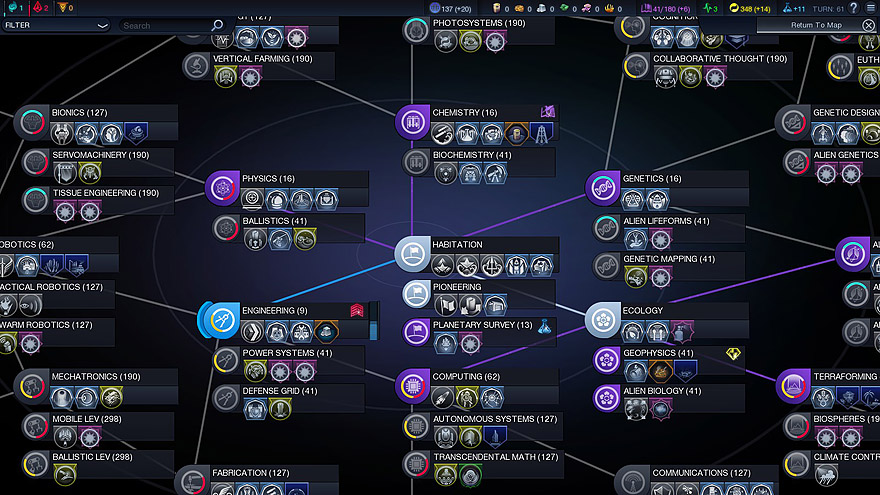 If you’re familiar with Civilization V’s tech tree, you have a small handful of choices, and a few branches, as you advance. For the most part, it’s about prioritizing what you get first. Even if you pick Animal Husbandry first, chances are good you're going to loop back and learn Pottery. Meanwhile, you open the Beyond Earth research screen and you see its "tech web" - an enormous blob of choices, radiating to the late-game technologies at the outer edges of the web. It's a lot to take in. The tech web tangles up its metaphors - the web has “branches” and “leaves.” The “branches” are spokes radiating out from the center to “main” technologies, like Engineering, which we see highlighted here. The “leaves” are the technologies underneath the branch techs - under Engineering, Power Systems and Defense Grid would be considered “leaf” technologies. So what are you supposed to research? Broadly speaking, you want to decide which affinity you want to chase to its victory condition, and then choose technologies that bump up that affinity. How do you know which ones do that? If you’re playing the base game of Beyond Earth… you don’t, at a glance. You have to do some clicking around a very obtuse design to see what’s going to raise affinity. One of the quality of life improvements in Rising Tide (which propagated to the base game as a free update) is a visual overhaul of the tech web. We see the circle around Engineering’s icon partially colored yellow. Yellow means Supremacy, and it means researching the tech will give Supremacy affinity. Some techs can advance multiple affinities, like Computing. Still, this is a lot of information to take in. What if you wanted to filter the tech web so you only saw which techs will increase an Affinity? You can do that with filters. 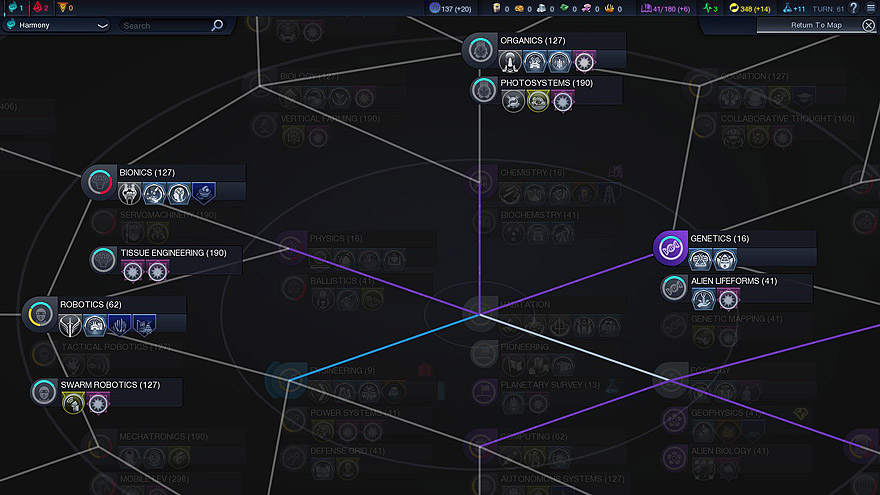 Here, the game blacks out everything but techs that increase the Harmony affinity. You can also do this by resources. If you find your Health score going into negatives, you can open the tech web and filter it to see exactly which technologies unlock Health increases. You can type the name of a particular military unit, building, or tile upgrade, and the tech web filter will tell you which technology you need to unlock what you’re looking for. It’s really handy. Beyond Earth is a very forgiving game. In your first game or two, you’ll bumble through the tech web to see what everything does. Later, it will start to click in your head what works with what, and you can plan research and affinity progress to play to the strengths of your sponsor and starting geography. Beyond Earth is happy to shower riches upon you. At lower difficulty levels, even if you’re not sure what’s going on, finishing quests and upgrading tiles can be enough to keep you ahead of AI opponents until you understand the rules. There are three resources on the map that correspond to the affinities. Floatstone, the floating purple rocks, go with Purity. Firaxite, the yellow crystals that look like a Bloomin’ Onion platter, go with Supremacy. Xenomass, the green goo, goes with Harmony. If you find a lot of one kind of resource near your starting location, chances are good you’ll have an easier time chasing down an affinity victory associated with that resource. Beyond Earth is happy to shower riches upon you. Another of those riches are Virtues. Every turn, you generate Culture points - the purple number next to a book-shaped icon. Certain buildings, like Old Earth Relics, give you Culture. Your Culture output determines how fast you gain control of tiles around your cities, but it also contributes to your Virtues. After you get so many Culture points, you get to pick a new Virtue. 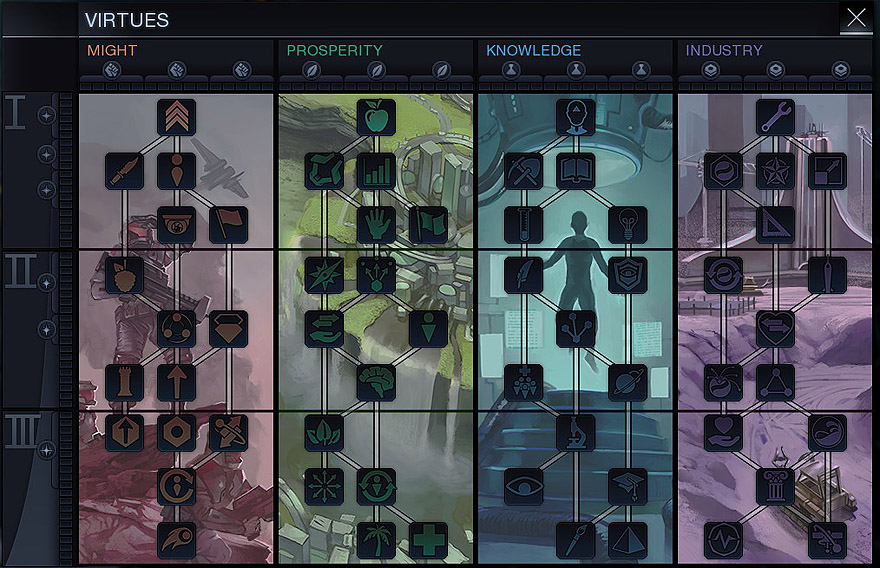 This has changed little, if at all, from the base game. The four virtues are Might, Prosperity, Knowledge and Industry. Might helps you if you lean into a military-heavy game, as you might if you choose Brasilia as a sponsor. Prosperity helps your cities grow. Knowledge helps your research (and espionage). Industry helps your production and Energy. 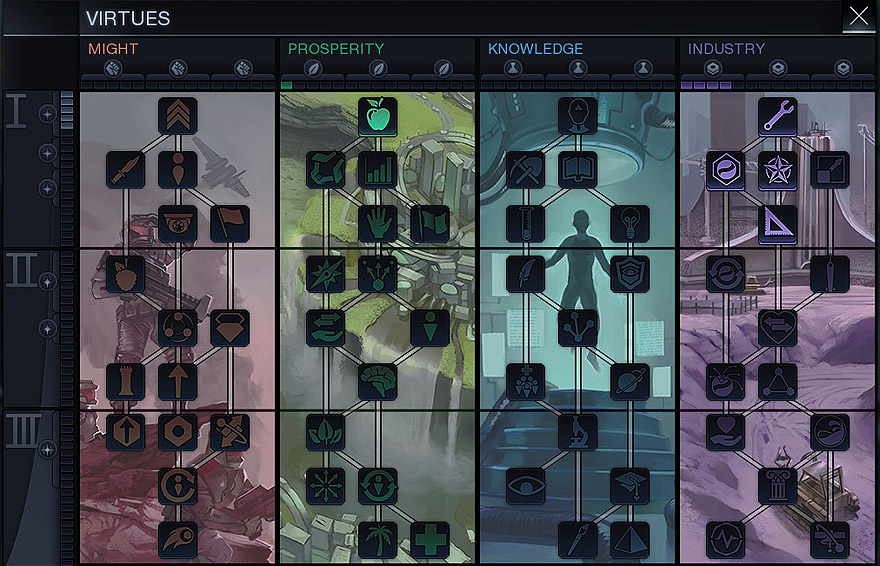 In this game so far, I’ve chosen four Industry Virtues and one Growth Virtue. In Industry, I picked: -Labor Logistics (the first virtue, the wrench): +10 percent production towards buildings. -Commoditization: +1 energy from every basic resource (basic resources are things like the copper mine we’re working on now, and the tubers we cultivated into a plantation). -Central Planning: +5 energy per turn in the capital. -Standardized Architecture: +25 percent production toward buildings I’ve already made in the capital. This one lets me build “tall” as well as “wide.” In Prosperity, I chose: -Frugality (the first virtue, the apple): +10 percent food retained after a city’s population grows. The more food you have, the faster a city grows. Right now, Central is size 3, meaning it has three citizens - an abstraction that tells you how many improved tiles the city can “work” to use the resources on those tiles. Those three citizens eat a total of 6 food. Between my upgraded tiles and buildings like the Vivarium, Central generates 11 food. That gives me a surplus of 5 food every turn. 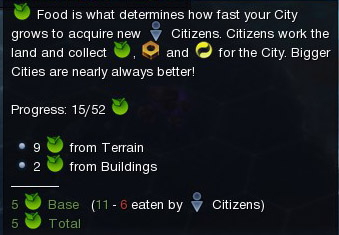 We see the number 15/52. My surplus food adds to the left side of the slash every turn. When I clear 52, I’ll have enough to generate a surplus Citizen. The virtue I have means 10 percent of that surplus food is “retained” after I grow, and counts toward the counter toward the next period of growth. I went in heavy on Prosperity because it helps me generate a surplus of energy. I can use that surplus to buy buildings for new colonies, instead of waiting for them to finish construction. I can use it to panic-buy military units if one of my neighbors gets rowdy. By taking Prosperity virtues,I shouldn’t have to worry about shortages or not being able to afford the energy upkeep of my units. I’m dipping into Prosperity because Central landed in a spot with plenty of resources to goose my production and energy, but very little in the way of food. In fact, my capital size growth stalled for several turns until I was able to build a Vivarium. If I can hang on long enough to research Computing and build a spy network, then I’ll be able to take advantage of the Diplomacy Trait system and ARC’s sponsor bonus to do some really silly espionage japery. In order to do that, I need to survive the early game and keep the Slavic Federation and Brasilia from bombing Central into a sheet of glass.
|
|
|
|
Part 6: Gone To Pursue Other Interests Dr. Penelope Prickett sat in her expeditionary rover in the shade of Eddie Nelson’s grave hill. When she glanced up, she could see the grave marker cast in silhouette by Tau Ceti, a battlefield cross made in a centuries-old tradition. Bad omen, she thought, and clicked through the index in Nelson’s recorder. She had pulled it from his shallow grave. Click-click. In the earliest files, Nelson filmed like a documentarian - lingering pans over the planet’s frigid landscape, blurs of blue and green. They couldn’t ever seem to escape the blankets of corrosive miasma that hugged the landscape. Click-click. Nelson makes attempts at cinema verite. The faces of Expedition-2 turn to the camera, pinched and tired. With each try there are fewer faces, angrier faces, more duct tape covering environmental suits. Some of the explorers double over into coughing fits. Click-click. So few faces now. “Eddie, put that thing down.” Alberto Zamora’s voice, off-screen. “Why are we out here, Mr. Zamora?” Eddie’s voice, behind the camera. “What else are we going to do?” Uncomfortable silence. Prickett reached to click to the next file, then paused. A few minutes later, Nelson sees it too, in the recording. “What is that thing?” Nelson said. “What is what?” 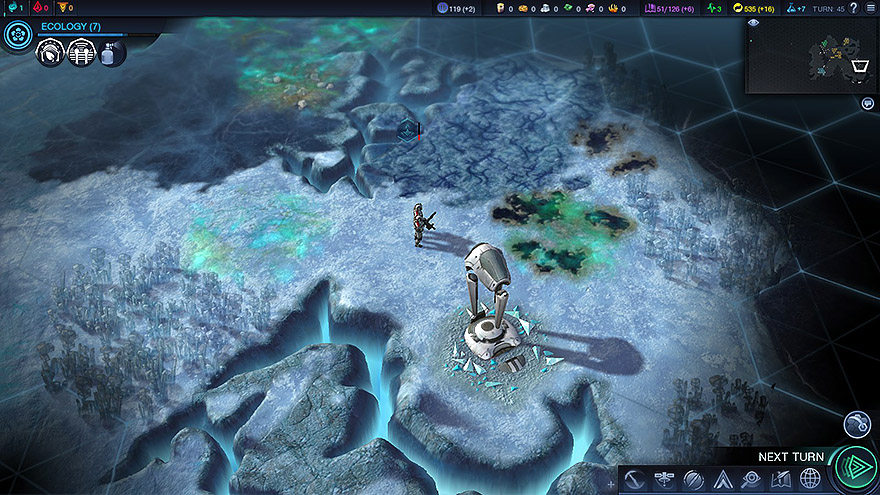 Click-click. Two hours of careful examination of a Precursor object - building-sized. It’s like the colossal xeno-machine equidistant from Central, Khrabrost and Cidadela. It’s like that, writ small. Nelson gets as close as he dares without his recorder melting in his hands from the machine’s heat.  ...known to sustain these temperatures, outside of the planet’s core! We don’t yet know their purpose, but these floating structures might serve as a radical source of energy on this planet. We should locate as many as we can. These are the key to solving our planetary marvel quest. The first civilization to investigate six more of these things completes the quest and gets the bonus. Note that any unit can investigate planetary marvel quest tiles, not just Explorers. Prickett grinned. “Good man, Eddie,” she said. Click-click. The staccato blast of automatic gun fire -- “Wait, wait!” Prickett paused, scrolled back, hit play -- Click-click. White stones glistening in a river. No: alien life, swarms of it. Beetles, if beetles herded like cattle. If beetles were the size of cattle. Nelson sees them through a viewport in their amphibious vehicle. “They’re following us,” Zamora said. The camera shakes violently. Nelson is coughing. Zamora steadies the other man. Nelson tries to speak, drags back a breath, tries again. “No poo poo, Mr. Zamora.” “How long until The Party Wagon’s charged?” Nelson checks some panels off-screen. “Two hours, or an hour if we move at a crawl.” A camera-glance back at the giant beetles. They’re butting against one another. Agitated, restless. “If they come for us,” Zamora says, “they’re going to batter our ride to bits.” “If they…” a coughing fit. “If they do.” The camera lingers on Zamora’s face. Zamora presses his lips together, shakes his head. He looks so gaunt. “Mr. Zamora? Where are you going?” The old actor reaches into a bin, pulls out black, boxy magazines, attaches them to his suit’s rigging. He slaps one in his rifle, works the charging handle. “Piss on this planet,” Zamora says, “and piss on those bugs.” Zamora opens the hatch and leaves. Nelson croaks something in protest. Outside, Zamora bellows to the scarab swarm. “Ay!” he says. “Chinga tu madre!” And opens fire. “Wait! Wait!” Prickett can barely hear Nelson over the high-caliber gunfire. Documentarian to the end, Nelson mounts his camera. Prickett sees Nelson’s hands reach for another rifle. He loads, then steps outside. 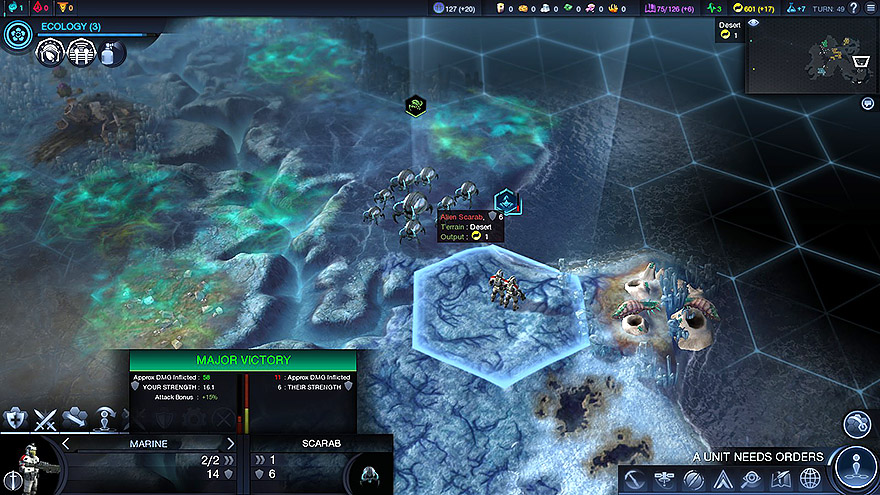 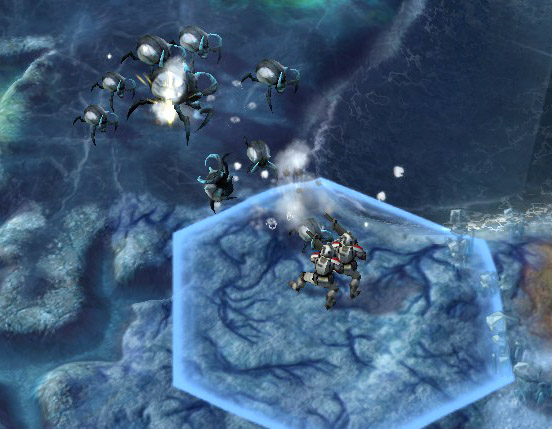 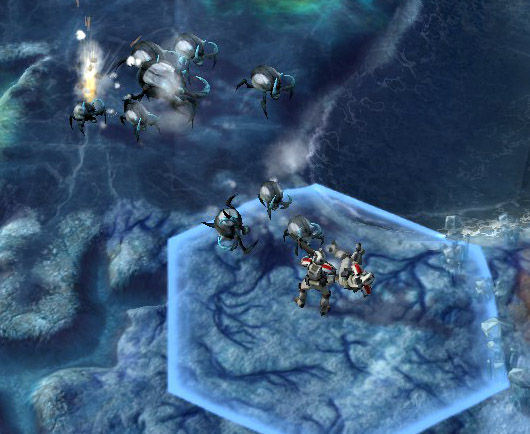 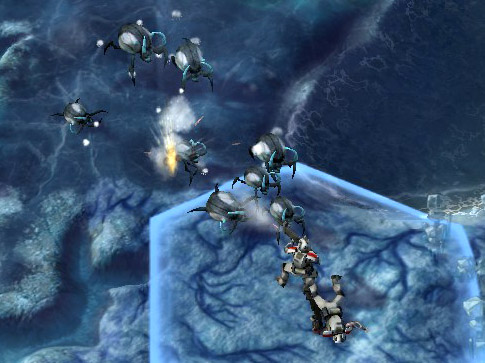 Click-click. Zamora’s face, pressed close to the recorder’s lens. He is unrecognizably thin. “Eddie didn’t make it,” he says. “We went too far out. We should have turned back. I think I messed up.” Silence, blowing wind. He coughs, clears his throat. “Eddie Nelson died 14 March, 2627. I don’t know if that’s right. Day and night are so different here. I don’t know if the seedship kept the time the way it was supposed to.” Another cough. “The Party Wagon is picking up radio signals east of here. I’m going to try to go there.” One last pause. “We shouldn’t have come.” Click. --- “Dr. Prickett.” Phan Phuong’s voice crackled over the submersible’s radio. Prickett blinked out of her reverie and keyed up. “Central,” Prickett said. “I had a vision. Isn’t that nice?” A long pause. “Excuse me?” 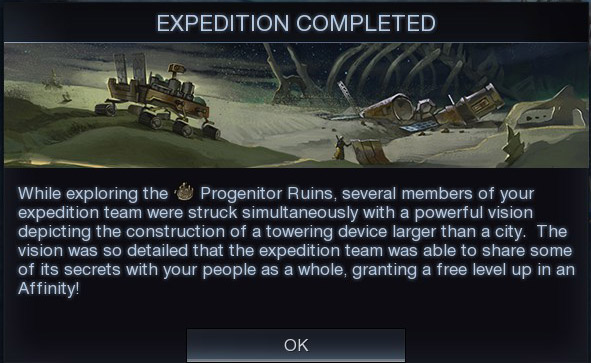 “I found a Progenitor settlement under the ocean and I had a vision,” Prickett said. “Penny. How long have you been in contact with the Commonwealth of the Pacific?” “Oh, a few months.” 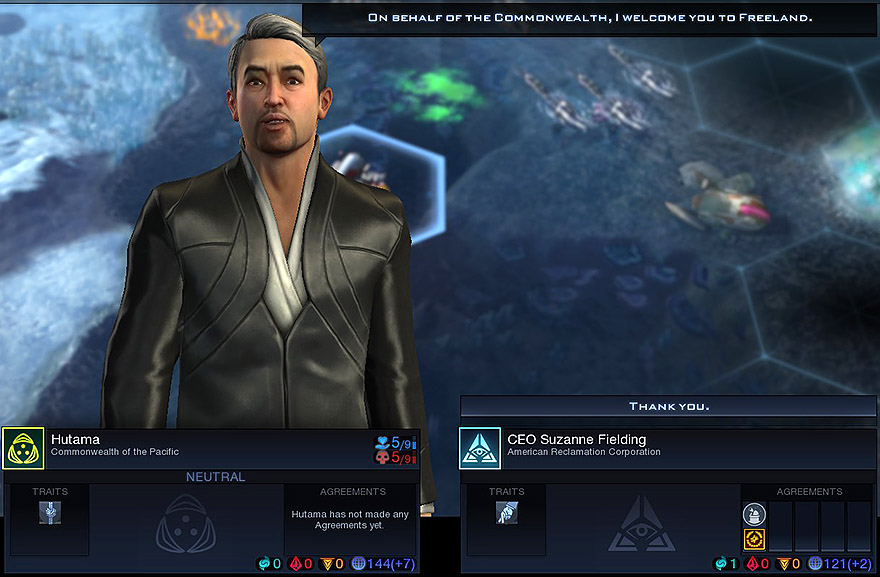 “When were you going to tell us?” Phan did not sound amused. “I got distracted,” Prickett said. “By the vision.” “No, that came later. I went looking for Zamora, and I ran into the Polystralians. And I needed a submersible, and they needed… some things. So we traded.” “Why did you need the submersible, Penny?” “Because of the undersea ruins, Central. Try to keep up.” Heavy silence. “And you went down there and saw something?” Phan said. “What was it, ‘In Hoc Signo, Renew Me For Another Season?’” “I saw them building the machine! The great drill to the core! I saw them make it! I saw it!” Silence. Prickett watched the clock in her submersible. Three minutes passed. “What happened? What, specifically, triggered this vision?” “I found a solidified quantum superposition,” Prickett said. “When I touched it, I saw.” Another minute of silence. “Penny, I’m being told that isn’t possible.” “The vision, or the superposition?” “Either!” Prickett had never heard Phan raise her voice. “Well,” Prickett said, “tell that to the superposition.” 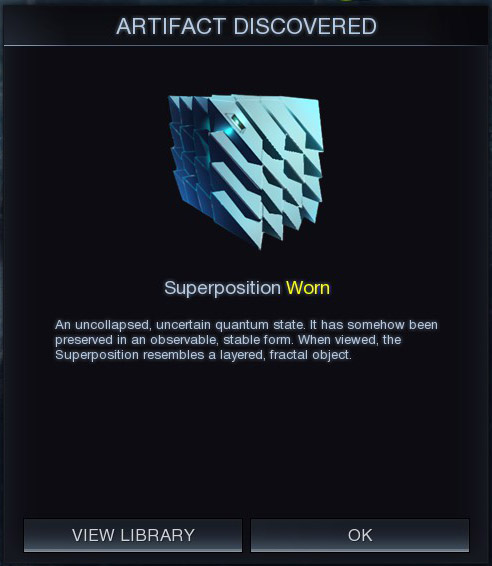 And that makes three artifacts! One from the alien skeleton, one from a capsule, and one from the Progenitor Ruins. I can cash them in all at once to get one-time bonuses to my resources… and a special bonus or unlockable building. Each of the artifacts have a “preferred” reward, but the game picks a reward from a possible list. These would give me Ground-Penetrating LIDAR, which vastly increases the speed of explorer expeditions. I’m not going to do it, because there are so many better rewards. Expeditions are an early-game activity, and I’m looking for something that will give me a lift through the entire game. It is worth it to gobble up as many artifacts as possible, because they are often better than the wonders you can build in cities. --- Prickett was not so disloyal as to tell Polystralians what she saw. They let her stay in an “apartment” that was as large and well-furnished as a monastic cell. It was a little larger and a little nicer than the habs in Central, the last time she saw them. The Polystralian scientiests asked her about the ruins many times. They saw the light of fanaticism in her eyes. She only smiled to them. 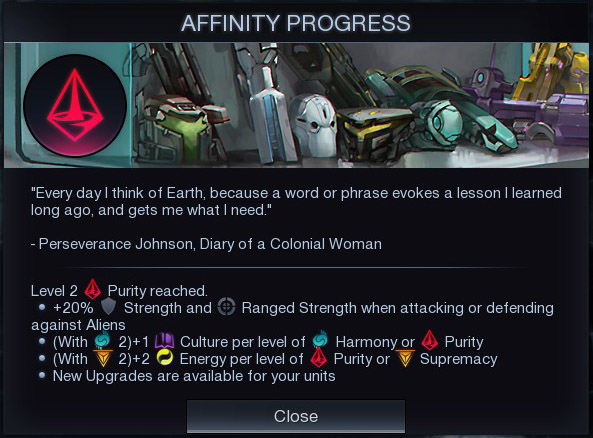 She considered herself, in the end, loyal to ARC. She was a company woman. But she had no problem admitting the Commonwealth had made a fine little home on their continent.  “They have major agricultural operations underway,” Prickett radioed home. “They’ve already put down highways. Hutama certainly hasn’t wasted any time.” Silence. Prickett knew this meant Phan was swearing off the air. “This isn’t a race, Central,” she said. “Isn’t it?” Phan said. A knock at the door interrupted them. Prickett opened it and saw Hutama himself. “Selamat sore, Dr. Prickett,” he said. “Oh!” she said. “You look taller in broadcasts.” The leader of the Commonwealth smiled in return, a brief thing. “I get that a lot. Listen, Penny-” “Dr. Prickett, please.” “-forgive me, I’ve seen too much of ‘Burn the Planet.’ I feel like I’ve already met you.” Hutama’s charm at work. Prickett couldn’t help but smile. Here was the man who had decried the Inflection Point as so much bullshit, then championed the Seeding movement when he saw the wind blowing in the opposite direction. It was ironic to see him as the head man of an interstellar colony. But not surprising. “This won’t be a pleasant meeting, I’m afraid,” Hutama said. “You came here looking for Alberto Zamora? We checked the logs of our mariners. Based on your description, we found out where he went.” He offered her a memory stick. “You’ll want to watch this,” Hutama said. --- “Central, the undersea construction teams are reporting alien activity.” That was fire direction center. The sea dragons are getting curious. What should we do?” Phan watched the videos Prickett had sent. “Central?” 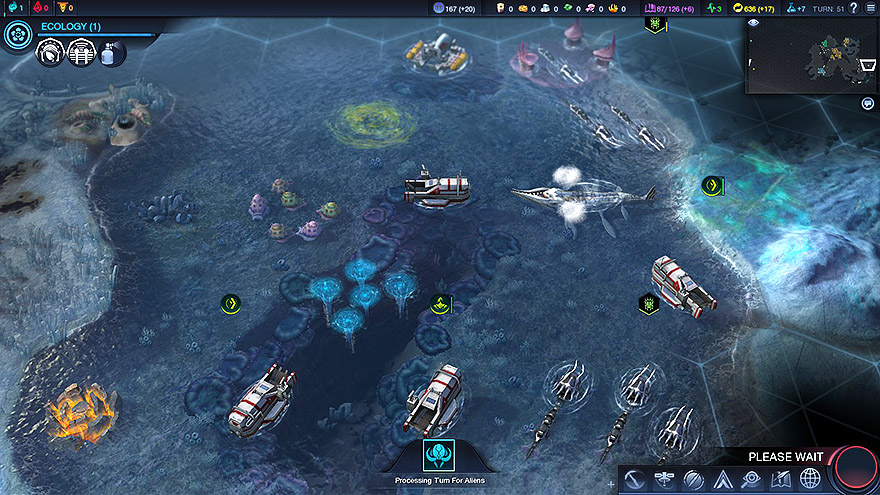 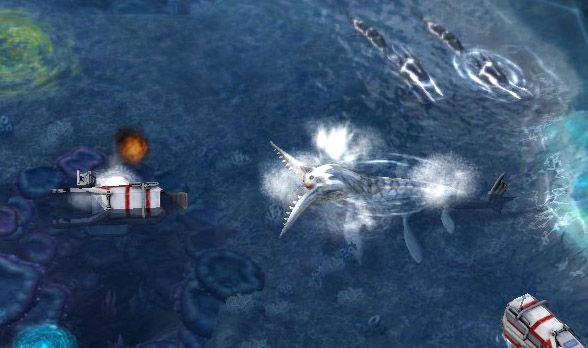 Through console speakers, she heard Zamora’s final screams for help over the radio. She watched the footage of a marine horror capsizing his amphibious craft. “Central, how do you advise?” Phan drew in a breath through her nose. She steadied her hands. “I want you to shoot the sea dragons,” she said, “and I want you to keep shooting until they’re dead.” “Central, do you advise this is a fire mission?” “Kill the loving aliens!” she shouted. 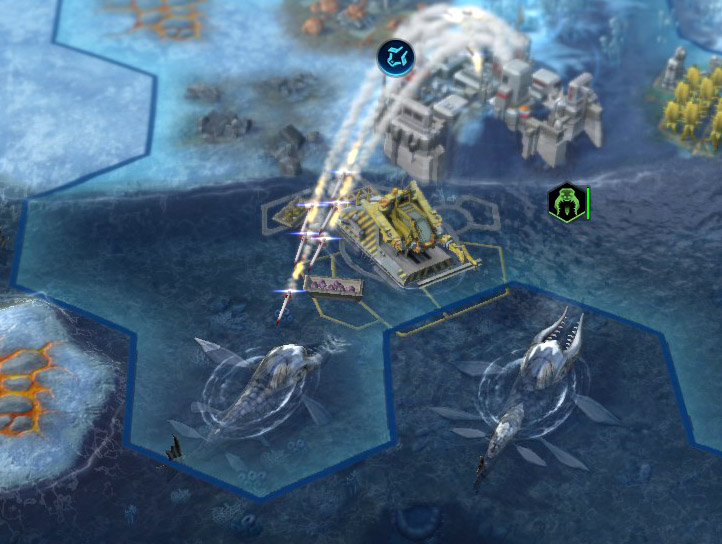 “Fire for effect!” FDC spoke up. “Central, we’re seeing rippers east of-” “They get some too!” Radio discipline had utterly fled Phan Phuong. 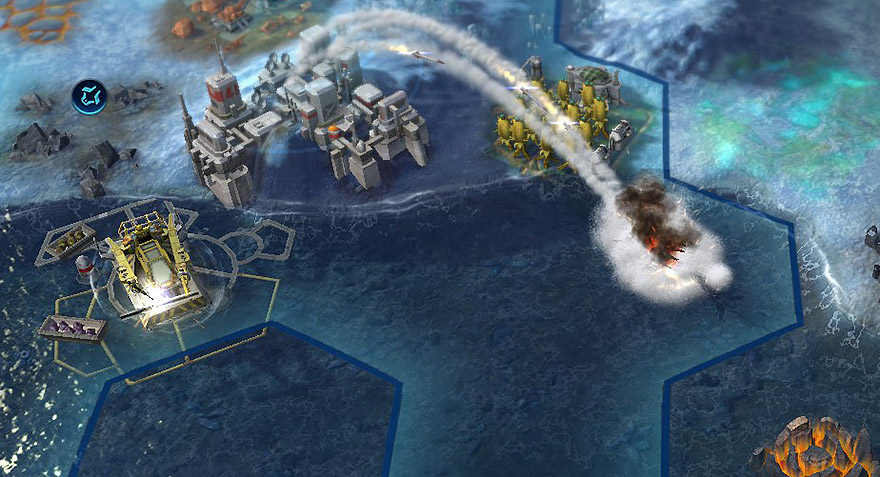 “Welcome to America!” she shouted. --- Phan knew she’d get the third degree from CEO Fielding. The boss lady did not disappoint. After the shouting, they watched the footage of Zamora’s last moments. Fielding and Phan agreed that predatory aquatic aliens posed an immediate threat to human settlements. If ARC had to choose between preserving alien life and guaranteeing the safety of the farmers who would ensure the colony’s survival, well then, E.T. would get a rocket between the eyes. Besides, a colony of only a few thousand gave Phan some job security. In the end, they both knew there was no one else alive in this generation who could handle comms and analysis as well as Phan. She endured a token, public reprimand, but Phan’s outburst quickly became colonial policy. Central’s farmland had to be protected. Outlying habs and coastal workers grew accustomed to the sound of direct-fire barrages. A quiet but incredibly useful new feature of Rising Tide: Workers can put basic tile improvements underwater. I can fill my water tiles with farms or generators for food or energy, and save the land tiles for more fun stuff later. ARC’s science team protested the slaughter, but swam out after the fire missions to autopsy the remains of the aliens. They kept busy while trying to fit the creatures into their understanding of taxonomy. They were the first to see the big one. 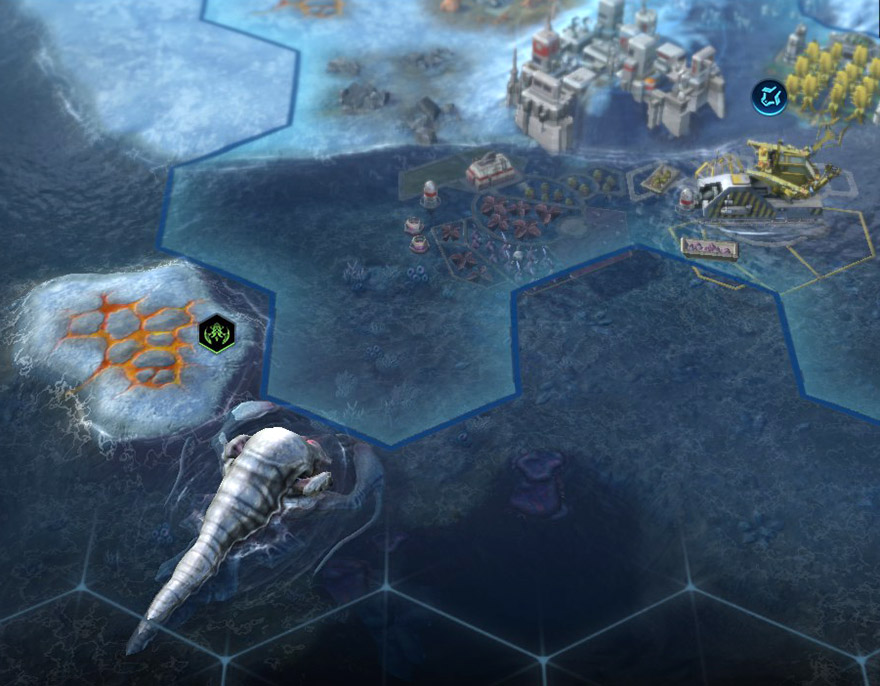 Central drove it away with rocket fire, but did not kill it. Scientists figured it was a decapod, given its claws and shell, but it dwarfed any crustacean man had ever encountered on Old Earth. They called it Astacopsis choanae. Others called it a kaiju. Someone named it Makara, and the name stuck. As the months passed, Makara swam in and out of Central’s range. It was all the colony could talk about. Was Makara intelligent? Was it testing the limits of the settlement’s guns? It swam, watched, and then swam away. Before long, only the coastal workers continued to worry about Makara. The titanic alien stuck to the waters. Sure, it was dangerous work to farm underwater, but no one had actually died. As long as they were safe on land, Makara was just another in a long list of curiosities on Tau Ceti E. It was fine. Then, one day, it wasn’t fine. 
Snollygoster fucked around with this message at 06:12 on Feb 4, 2016 |
|
|
|
There are mid- and late-game systems that let you interact with aliens in interesting ways, but by then you're powerful enough to kill most aliens outright, and so are your opponents. If you go strong into Harmony, you can end up being able to "leash" aliens and put them under your control, or influence the map to make the aliens con as friendly to you instead of neutral. But by then, it's easier for you and the AI to kill all the aliens. In the current build of Beyond Earth, by the time you reach late game, the aliens are functionally extinct. I'd love for Beyond Earth to get one more expansion to sweeten its endgame, like BNW did for Civ V. Rising Tide has a lot of improvements to the base game, but I'd like to see more done with this game before Firaxis moves on to Civ VI.
|
|
|
|
Harmony gets to incorporate aliens into their units, both as xeno-cavalry and designer lifeforms. But the "wild" aliens don't get to do much except suck and die in late game. I bet you could try to mod in "elder" versions of the aliens with better stats that show up late. It wouldn't do much more than extend their nuisance factor with bigger numbers, but it'd be something. That said: early game can be terrifying if you are an aquatic-embark civilization and a kraken starts hanging around your capital. You hold your breath and hope it doesn't juke into a tile improvement, or eat the convoy you spent several turns building, or start taking swipes at the city itself.
|
|
|
|
Part 7: Thinking Outside The Box Historians and xenobiologists would later debate whether or not Makara would have smashed the first ARC settlement. If left unchecked, some argued, maybe the creature would have slipped back into the ocean or wandered farther inland. Others pointed out Makara’s giant claws. Makara was an apex predator, too dangerous to live. 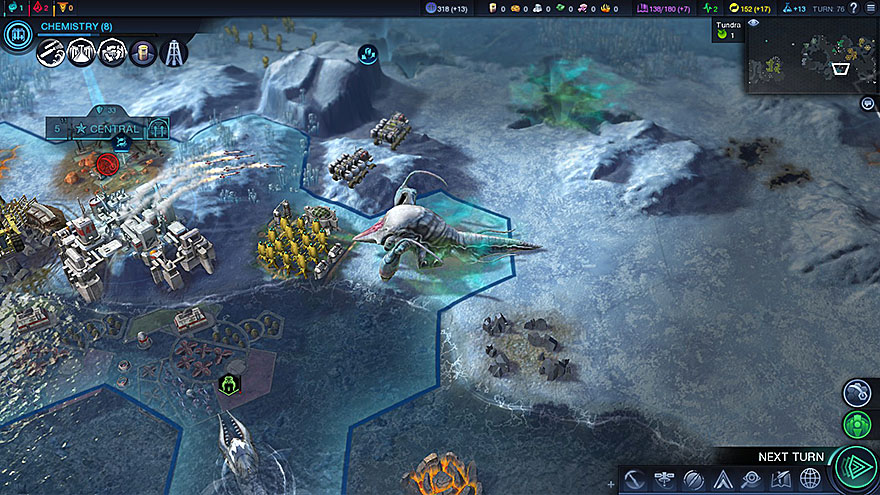 ARC’s security feeds captured Makara’s emergence from the sea, its lumbering, swaying steps from the cold ocean onto land. ARC’s security feeds captured Central’s furious response. 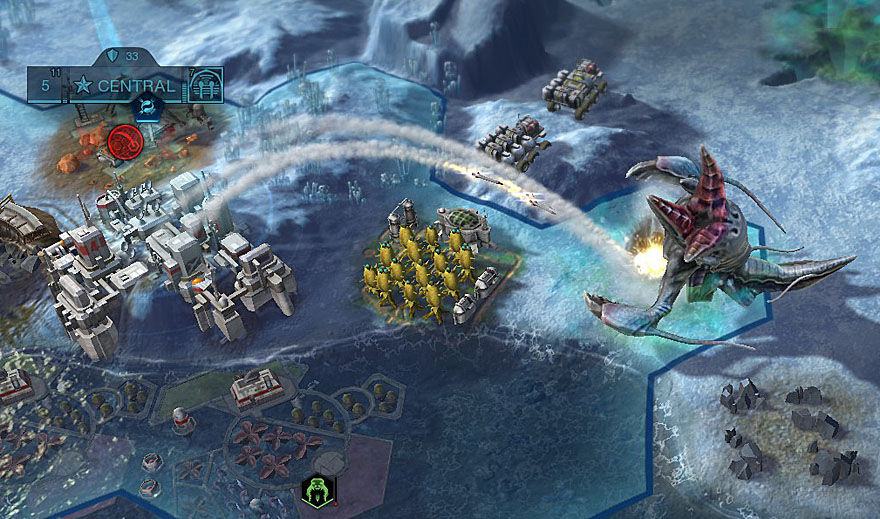 Most of the time, cities can take shots at anything in a two-hex range. My purity affinity bonus gave me just enough of an edge to kill the alien before it could do harm. Makara is twice as strong as my Marines, and it wrecks tile improvements. It might not have destroyed my capital but it could have set me back several turns depending on what it destroyed. ARC had carried munitions 12 light years and hundreds of years across space to fire them into alien life. When the apex predator collapsed from its injuries, Central cheered. By slaying Makara, they had expressed their undeniable will to survive. --- Months passed. Makara had long since been carved into souvenirs and specimens for ARC’s scientific community. Axiom scientific outpost had grown into a small settlement. Dr. Prickett was sailing back from Polystralia and wanted to see how it had progressed. Stone wool insulation from Central’s basalt quarries made the habs a little more bearable. 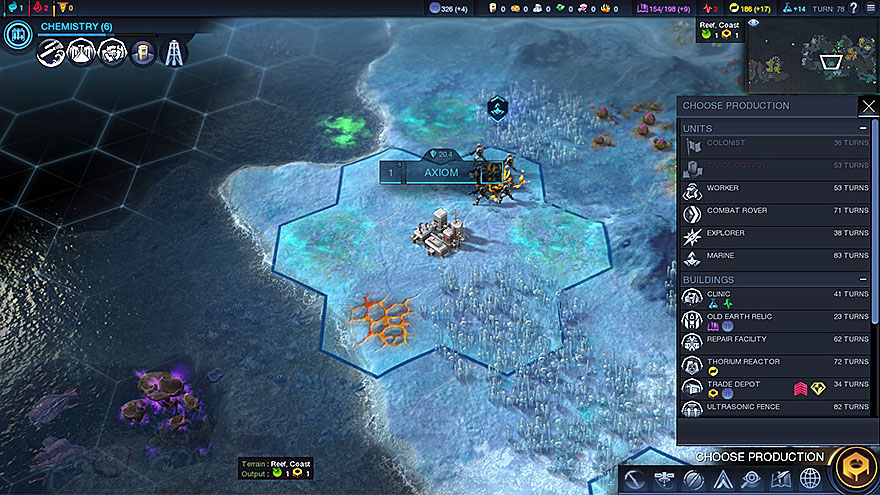 See the red number in the upper right? That’s our Health, and it should be green and a positive number. It’s at -3 right now. Health limits your expansion - the greater your population, the more your Health drops. If you’ve played Civ V, this is the Happiness mechanic with a fresh coat of paint. However, the penalties for negative Health are not terrible, at least until you start getting into double-digit penalties. Unlike Civ V, you don’t eat combat penalties if Health drops to -10 or lower. In Rising Tide, as of the current patch, you can safely ignore negative Health to an extent. You’ll have to in order to keep pace with the AI opponents. Rising Tide gives you several new avenues, through Diplomacy, to counter negative Health, and most of the Virtue trees have unlocks that give you so much Health that it trivializes the mechanic in the late game. But that’s for later. CEO Suzanne Fielding noticed an uptick in sick days taken. The scientists in Axiom took air quality samples and gauged the parts per million of miasma to clean air. The results puzzled them. There were entire regions of Old Earth where the air was no longer breathable. Tau Ceti’s atmosphere was, if not cleaner, then at least unspoiled by industry and war. She brought it up at one of her briefings with Phan Phuong, but didn’t dwell on it for long. The CEO had geopolitics on her mind. “What do you think?” Fielding said, looking up from a displayed map to Phan. 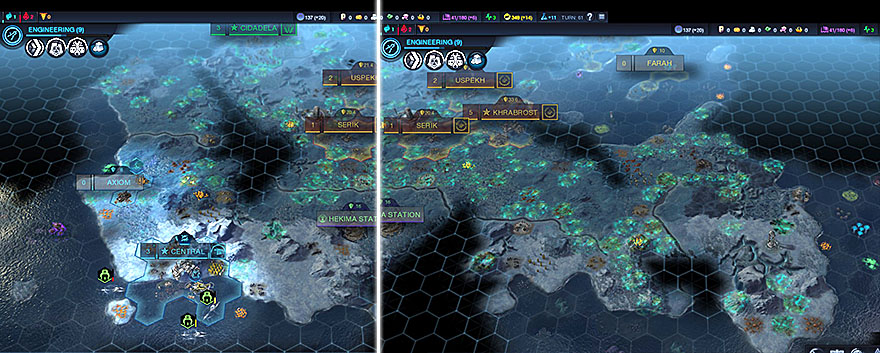 This is our continent. To the west, off-map: Franco-Iberia, across an ocean. To the east, off-map: Polystralia and the Kavithan Protectorate, sharing a continent but with plenty of room for each to grow. “I think…” Phan paused, considered her words. “Our neighbors are thriving.” “Better than ARC, you mean,” Fielding said. “Yes.” “We spared no expense,” Fielding said. She sounded annoyed. “With respect, it’s miraculous we’re here at all. We made assumptions about what life would be like here and packed the seedship accordingly. Some of those assumptions turned out to be correct. After Makara, I’m glad we packed weapons.” “That’s true. But… we can’t eat rockets.” She frowned. “We’re playing catch-up to our neighbors with fundamentals like agriculture. Look how much Kozlov’s spread already.” “Ms. Fielding,” Phan said. “Is this a contest?” Fielding arched an eyebrow. “The American Reclamation Corporation led Old Earth in environmental mitigation, retail and entertainment. As far as I’m aware, we are the only non-state actor with the resources to undertake the Seeding. I will not be satisfied if, after all this effort and sacrifice, we end up as a backwater outpost.” Phan nodded. They needed more territory. But expanding meant planting flags closer to the industrial powerhouse of the Slavic Federation, or at the doorstep of Old Earth’s greatest soldier and his army. She told Fielding as much. “We’ll circle back on this,” Fielding said. “We can’t deal with Brasilia or the SF from a position of military strength, but I won’t be boxed into irrelevance.” Phan nodded, trying not to glance at the Howard Miller longcase clock in Fielding’s office. She heard it kept Central Standard Time back on Old Earth, though she couldn’t imagine how. She had to pick up Tin from career shadowing after this meeting. “I’ve noticed a lot of priority communication coming from Khrabrost,” Phan said. Fielding rolled her eyes and tapped on her computer’s keyboard, showing Phan a glimpse of their communiques. “Vadim Kozlov never seems to sleep. I think he’s trying to pay us compliments.”   In Rising Tide, your neighbors will tell you exactly what they think of you. The diplomatic traits other civilizations purchase govern how you can raise or lower respect with you. Kozlov respects more orbital units in the sky and high rates of energy production. Since we’re getting a good boost from the Solar Collector we picked up, he’s been happy with us. Phan smiled. “And what do you make of the others?” Fielding considered. “We need to know more about Franco-Iberia,” she said. “How they perform will come down to finding out who they share a continent with. Otherwise, if Élodie wants to teach the western canon to wolf beetles? She’s welcome to it.” “Mm-hm.” Phan made some mental notes. “Hutama has been playing nice with us,” she said. “No deals with Polystralia,” Fielding said. “They’re doing fine without us.” They spent a good deal of time talking about trade, specifically with Hekima Station to the east. A few ARC and Brasilian agricultural scientists had set up shop, growing livestock from embryonic material. They were happy to trade meat and leather for supplies. 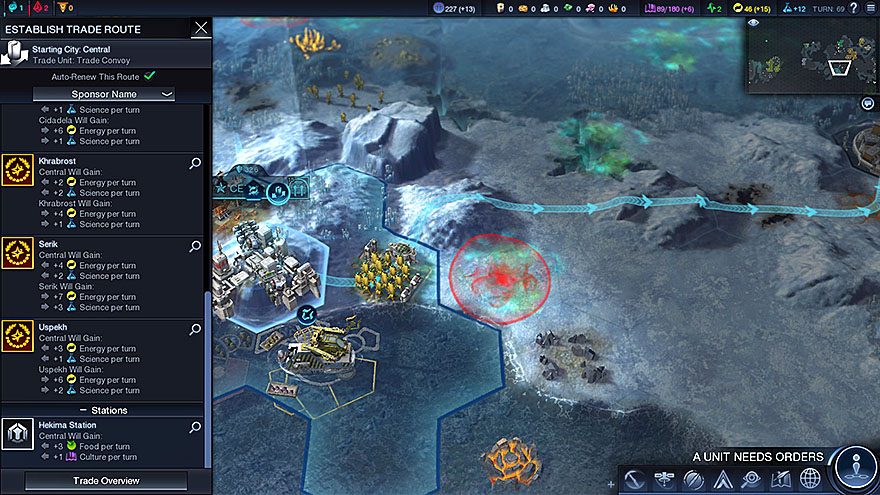 If you played Beyond Earth at release, you know trade was a mess: routes had to be renewed manually. If you played Rising Tide at release, you know domestic trade was vastly better than any other choice you could make. The most recent patch tamped down on domestic trade yields, but they’re still a good choice. We can trade with the Slavic Federation, but as you can see, they would get more out of the deal than we would. Hekima Station will boost Central’s growth with food, and over time the station will level up and give us more food and culture. --- Phan was saying her goodbyes when Fielding’s computer chirped an incoming message. Fielding held up a finger and Phan gritted her teeth -- by now, the doctors must be tired of answering a little boy’s questions while they ran blood work and treated coughs. Then Fielding laughed. Phan had never heard Suzanne Fielding let out anything more boisterous than a diplomatic chuckle during broadcast interviews. “Phuong, please come here. I really think you’ll like this.” Phan crossed over to Fielding’s computer. The CEO grinned. “Our explorers found Franco-Iberia’s neighbor to their north.” 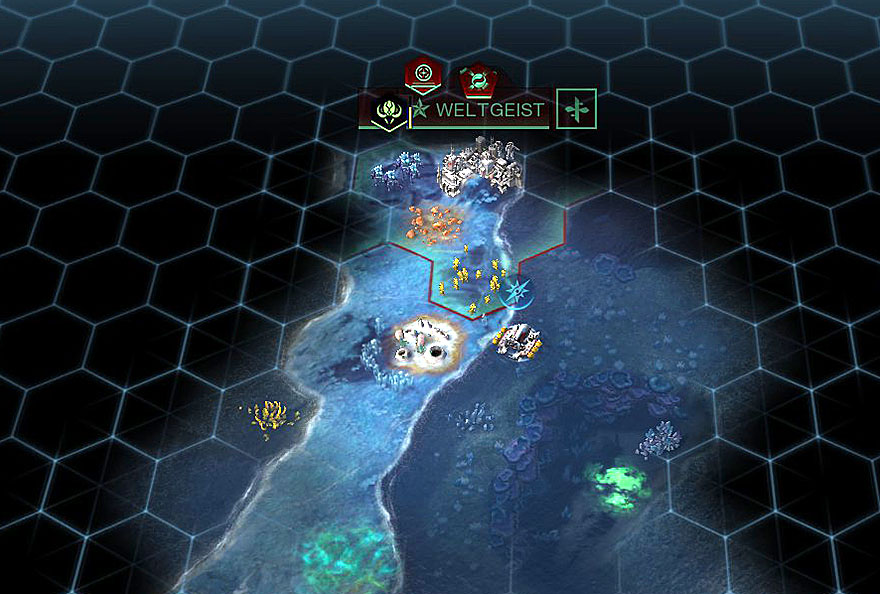 Phan read the transcript. “Willkommen in Weltgeist,” she said. She covered her mouth with her hands. “You can’t be serious.” Fielding laughed again. “Élodie came all this way, and Lena Ebner is her next-door neighbor.” 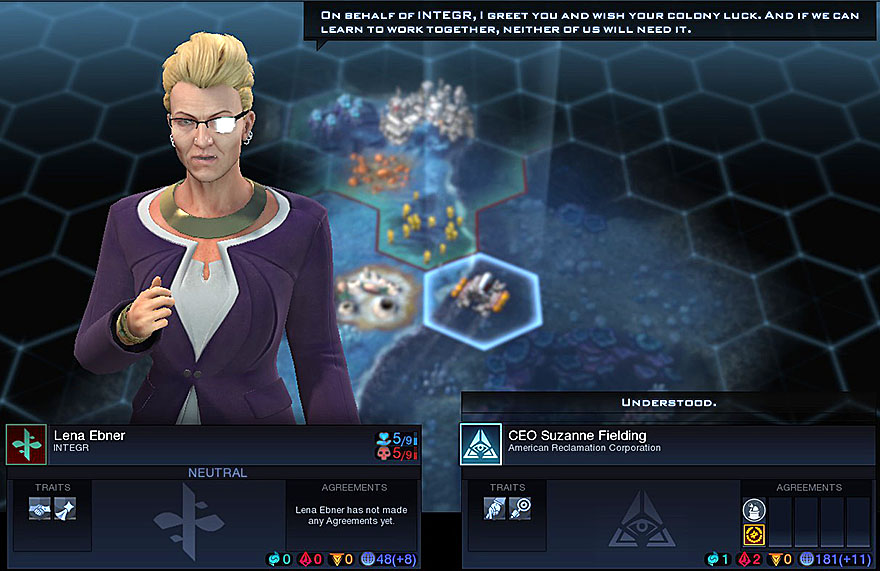 The two women laughed to the point of tears. Élodie and Lena, together again, neighbors for the rest of their lives. It was cosmic irony. It was absolutely delicious. Élodie and Lena Ebner hate each other. If you’re playing one, and encounter the other, get ready for a banquet of passive aggression in unique dialogue. Phan said her goodbyes, then traveled through Central’s concourse to pick up her son. She saw the spiderwebbed impact marks on the glass to the medical center’s door, and her heart turned into a brick. She threw open the door and found Phan Tin, his little face smudged with tear streaks, hands bloodied. The doctors looked up to her with pinched faces. One doctor, his mentor, sported a hand wrapped in blood-stained gauze. 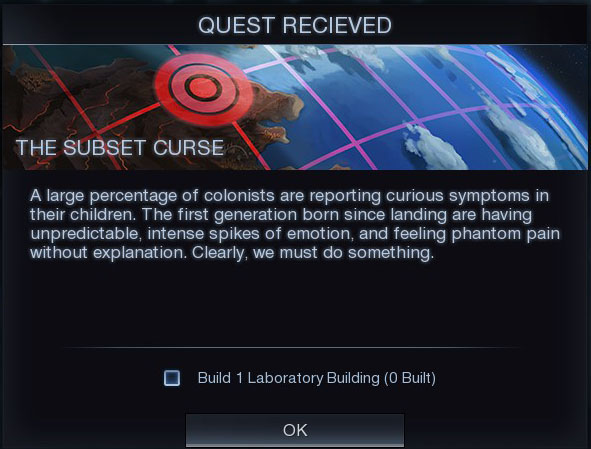 In the weeks to come, Phan came to understand she was not alone. A handful of parents had reported savage mood swings and bouts of inexplicable pain in children of a certain age. Phan made sure to delete emails between parents with children stricken with the syndrome. ARC’s colony was too small to lose everything to panic. Phan confessed her own terror to Fielding. Was there some overlooked element of Tau Ceti E that rejected humanity? Were they doomed to grow old and die on a frigid exoplanet, their offspring incurably unstable? “We’ll make this a priority, Phuong,” Fielding had said, putting her hand on Phan’s shoulder. “I promise you that.” --- Gunfire alerted Axiom’s scientists to their new neighbors. 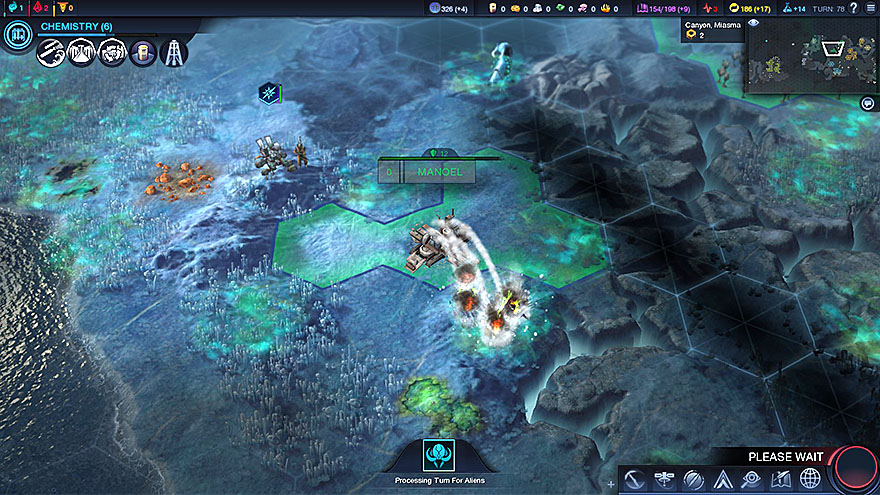 They trained telescopes on Brasilia’s settlement, recording their engagement with one of the wolf beetle swarms endemic to the region. Rejinaldo de Alencar’s men and women held the aliens at bay and shredded them with ripsaw bursts of munitions from behind sandbags and steel palisades. Brasilia was expanding, and the people of Manoel would not be driven away. --- “Rejinaldo is crowding us off the continent,” Fielding said at another meeting with Phan. “He and Vadim are backing us into a corner. We don’t have enough guns to discourage them.” “Would it really come to that?” Phan said. “Would you start the first war on the soil of an exoplanet?” Fielding paused. “We can’t,” she said. “Can’t, or won’t?” Phan said. “Point blank, Ms. Fielding, are we going to go down the road to a second Great Mistake?” “Don’t be dramatic, Phuong,” Fielding said. “It’s academic. A territory war with Brasilia doesn’t play to our strengths.” The two stared at each other in heavy silence, each evaluating the other. Fielding, once the most powerful woman in the most powerful corporation on Old Earth, blew out a sigh. “They’re driving us into the sea,” Fielding said. Phan blinked. “So… let’s go there.” “What?” “Can we build an ARK?” Phan said. “Like Duncan Hughes.” Fielding recoiled. “That is a clear admission of defeat. The NSA built floating cities because they had nowhere else to go. America never needed to build ARKs.” “Think about it, Ms. Fielding,” Phan said. “A naval outpost would put the southern sea into play. We still have room to grow.” “I love your passion,” Fielding said, “but it’s a terrible idea. It’s a bad look for us, full stop.” --- Phan laid in her bed. She stared at her meeting calendar. She thought about her son. The screen cast her face in pale blue light. A notification popped into view. A message from CEO Fielding. “I changed my mind,” it read. --- They had the technology. Until now, no Americans ever needed to make use of it. They just crowded inland. But there was a first time for everything. The colonists sailed south until they found whorls of soupy xenomass churning in the sea. They withdrew to a safe distance and built. 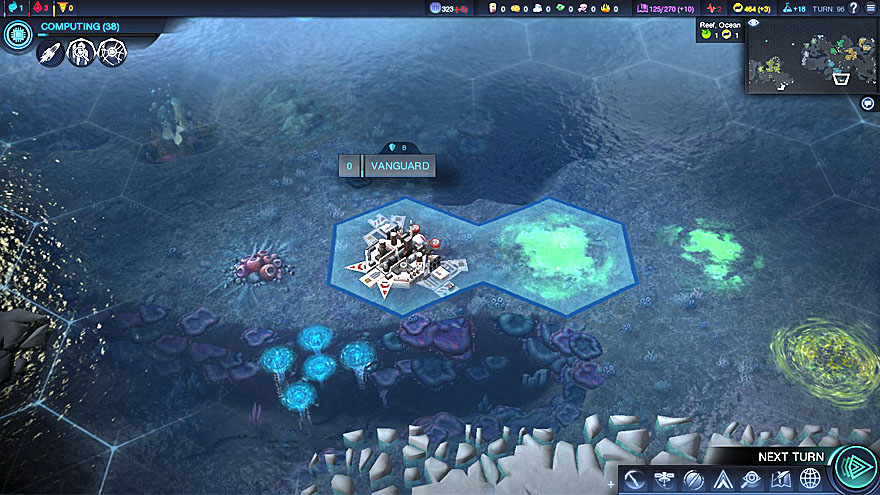 Out on the open sea, there was still a chance for ARC to expand without antagonizing their well-armed neighbors. The settlers of Vanguard believed this, even as Fielding opened another priority communication from the Slavic Federation. 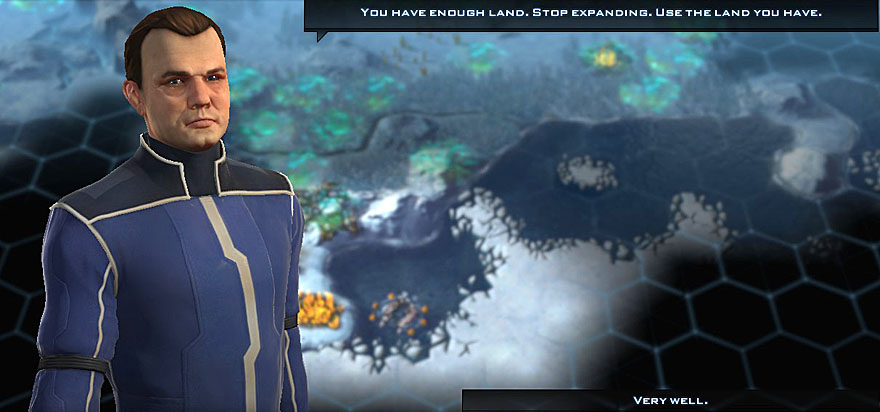
|
|
|
|
Pittsburgh Lambic posted:Did the Americas get absolutely hosed to pieces during the Great Mistake? Europe was mentioned as taking in a lot of refugees from the Americas in one of the linked articles, and ARC's full name is a bit ominous. The game is deliberately vague about the Great Mistake. At (I think) the first Firaxicon the devs left the specifics up to the player, but suggested a nuclear exchange in Asia would fulfill the conditions of radical climate change, mass migrations and strife. North America seems to have gotten wrecked by climate change and environmental damage, and ARC made mitigation of that damage its wheelhouse. South America saw heavy flooding of the Amazon basin, but the game's fiction says its manufacturing base survived enough so that the powers there could sell their services and eventually project their military force out as globocops. The devs admitted that probably the biggest reach of the reordering of political boundaries was that India and Pakistan would set aside their differences to become part of the Kavithan Protectorate.
|
|
|
|
RedMagus posted:I'd love to know what the mechanics are for when the AI sends you messages like that. How does the AI determine what they consider "their land" vs "your land" before you start getting negatives like "they covet your territory" and such? The higher level of difficulty you choose, the more covetous your neighbors become. I thought I could get away with an offshore expansion but like Cythereal said, Kozlov can be a prick. You have to watch out for Hutama too. He'll call you out, then keep feeding you compliments and deal offers, and suddenly he rolls up on you with a doom stack and declares war.
|
|
|
|
FredMSloniker posted:As Cythereal says, the game has an optimistic tone, and that even comes across in wearefucked.pdf. In Alpha Centauri, you aren't even sure humanity on Earth survives long enough for the Unity to reach Alpha Centauri, much less long enough for them to tech up to being able to go back. In Beyond Earth, by contrast, the Inflection Point isn't 'the end of humanity' or even 'society collapses'. It's 'we can no longer afford to leave Earth'. And conditions on Earth are bad when the Purity/Supremacy victory happens, but not 'subsistence farming' or 'eating our young' or anything. It's entirely possible that, even without the intervention of the colonists, Earth society would recover, or at least stabilize. They're just helping it along. Someone do a companion LP to this and play Fate of the World on the "survive 200 years" difficulty to see how Earth does without us. Energy scarcity and the end of petrochemicals are going to be a bitch. We're stuck with renewables. Silicon Valley and the aviation industry probably can't run on sunlight alone. I don't know enough about the agriculture industry to do back-of-the-envelope math on how much oil it consumes, but I bet it takes a hit, too. We'll survive, but there will be war and famine, to say nothing of what Earth's weather patterns will be like with an atmosphere warm enough to raise the sea level several meters. I figure after a few centuries of this, Earth would greet even Supremacy invaders like this: https://www.youtube.com/watch?v=rYE84KgOPXY
|
|
|
|
Part 8: An Exciting New Career Opportunity “I think,” Phan Phuong said to her boss, “you didn’t take into account a need for diversity when you staffed the seedship.” Suzanne Fielding leaned forward in her chair, narrowing her eyes. Her longcase clock ticked out the seconds. “Excuse you?” Fielding said. “I’m not talking about ethnic diversity,” Phan said. “But the committees who picked us were ableist. You picked people without physical or mental disability, as though we could leave those things behind on Old Earth.” She couldn’t keep a note of accusation out of her voice. “We’re starting a new colony on an exoplanet, Phuong,” Fielding said. “Why would I staff a seedship with people who can’t pull their weight?” “Because none of us are going to be healthy forever, Ms. Fielding. I’ve heard a miner can’t walk after an accident at the quarry. Did you know Central isn’t handicap-accessible?” “That’s-” Fielding opened her mouth, then closed it. She hissed a sigh through her nose. “You’re upset about your son, aren’t you,” she said. Phan pinched the bridge of her nose. “I’m… not going to blame you. But I am upset. He wanted to be a doctor so badly. Now they just run tests on him and the others with… whatever it is.” --- Weeks later, Phan and Fielding found out what “it” was. 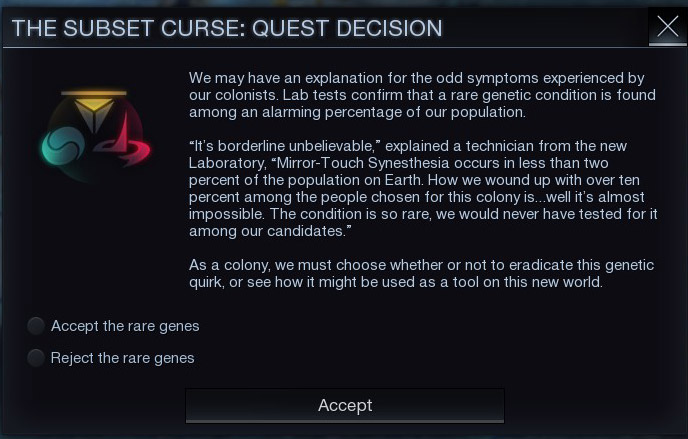 At last, the monster had a name and an explanation. Phan and her son read all they could about mirror-touch synesthesia. Central’s medical team told the CEO they might be able to suppress the gene in future generations. Fielding considered this. She made sure word of the meeting did not reach Phan. 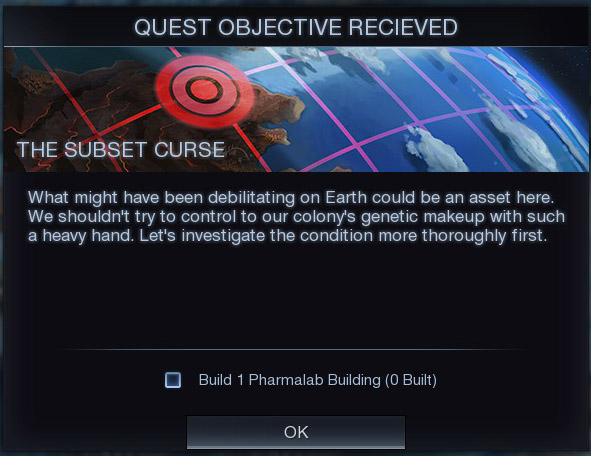 --- Phan Tin took to shadowing ARC’s astronomers and their Slavic Federation consultants. He didn’t want to be an astronomer. Thanks to a battery of antidepressants and sedatives, he didn’t want to do much of anything at all. He watched them take stock of the Tau Ceti system. The going was slow, as they had nothing like the infrastructure they needed to catalogue their celestial neighbors with the exhaustive completeness they took for granted on Old Earth. They let Tin adjust and observe a small orrery. “It doesn’t have any sharp edges,” they said, when they thought he couldn’t hear. Tin heard a lot. He could speak four languages, though he did not have much cause to practice his Vietnamese outside of his family. He heard the Federation scientists joke about the bodged-together ancillary crap on ARC’s solar collector satellite. The patent inferiority of ARC’s orbital resources amused them. Tin heard the friendly rivalry turn sour when the satellite’s orbit began to decay. The ARC team said they got bad advice from the Federation observers. The Federation team said ARC should obviously go to Lena Ebner and beg INTEGR for a second solar collector, since they happened on the first one only by pure, poo poo-assed luck. The satellite drifted out of position in a matter of weeks. The loss of energy threw off ARC’s financials by hundreds of thousands of kilowatt-hour dollars. Fielding wanted to know why. Tin, teenaged and gangly, all elbows, hugged his elbows to his chest in a corner while budget analysts, scientists, and Slavic Federation observers shouted at each other in English, Spanish and Russian. He felt their anger spin through the room like a curse on a prayer wheel. It spun through him “Stop it,” he said. “Stop it!” They didn’t hear him, and took no notice of him until he had picked up the orrery and smashed it against a wall. Tin didn’t want to be an astronomer anyway. --- The inhabitants of Vanguard Outpost felt vulnerable in a way they had not since the very first days after planetfall. The alien ground under Central was still, in the end, ground. What if a massive storm capsized the outpost? What if some pelagic monster mistook the outpost’s shadow for prey? What if there was a second Makara? What if there was something worse than Makara? The presence of cutter ships from Central comforted them. The ships’ marines hunted the rippers around Vanguard, first for survival, then for food and sport. They argued endlessly with ARC’s xenobiologists over whether or not they should destroy the rippers’ nesting grounds. 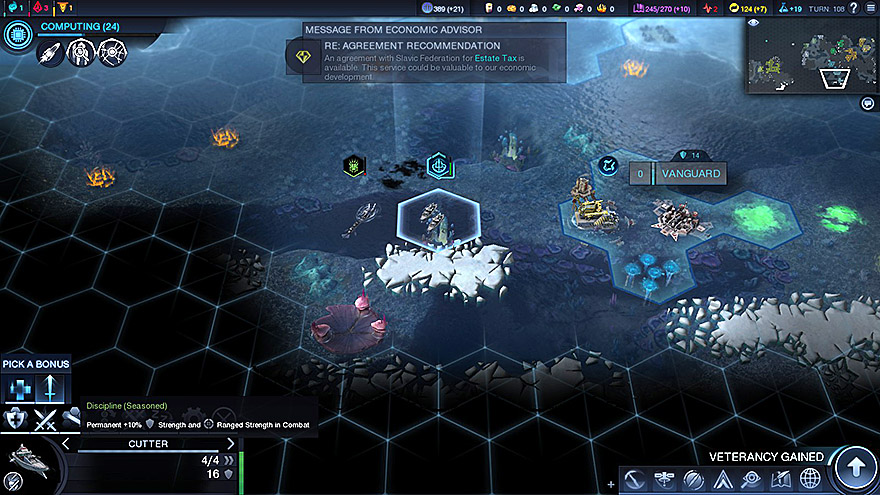 Water cities do not generate as much negative health as land cities, and generate more culture points. However, they have low hit points relative to land cities and can be more expensive to defend. They do not “naturally” claim a spread of tiles around the city like their counterparts on the land. You can do this by setting a production order to “move” the city in a direction. When the city moves, it paints the tiles adjacent to its new position. IMO it’s easier in mid- to late-game to just buy tiles outright with banked energy. More of ARC’s industrial resources poured into defense forces. In the years following the Makara incident, many in the corporation wanted to hunt aliens. Even a few of ARC’s second generation, old enough to remember Makara, wanted to keep their parents and neighbors safe from monsters. No one dared to breathe the idea of turning their rifles and rockets against human targets. Phan forbade her son outright from joining ARC’s defense force. Not that the defense committee would have him, or any of the other children and teens burdened with mirror-touch synesthesia. Tin spent joyless months with fungus and tuber farmers, far away from heavy machinery. His mother spent joyless months conferring with CEO Fielding over the messages they received from the leaders of other colonies.    Often, the first diplomatic tipping point comes when your solar collector’s orbit decays. You’re nearly guaranteed a solar collector in a capsule in the early game. The energy production and orbital presence give you a monetary boost as well as a measure of respect in the eyes of people like Vadim Kozlov. The Slavic Federation respects the accumulation of energy and the presence of satellites. We’re short on both now, and Kozlov is already angry with us for making a third settlement. Phan heard a great deal from Vanguard. Thanks to the mines near Central, ARC had finally built its computing infrastructure back to an Old Earth standard. Wireless transmissions threaded between personal computers and mobile devices, between Central, Axiom and Vanguard. After centuries in the void between stars and years of toil and scarcity, ARC reinstated its social network platform. 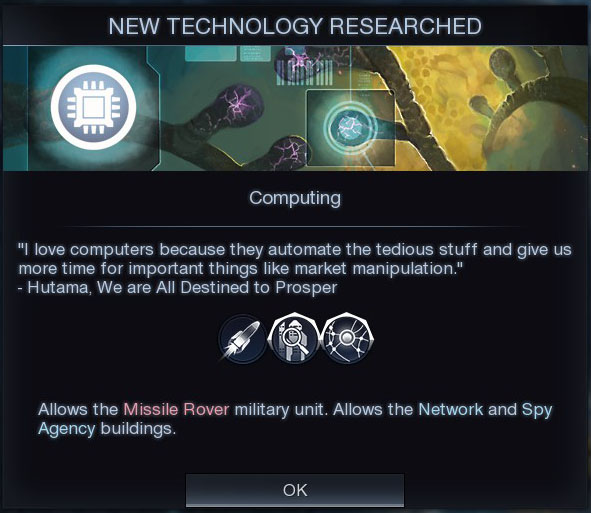 Children cracked jokes about their parents' dependency on social feeds. For the first time in history, parents were social media natives, and their children were not. The first generation sank back into the habit after years of privation. They formed nostalgia groups, shared old photos, started new feuds. Phan bathed in a stream of data in her bed, pillow under her chin, tablet in hand. Her husband had long since fallen asleep. ARC’s financial team accounted for the sick days and injuries in the colonies, but were alarmed to discover they matched and often exceeded the poor health indicators of the worst parts of North America. No one had an easy answer. Maybe it was the shock of life on a new world. It could be trace elements of miasma in the atmosphere, taking its toll in the long run. Scientists checked alien plants and animal meat for microbes and archaean prions they might have otherwise missed. It certainly didn’t help matters that Brasilia had started exporting cigarettes. ARC’s young synesthetes were especially susceptible around smokers. Phan blinked, rubbed her eyes. She heard shuffling footfalls. Tin came into her room, smiling, bleary-eyed. “Mom,” he said. “I want to make a show about ARC’s fungus farmers.” “I’m sorry?” she said. “I’m going to call it ‘Lichen Subscribe.’” “Go to sleep, Tin.” Phan turned to her tablet and made a note to change Tin’s medication. --- The glory of wireless data saturation ignited the social and romantic lives of ARC’s colonists, but failed entirely to curb the proliferation of poor health. Phan was horrified to learn that a few parents of mirror-touch synesthetes had resorted to the pre-Mistake barbarism of crowd-sourcing for treatment funds, cashing in social capital for medical resources. ARC was not thriving, and that was the grim truth. It galled Fielding to no end to call on the Kavithans to help them set up a central health authority. The admission telegraphed the corporation’s failure to keep its employees safe and healthy. It was not on message. But the CEO knew when ARC needed help.  Diplomacy can be a quick bandage for early- and mid-game problems. My deal with Kavitha gets me down to -9 unhealth. Kozlov did not hesitate to decry the American Reclamation Corporation’s basic inhumanity to its constituents. The unassailable multi-national corporation was a mistake of Old Earth. It was fitting, he said, that it should founder on the rocks of a new world. A business cannot govern. A government run like a business is madness. 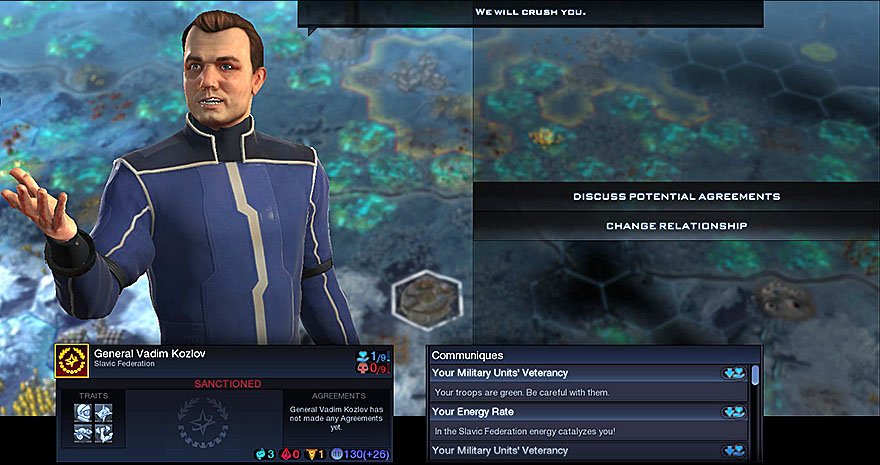 The nascent international community of Tau Ceti E considered Kozlov an elitist crank, but they stopped short of disagreeing with him. Hutama had only praise for Fielding and ARC, but he broadcast images of the Polystralian settlements as lands of green and plenty. While ARC wheezed on its own fumes, the Commonwealth of the Pacific made beautiful things for their own sake.  First wonder goes to Hutama! The Stellar Codex adds +8 to the host city’s orbital coverage radius. Wonders also give you political capital points. It’s a good early-game wonder if you want to play around with satellites, but satellites are honestly icing on the cake in Beyond Earth. More than anything, this shows the head of steam a civilization like Polystralia can build if it’s left alone with most of a continent to stretch its legs. Tin begged to sail off to see the Stellar Codex. His parents refused. Their neighbors heard the screaming match through their hab’s insulated bulkheads. Tin couldn’t work. He sat in his room, scrolling through social media feeds, taking heavier doses of suppressants, submitting to more and more bloodwork. He watched his parents’ marriage fray by degrees. He made friends with the other synesthetes, all of them young and drugged into near-torpor, paralyzed with despair. They needed a reason to live. A week before his 23rd birthday, scientists in Vanguard derived a psychoactive drug from jelly-stalks and canopy worms. The jelly-stalks came from ripper nests, but no one mourned the loss of a spawning ground for aggressive oceanic predators. 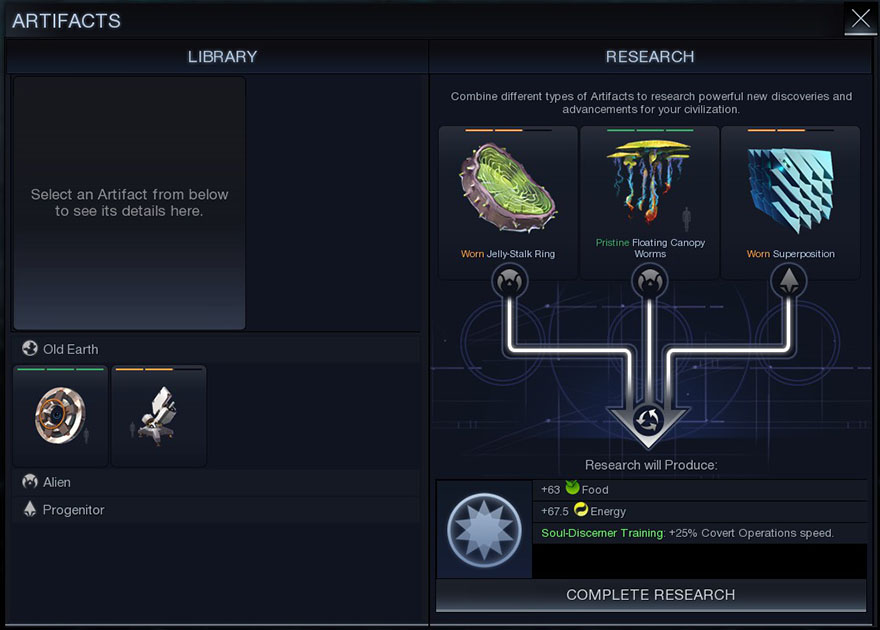 We got another alien artifact from destroying the nest by Vanguard. Let’s mix and match our artifacts and see what we get… what’s this? ARC scientists had labored for years to understand the solidified quantum superpositions Dr. Penny Prickett had pulled from an undersea Progenitor ruin. They had rigged a machine interface to observe the superposition, to no use. The scientists wondered if they might have some greater understanding of the quantum wonder if they were stoned to the gills. They wondered what would happen if a mirror-touch synesthete took the alien-derived drug and studied the superposition. 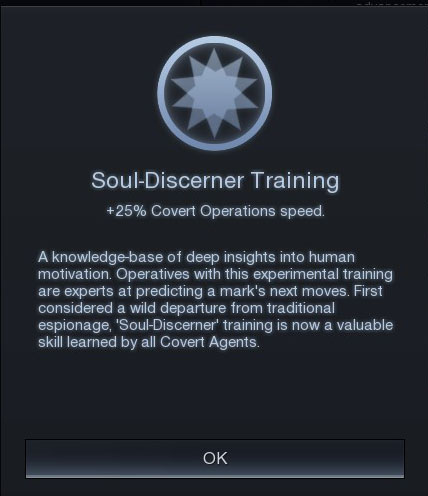 Oh yes. A few months later, a pharmalab in Axiom, working with a team of psychiatric advisers, reached a greater understanding of the mirror-touch syndrome. The gene therapy they developed did not destroy the syndrome. The treatment tempered the way mirror-touch synesthesia expressed itself, changed it somehow. They needed to find how. 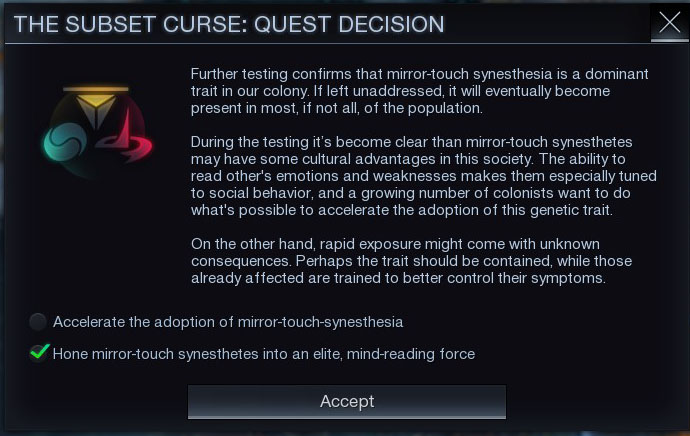 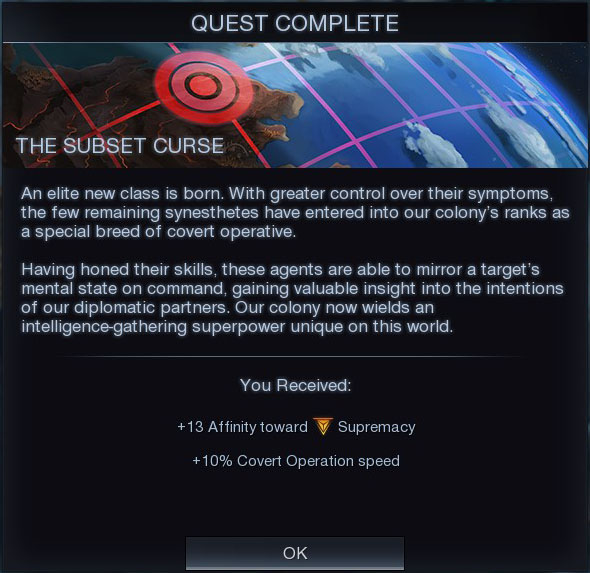 Oh yes indeed. --- Fielding stared at her reflection in the glass of the longcase clock in her office. ARC’s colonies risked their own inflection point, a bending of the curve into illness and political irrelevance. She had spared no expense. She had planned for everything and compensated where she could. ARC was not thriving, not like her neighbors. She needed to know why. She needed to know how the others thrived. 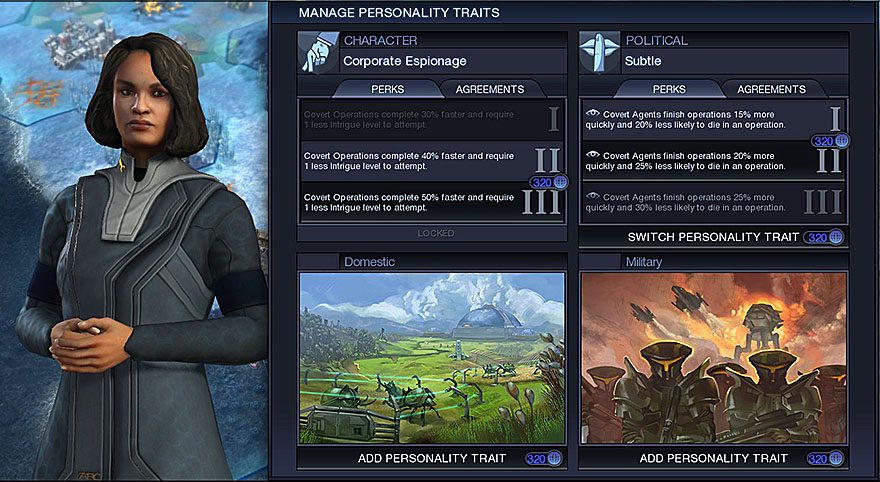 OH YES I’ve sat on my diplomatic capital for a good long time, amassing more than 700 points of it. Here’s why. Remember the political trait that gave me a science bonus for active agreements? I swapped it out with Subtle, giving me +15 percent speed to covert operations and an increased chance of surviving the operations. I juiced up my faction bonus to its second tier, granting me +40 percent speed. This stacks with the bonuses I received from The Subset Curse and Soul-Discerner Training. poo poo is about to get real. --- Tin looked up at the men and women in dark suits who had entered their hab. He saw his mother behind them, over their shoulders, her expression unreadable -- even to him. He could tell something excited the strangers. He felt an echo of their energy under the fog of suppressants. “Tin,” one of the men said, “I believe we have a job you can do.”
|
|
|
|
Glazius posted:Dang. So how much of this lean to covert ops was intended and how much is just taking advantage of random events? I was always going to go heavy into covert ops, thanks to the Subtle diplomatic trait and the ability to improve ARC's starting espionage bonus. Soul-Discerner Training and the Subset Curse quest came as surprises and pushed my covert ops edge from "incredible" to "holy poo poo lmao." I wasn't kidding when I said Artifact rewards were better than many Wonders you could build. I was hoping for something like Warp Spire, which increases yields by 50 percent for domestic trade, or Drone Command, which lets you work an additional two tiles around your city beyond your total number of citizens. What I got instead was so much better. Klingon w Bowl Cut posted:I actually have this game, and have been considering LPing it for a while, so I may actually do just this. Spoiler: you will probably come back to a boiling wasteland. Thank you very much! Let us know if you pull the trigger on LPing that game. I have never, ever been able to finish Fate of the World's 200-year scenario. I can win the 100-year game, but everyone ends up poor and India turns into the Krogan homeworld.
|
|
|
|
The next update is going to be a few days late: a bad storm ruined my swamp internet and it'll take a few days for a technician to come and fix it.
|
|
|
|
Part 9: Thinkfluencers “Tin! How’re you doing, son?” Phan Tin paused in Central’s concourse at the sound of Martin Ballarin’s voice. The ARCadia executive closed the distance between them, out of breath. Ballarin had put on weight from the strain of managing ARC’s trade between burgeoning colonies. “I’m well, Mr. Ballarin,” Tin said, and he meant it. “How’s your mother?” (Thank God you found a job. Your parents’ marriage was hanging by a thread.) “She’s fine, Mr. Ballarin.” Tin’s smile flickered. He flicked his eyes away from Ballarin’s face to an ARC logo on an advertisement. The stylized Eye of Providence in the center seemed to stare back at him. “She’s been in a lot of meetings. I would imagine they have something to do with the latest from Khrabrost.” 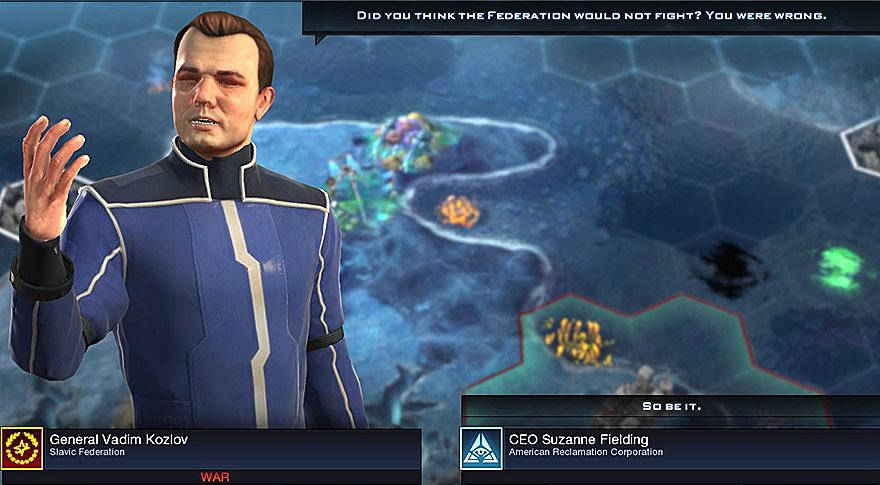 “I can imagine,” Ballarin said. “I’ve got a conference call about it in two hours. Thank your lucky stars you don’t have to sit in on it.” (We’re one epidemic away from a collapse. If Vadim Kozlov wants us dead, there’s not much we could do about it.) Tin gave Ballarin a commiserating nod. “It’s not all bad, Mr. Ballarin. I saw the release about the contract with Keagungan.” That won a small smile from the older man. “As long as Franco-Iberia and INTEGR let us sail through to Keagungan’s skunkworks, I think we’ll have a sustainable relationship. They’ve sent over some incredible tech demos.” Ballarin gave a sage nod. Tin planted his feet against the river of anxiety flowing from ARCadia’s head honcho. Keagungan is Malay for “greatness.” It is an applied sciences skunkworks that makes autonomous, domestic systems and converts military tech to civilian use. This information is buried in the game’s code, but is nowhere to be found when you play, even in the Civilopedia. In game terms, a trade route with Keagungan gets you Culture and Science points. “I’ve didn’t want to keep you, Tin. Just wanted to say hello. Tell your mom I said hello, OK?” (Whatever you’re taking, I hope you stick to it. You seem almost normal.) “OK, I will, Mr. Ballarin.” Tin showed his teeth to Ballarin in a farewell and went on his way, down a side corridor, down another, into an older section of the habs, cordoned off for renovations. Security staff pretended not to watch. Amazing that Tin’s parents spent the founding years in sardine cans like this, he thought. He closed a metal door behind him. He turned off the lights and logged into a computer on his desk. This machine, he was told, came from Old Earth. He leaned in toward a lens on the machine, let it scan his eyes. He cleared his throat. “Archangel,” he said, into a microphone. Access granted. ARC’s first spymaster leaned back in his chair and went to work. --- 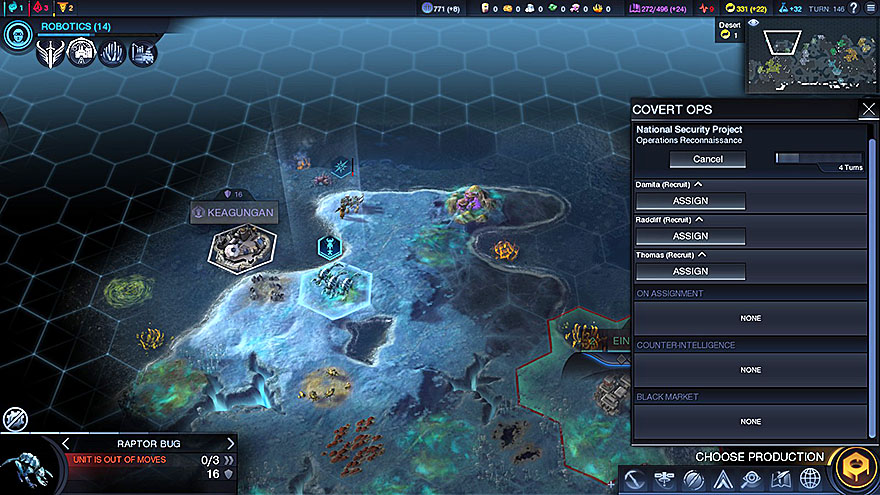 In Beyond Earth, the spy agency building unlocks after you research Computing. You start with three agents. These can either sit in your own cities for counter-intelligence, stay at HQ to boost a national security project (one of a small list of buffs to your field agents, your overall Health score, or similar things), or to travel to foreign cities to spy on them. In truth, you can win Beyond Earth by ignoring espionage, unless you’re playing a multiplayer game against someone who knows how to abuse it. --- “With respect, Ms. Fielding, you’re taking a cavalier attitude with the Slavic Federation. It puts my employees at risk.” Ballarin’s face was one of several on the display in CEO Suzanne Fielding’s office. One of many pinched, worried faces. “I understand that, Martin. Consider also: Within recent weeks, Kozlov also declared war on the colonies of Brasilia, INTEGR and Franco-Iberia. We’re in good company. Cold war is an American and Slavic tradition, after all.” That won her some nervous chuckles from the others. Not from Ballarin. “I’m glad you think this is funny, Ms. Fielding,” he said. “It’s my employees out there in convoys. I won’t have them shot and killed because Kozlov thinks he can run a railroad better than ARC.” “If Kozlov escalates this into physical violence against our convoys, then he will have crossed a line and ARC will make an appropriate response,” Fielding said. “My employees are not a trip wire!” Ballarin shouted. “Ultrasonics scare off aliens, but they won’t stop bullets.” “Please trust me, Martin,” Fielding said. Her face and voice projected out to a dozen displays throughout ARC’s colonies, to administrators and vice presidents and task force leaders. They heard the frost in Fielding’s voice. The words came out as an order. When I said Kozlov is belligerent, I meant it. Administrator Penny Prickett gave her report, the Firaxite Will Solve All Of Our Problems portion of every conference call. The other participants didn’t bother to hide rolling their eyes. Axiom was on the verge of a breakthrough with the polycrystal. When properly cut, her researchers found the stuff could function in small quantities as a superconductor that required only a cursory amount of cooling. Prickett’s firaxite evangelism had two basic problems: first, it was a time-intensive project, and Axiom spent a prohibitive amount of time laying down infrastructure, roads and farmland around the settlement, doing the unglamorous work of surviving ARC’s frigid new home. The second problem, the conference members decided, was that firaxite could not cure the sick, nor fill warheads aimed at Khrabrost. 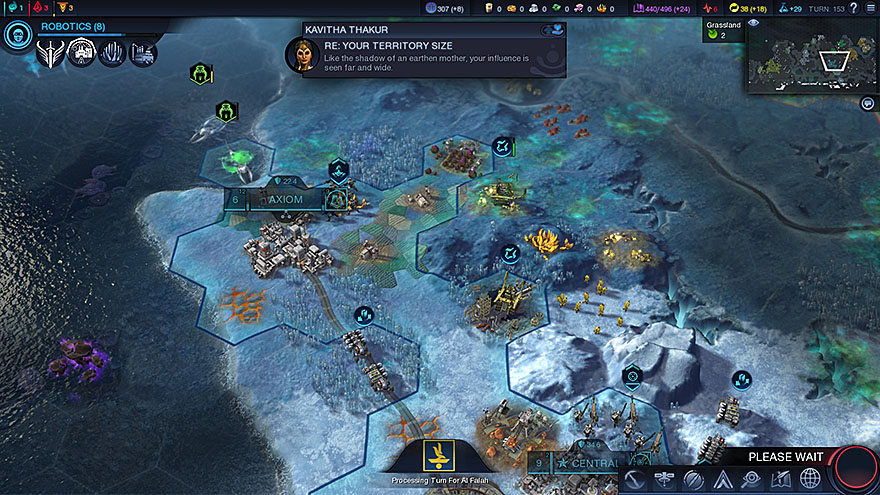 Of note: the worker in the center of our territory between Central and Axiom is building a petroleum well on an oil deposit. Mankind, its seems, cannot escape the need for petrochemicals and plastics. In Beyond Earth, we use oil to launch satellites into the air. Developing oil tiles also boosts our Resources and Production. “Any news for the health authority?” Fielding said. “Last month you said you had a team testing new indoor air filters.” Prickett’s shoulders hunched. “Yes, about that. It seems the project lead, uh, defected.” Every face on Fielding’s monitor grimaced. “Defected,” she said. “Thomas Arbogast,” Prickett said. “Very promising, very bright young man. Very… uh, colorful letter of resignation. It seems he took data from some of his projects, including the air scrubbers, with him. Our IT team says he also, uh. He made copies of ARC’s health records.” Prickett didn’t seem to know what to say. The conference muttered to themselves. Ballarin ran his hands down his face. Fielding let Prickett twist in the silence that followed. “Imagine my displeasure,” Fielding said. The CEO of the American Reclamation Corporation dismantled Dr. Prickett without raising her voice. Everyone on the conference call saw Prickett crumple, close to tears. Fielding laid out Prickett’s failure of leadership like a teacher would diagram a sentence. Subject, verb. Mistake, consequence. While Fielding spoke, her gaze flicked down to an incoming private message from Tin. “Thomas made contact with Khrabrost,” it read. “He’s in.” “Good,” Fielding typed, continuing her meeting. --- 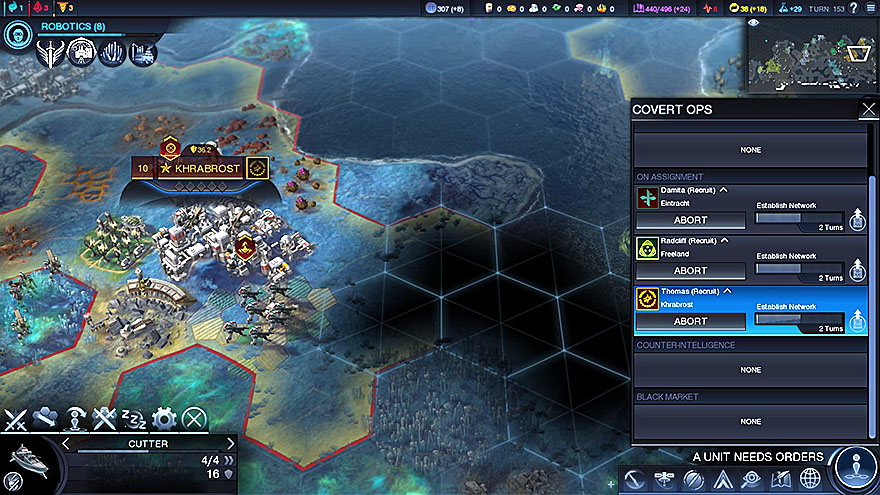 ARC would come to despise Thomas. The young man was only too happy to be Vadim Kozlov’s useful idiot. The Slavic Federation broadcasted ARC’s stolen health data and urged the people of Tau Ceti E not to buy its contaminated goods or eat its toxic food. Thomas became a small celebrity in the Slavic Federation, playing bit parts in films or public bulletins that needed someone to play the part of an ugly American. Tin’s other agents avoided the limelight, but each of them approached their marks like pilgrims fleeing. It was an easy sell: ARC’s colonies were just the latest in a long list of failed company towns. Central, Axiom and Vanguard were of a piece with Pullman or the Anton Menlo Project. Damita admitted to amused INTEGR scientists that ARC would not have survived its early years without discovering a capsule with an INTEGR-designed solar collector. Radcliff arrived, as did many others, to gawk at Polystralia’s Stellar Codex and to experience thriving culture on the frigid world. In the limelight or the shadows, ARC’s agents were immensely popular with their new hosts. They made friends in confidants. They learned everything. They told the Archangel everything. 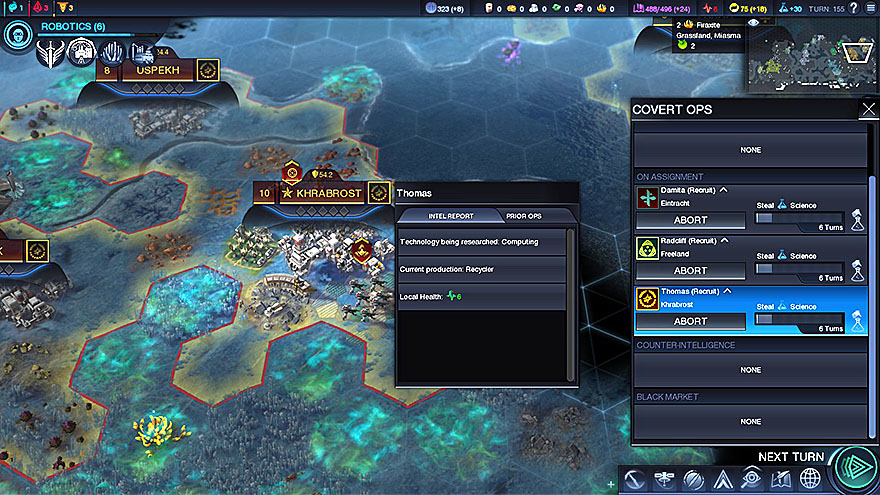 The Slavic Federation thrived because its research had taken a deep dive into genetics and xenobiology. Immunizations and widely-adopted gene therapy helped its second-generation residents to flourish on a new world. As a consequence, the Federation had to back-fill as they expanded - Kozlov’s engineers had yet to network its computers to an Old Earth standard. 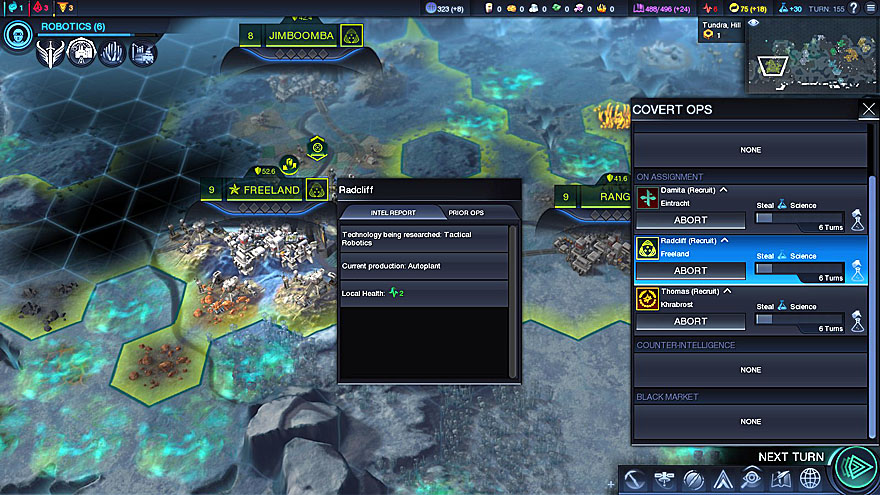 In Freeland, Radcliff discovered the Commonwealth of the Pacific’s “little helpers” - widespread, civilian adoption of robotics, semi-autonomous farming and mining equipment, and other machines that freed Polystralians to live in comfort. Hutama’s scientists had discovered a more efficient way to machine firaxite crystals. Radcliff befriended a researcher who insisted Polystralia was testing quantum computers and robotic defense systems. If you’re familiar with Civ 5 or Beyond Earth, take a close look at these screenshots. The Steal Science missions SHOULD cost north of 20 turns to complete. In Eintracht, Agent Damita searched for something else. Or someone. 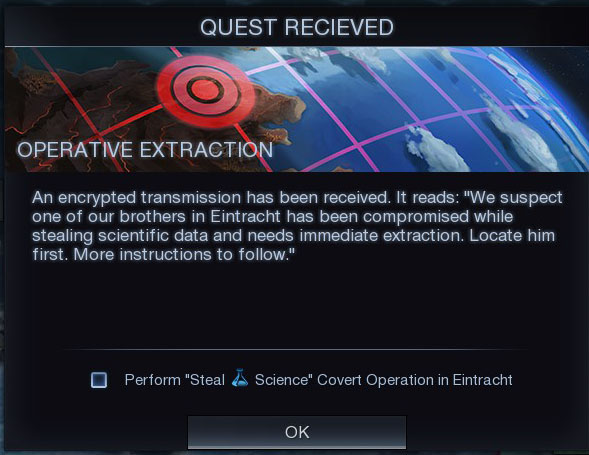 “What is the Culper Lodge?” Tin typed to CEO Fielding once. No response. “Can they be trusted?” he tried, much later. The answer came in the dead of night. “Conditionally. We’ll talk.” 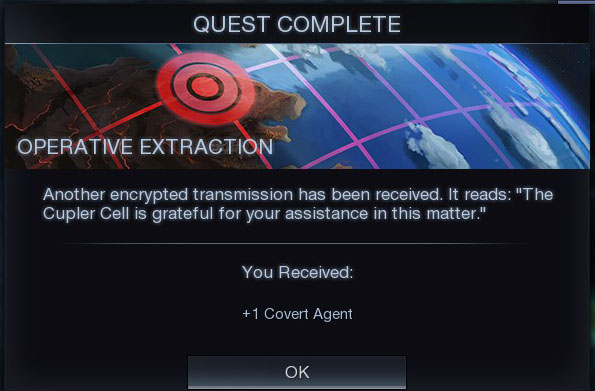 The Lodge has very real roots in American history, a spy ring created under orders from George Washington and named for Culpeper County in Virginia. They send you messages urging you to build a spy agency, and then to extract a foreign operative from a city. Success gives you an extra covert agent. In those heady, early days, stealing secrets was easy for the synesthetes. Radcliff caught low-hanging fruit at first, “sharing” the Polystralians’ advanced understanding of physics and robotics. Much of Tin’s work involved pulling stolen research from blind drops and rewording it in a way to make it seem like the ideas had come from within ARC. Axiom’s science teams, stymied for years, seemed to turn a corner. ARC’s administrative elite believed it was because Fielding had put the fear of God into Dr. Prickett. And if Axiom’s most famous scientist questioned the provenance of her teams’ breakthroughs, she kept her thoughts to herself. 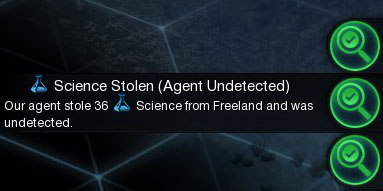 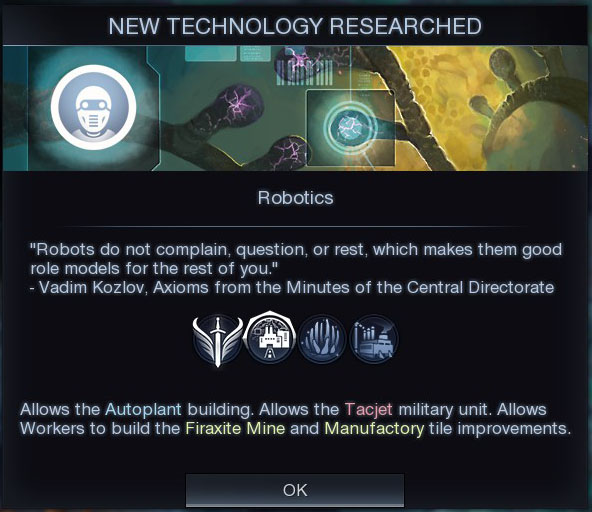 After our first Steal Science missions complete, our three agents come back with 36 science each. That comes out to about 18 science a turn, a 50 percent boost in our research capability. I could not conduct covert ops this fast without my insane espionage bonuses. Every successful mission increases a city’s intrigue level and unlocks more types of covert ops. My chicanery has only begun, as Damita shows here: 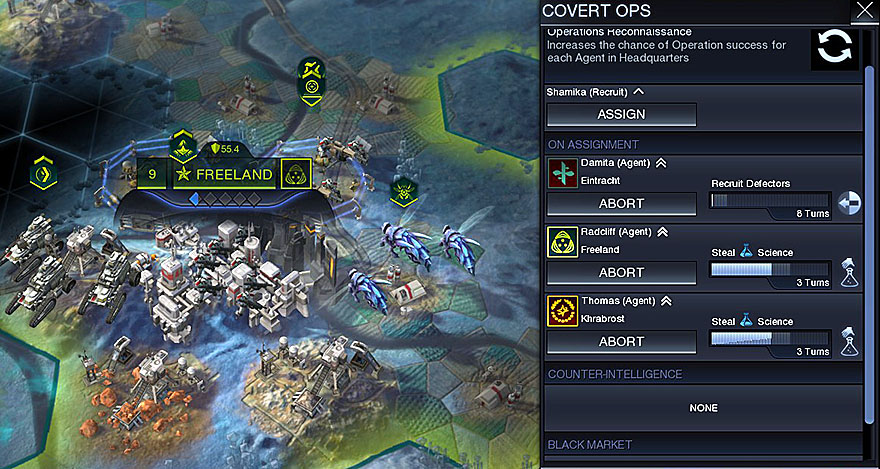 Tin stood up and stretched his legs in his cold, dark office. When he sat down, he saw a new message waiting at a blind drop. “They’re all right, you know. ARC is a mess. We could go anywhere else and thrive. Why are we doing this for Fielding?” Tin typed his response. “You are doing this for me. And no one in this whole world will ever understand you like I do.”
|
|
|
|

|
| # ¿ Apr 28, 2024 04:37 |
|
Glazius posted:Is there a Hunter-Killer Algorithm equivalent in this game, or some way to get your spies shut down? Though I imagine with your advantage that's prohibitively hard to do. Covert ops are not guaranteed successes - some of the more advanced ones carry a greater risk that you'll fail, get caught red-handed, or have an agent killed. (Your spy headquarters "grows" a new agent after a few turns if one is killed.) The quick and dirty way to counter spying is to station your own spies for counter-intelligence at cities with rising Intrigue. There are some other hard counters. The Human Hive wonder makes covert operations impossible in the host city, as society has turned into a groupthink, lockstep nightmare. The All-Seer satellite will boot spies out of a city and prevent it from increasing in Intrigue for as long as the satellite is in orbit. The Surveillance Web building will reduce the maximum intrigue level of a city by 2. Honestly? The higher-intrigue operations can be gimmicky. If you go hard into Harmony, you unlock the ability to attract a siege worm toward an enemy city... but by the time you get this ability, even basic military units can rip siege worms in half like phone books. Right now it's more valuable for me to mash Steal Science to try and catch up to Polystralia, or Recruit Defectors so I can save money on jump-starting new cities by buying new buildings outright. Espionage is a good way to slingshot to the head of the pack midgame. With ARC, it's less of a slingshot and more of a rail gun.
|
|
|





